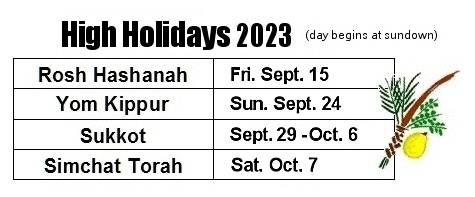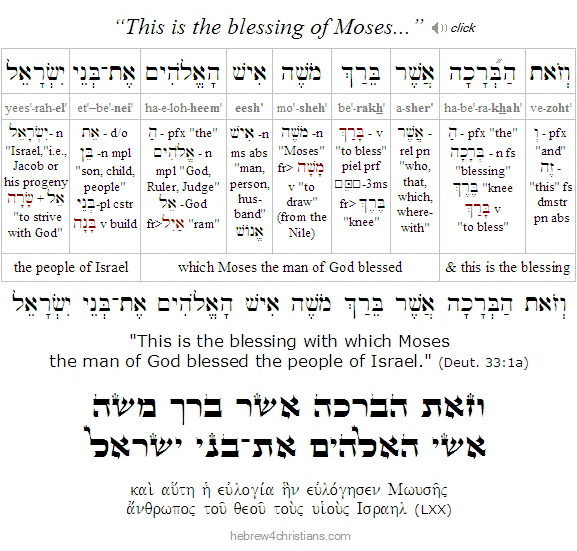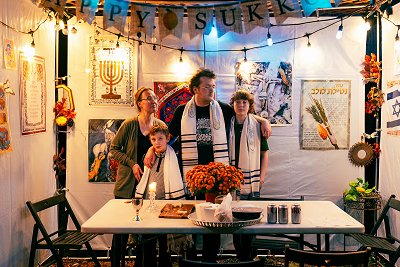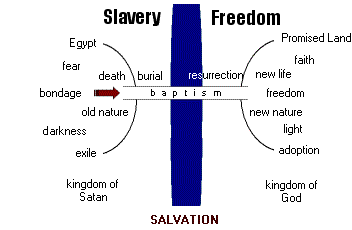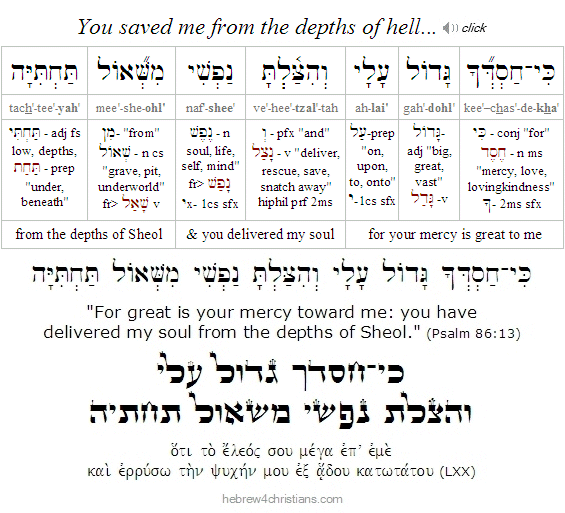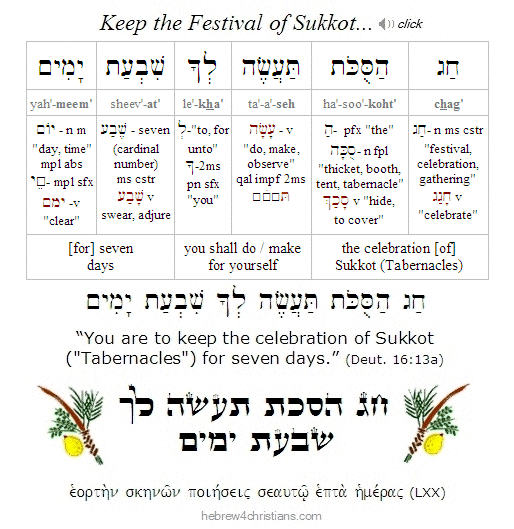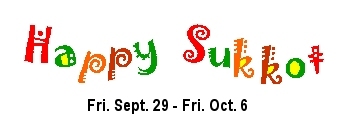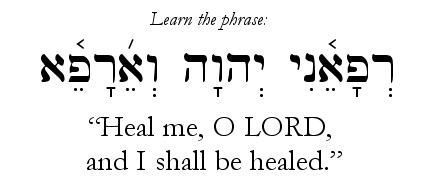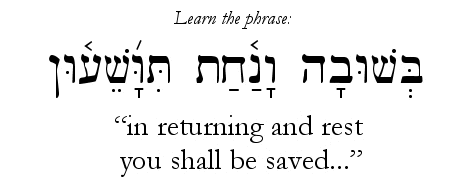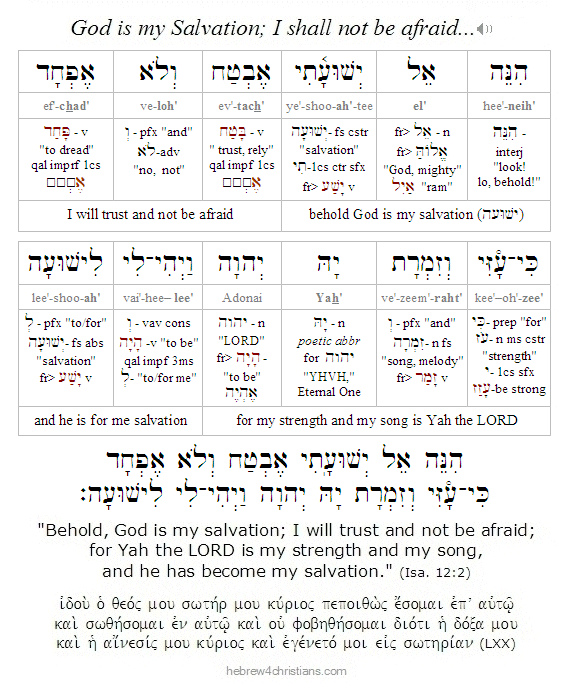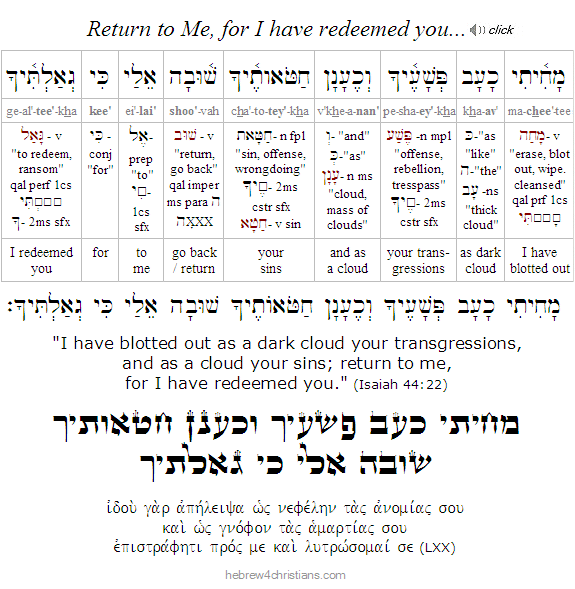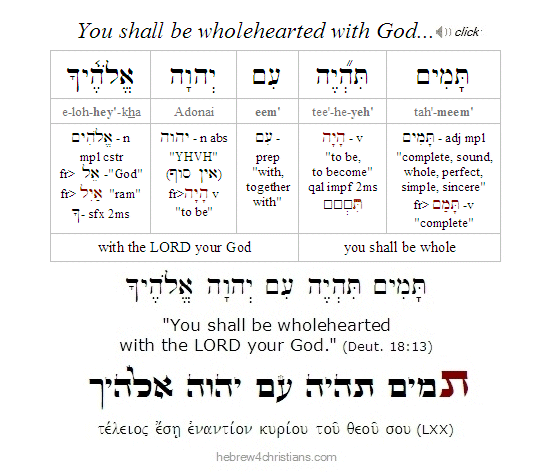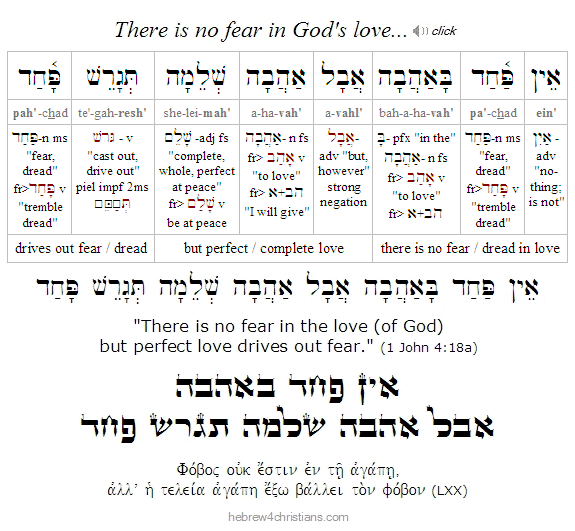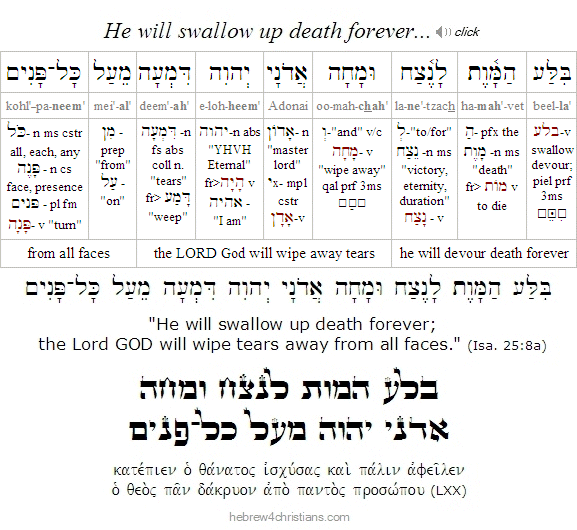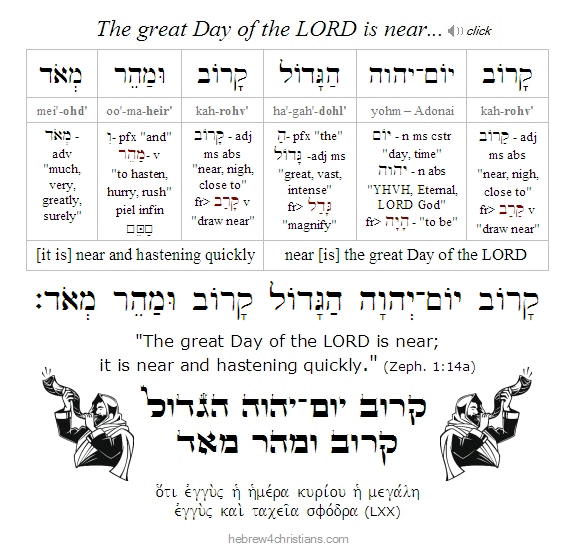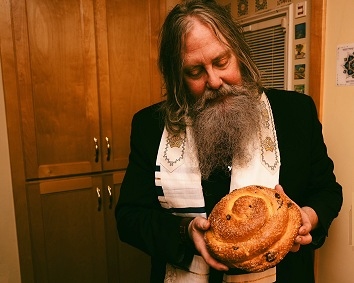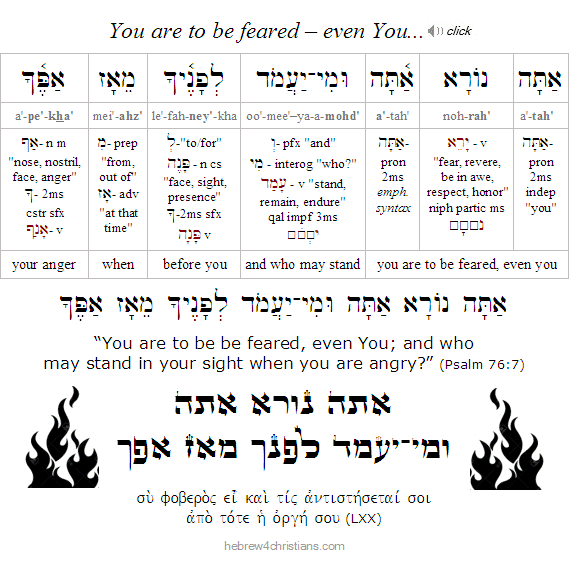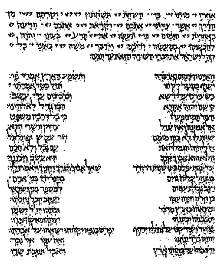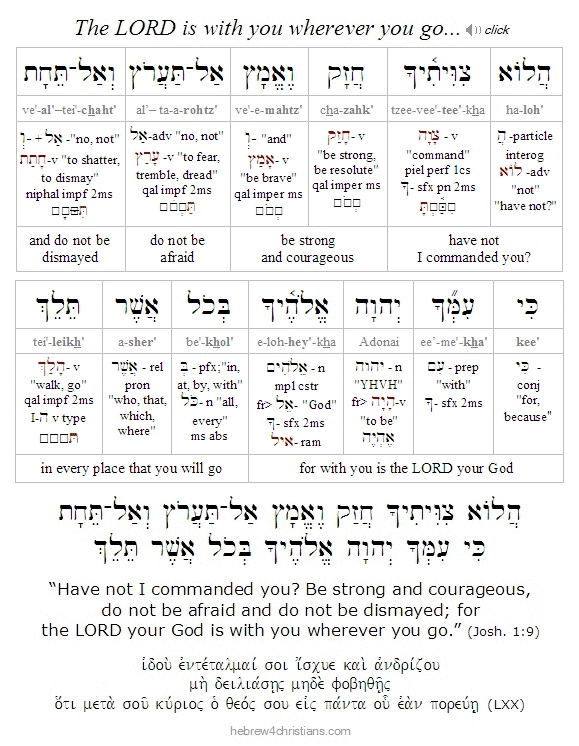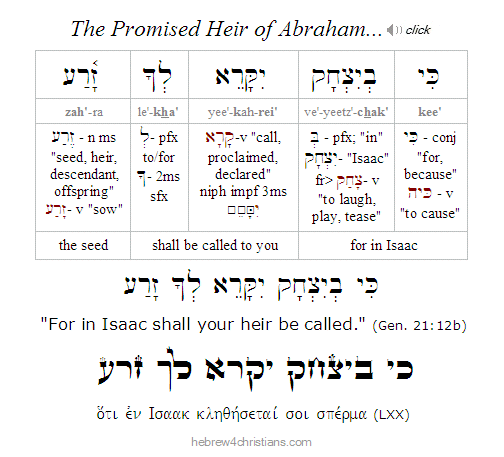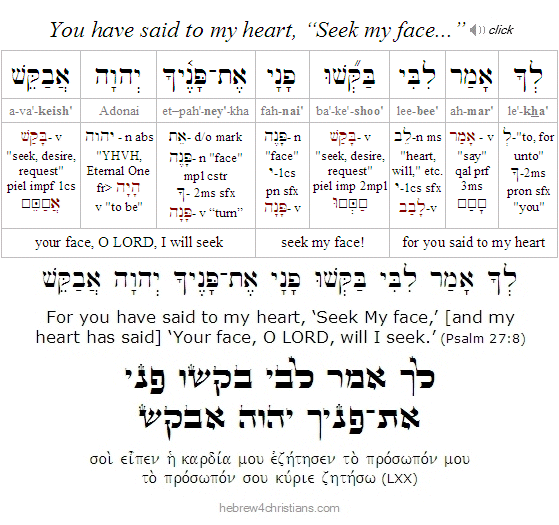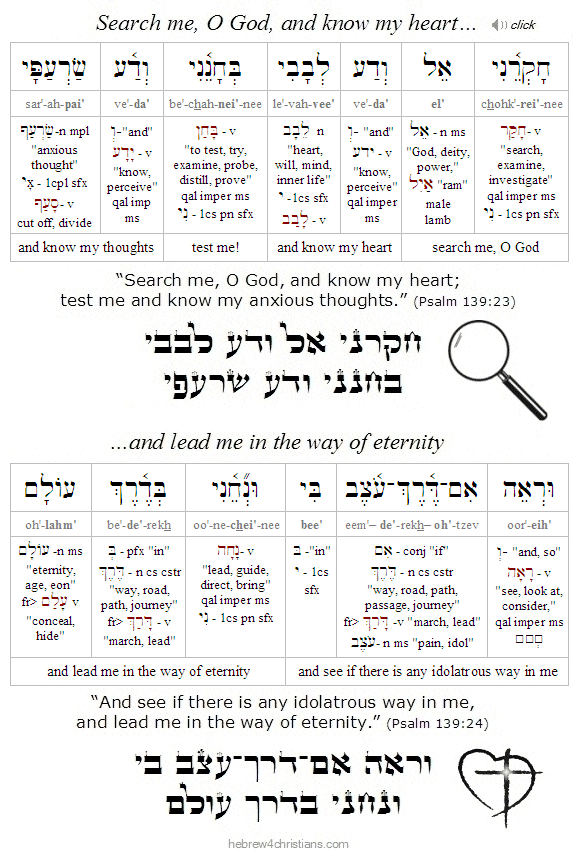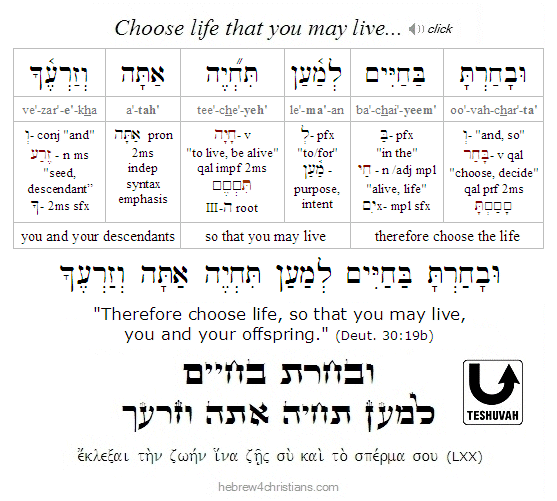|
Jewish Holiday Calendar
For September 2023 site updates, please scroll past this entry....
The Torah divides the calendar into two symmetrical halves: the Spring and the Fall, indicating the two advents of Messiah. The Biblical year officially begins during the month of the Passover from Egypt (called Rosh Chodashim, see Exod. 12:2), and the spring holidays of Passover, Unleavened Bread, and Firstfruits both recall our deliverance from Egypt and also our greater deliverance given by means of the death, burial, and resurrection of the Messiah, the great Passover Lamb of God. Yeshua was crucified on erev Pesach, buried during Unleavened Bread, and was resurrected on Yom Habikkurim (Firstfruits). The holiday of Shavuot (i.e., "Pentecost") both commemorates the revelation of the Torah at Sinai as well as the revelation of the Ruach HaKodesh (Holy Spirit) at Zion, in fulfillment of the promise given by our Lord....
The intermediate months of summer end with the advent of the sixth month of the calendar, called the month of Elul, which recalls the time Moses interceded on behalf of Israel after the sin of the Golden Calf. To commemorate this time of our history, we likewise focus on teshuvah (repentance) in anticipation of Rosh Hashanah and especially in anticipation of Yom Kippur, the great "Day of Atonement." In Jewish tradition the 30 days of Elul are combined with the first ten days of the seventh month (called the "Days of Awe") to set apart "Forty Days of Teshuvah" leading up to the Day of Forgiveness for Israel. Immediately following Yom Kippur, the mood changes as we begin preparing for a joyous week-long celebration called Sukkot (i.e., "Tabernacles") that concludes with the holiday of Simchat Torah.
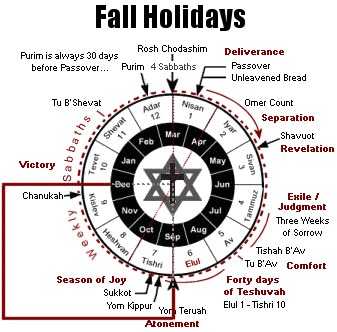 |
The Fall Holidays:

The fall festivals prophetically indicate the Day of the LORD, the second coming of Yeshua, the great national turning of the Jewish people, and the establishment of the reign of the Messiah upon the earth during the Millennial Kingdom in the world to come.
Note that in accordance with tradition, holiday dates begin at sundown. Moreover, some holidays may be postponed one day if they happen to fall on the weekly Sabbath:
1. Month of Elul (Wed. Aug. 16th [eve] - Fri. Sept. 15th [day])
2. Month of Tishri (Fri.. Sept. 15th [eve] - Sat. Oct. 14th [day])
3. Month of Cheshvan (Sat. Oct. 14th [eve] - Mon. Nov. 13th [day])
- Four Sabbaths: Noach, Lekh-Lekha, Vayera, Chayei Sarah
- Yom Ha'Aliyah - Honoring Israel's immigrants (Oct. 22nd; Cheshvan 7)
- Sigd - 50th day after Yom Kippur; Ethiopian Jewish holiday (Sun. Nov. 12th)
4. Month of Kislev (Mon. Nov. 13th [eve] - Tues. Dec. 12th [day])
- Four Sabbaths: Toldot, Vayetzei, Vayishlach, Vayeshev
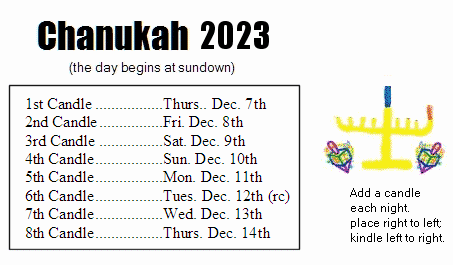
- Dates for Chanukah 2023 (5784):
- 1st Chanukah candle - Thurs. Dec. 7th [i.e., Kislev 25]
- 2nd Chanukah candle - Fri. Dec. 8th [i.e., Kislev 26]
- 3rd Chanukah candle: Sat. Dec. 9th [i.e., Kislev 27]
- 4th Chanukah candle: Sun. Dec. 10th [i.e., Kislev 28]
- 5th Chanukah candle: Mon. Dec. 11th [i.e., Kislev 29]
5. Month of Tevet (Tues. Dec. 12th [eve] - Wed. Jan. 10th [day])
- Four Sabbaths: Miketz, Vayigash, Vayechi, Shemot
- Dates for Chanukah (continued):
- 6th Chanukah candle: Teus. Dec. 12th [i.e., Kislev 30]
- 7th Chanukah candle: Wed. Dec. 13th [i.e., Tevet 1]
- 8th Chanukah candle: Thurs. Dec. 14th [Tevet 2] Zot Chanukah
- Winter Solstice: Wed. Dec. 21st (Tevet 9)
- Christmas - Mon. Dec. 25th (Tevet 13, 5784)
- Asarah B'Tevet - Thurs. Dec. 22nd (dawn), 2023; fast for Jerusalem
- Secular New Year: Mon. Jan. 1st, 2024 (Tevet 20, 5784)
 |
Note: For more about the dates of these holidays see the Calendar pages....
September 2023 Updates
Note: Please refresh the page (or press F5) to see the latest updates...
Sukkot Torah Readings...
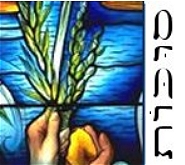
[ Chag Sukkot Sameach, chaverim! For some family Sukkot pictures click here. ]
09.30.23 (Tishri 15, 5784) The weekly Torah Reading Cycle is suspended for the holiday week of Sukkot (referred to as "Tabernacles" in the Christian tradition), as well as for Shemini Atzeret (sometimes referred to as the "eighth day" of Sukkot). The Torah readings for the holiday are from Leviticus 22-23, Numbers 29, and Deuteronomy 14-16. These readings review the holidays or "appointed times" on the Jewish calendar, including the commandments regarding the festival of Sukkot.
In addition to the various passages we read for each day of the holiday, we will read the Book of Ecclesiastes (i.e., Kohelet) for the Sabbath day of Sukkot. We will also read both the very last portion of the Torah (i.e., V'zot HaBerakhah: Deut. 33:1-34:12) as well as the very first chapter of the Torah (i.e., Gen. 1:1-2:3) for the holiday of "Simchat Torah" (which immediately follows Shemini Atzeret). The upshot is that during this season of the year we will read the end of the Torah scroll and then "rewind" it to the beginning...
Vzot HaBerakhah contains Moses' last words to the people before his death on Mount Nebo in the land of Moab. According to midrash, when God came and told Moses to get ready to depart from this world, he appealed to God saying, "Wait until I bless Israel. All my life they have had no pleasant experiences with me, for I constantly rebuked them and admonished them to fear God and fulfill the commandments. I do not wish to leave this world before I have blessed them" (Ginzberg: Legends of the Jews).
The Hebrew word bereshit (בְּרֵאשִׁית) can mean "in the beginning" or "at the start" or "at the head of (all things)," etc. (notice the term rosh (ראשׁ, "head") appears embedded in the word as its shoresh (root)). The first chapter of Bereshit gives the account of the creation of God, and its opening verse reveals the triune nature of God indicated by the use of the plural form of the name Elohim with the singular verb bara (he created) in relation to the work of the Spirt of God (ruach), and the omniscient Voice that narrates the creation account. Indeed, a direct quotation from Elohim uses grammatically plural personal pronouns: "Let us make man in our image and in our likeness" (Gen. 1:26).
Note: For detailed information about Sukkot Torah readings, see the weekly Torah page.
Click for more Sukkot photos
Sukkah of the Heart...

[ The holiday of Sukkot ("Tabernacles" or "Booths") begins this evening at sundown... ]
09.29.23 (Tishri 14, 5784) The word sukkot (סוכות) is the plural of the Hebrew word sukkah (סוכה), meaning a "booth" or "hut." In traditional Judaism, a sukkah is a temporary structure used for "living in" (i.e., primarily eating meals or entertaining guests) throughout the week-long holiday. The purpose of the sukkah is to remind us of how God tenderly cared for the Israelites as they made their trek through the dangers of the desert. God spoke endearingly to Israel: "Follow me into the wilderness, into an unsown land" (Jer. 2:2).
The Scriptures state, "The LORD upholds all who are falling and raises up all who are bowed down" (Psalm 145:14). It has been said that the word sukkah can be understood as an acronym formed from the words somekh Adonai (סוֹמֵךְ יְהוָה), "the LORD upholds," kol (כָּל), "all," and ha'nofelim (הַנּפְלִים), "the ones who fall." This suggests that those who make a sanctuary within their hearts, trusting in God's indwelling Presence, will be upheld and kept from falling (Jude 1:24). God knows many need this truth to be made real in this hour...
The Kotzer Rebbe said that the verse, "this is my God, and I will praise him, my father's God, and I will exalt him" (Exod. 15:2), may be understood as, "this is my God, and I will make a dwelling for Him within me." Though the LORD is forever enthroned in heaven as our Creator, King, and Deliverer, we still must make a dwelling within us. He stands at the door and knocks. "Where does God dwell," it is asked, "but where He is given a dwelling place, a sanctuary, a throne within the heart?"
Hebrew Lesson
Psalm 145:14 reading (click for audio):
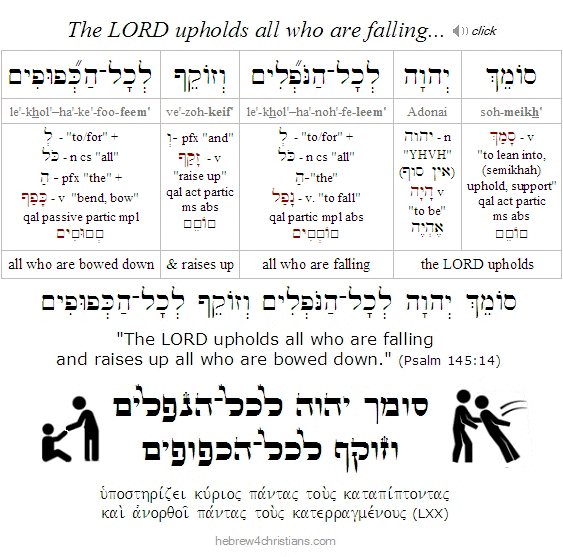 |
Personal note: Unfortunately everyone at my house is sick, so I barely was able to get the Sukkah up this year. It has not been decorated yet, either. It also stormed throughout the night and into the day today, so the yard is a bit swamped out! Shabbat Shalom v'yom tov.
Sukkot and Salvation...

09.29.23 (Tishri 14, 5784) The holiday of Sukkot remembers the journey of the redeemed people of God - first from Egypt, then to Sinai, and then into the void of the desert places.... The repeated failures of the Israelites in the wilderness was meant to reveal the insufficiency of "Egyptian thinking" by demonstrating God's faithful love and ongoing care. The entire ordeal in the desert was a "Sukkot experience" that pointed beyond Sinai....
Sukkot symbolizes the journey of faith by means of erecting a sukkah - a flimsy shelter that we are to "live in" for seven days. The sukkah is meant to help us ask ourselves: Where is the true home we seek? Where is the true shelter of our lives? The first Jew (Abram) was called ha-ivri (הָעִבְרִי) - "the Hebrew," a term that means "one who has crossed over" (עָבַר) from another place. When he heeded the call Lekh lekha (לך־לך), "go for yourself," it was Abram's walk of faith that made him into a Jew.... He left the comforts of Ur to become a tent dweller who became a "stranger and sojourner" with God. Similarly, the Jewish people as a whole were forced to leave the "security" of Egypt and journey into the unknown in order to realize the promises of God. Sukkot reminds us that our security is neither found in political power structures nor in the concrete walls of our homes, but solely in the Presence of God. Our freedom as God's children is at stake in the matter of redemption, and God takes it very seriously when we exchange a supposed source of security for the venture of true faith....
Hebrew Lesson
Jonah 1:9a Hebrew reading (click):
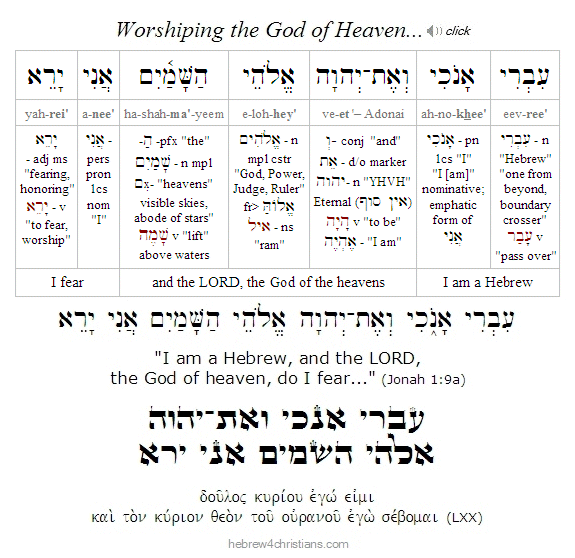 |
So where is the true home you seek? Are you clinging to hope in this world and its counterfeit security? Are you willing to sacrifice your dignity as a child of God for the protection of the "State"? When God redeemed Israel from Egypt, it was a rebirth experience. Passover represented the means of redemption (the blood of the lamb), Shavuot represented the revelation of the holiness of God (the Sinai experience), and Sukkot represented the walk of faith as reborn and redeemed children. God took Israel out of Egypt (i.e., out of the world) in order to reveal to them who He is -- and who they were in relationship with Him.... The pattern remains the same. The world system is a form of slavery, and Sukkot reveals how God bypasses the world to care for His people...
Chag Sukkot Sameach friends!
Substance of Hope...
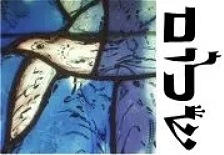
09.28.23 (Tishri 13, 5784) "Faith is the foundation (i.e., ὑπόστασις: the "substance," reality, underlying essence, etc.) of hope, the conviction of the unseen... Without faith it is impossible to please God, for whoever would draw near must believe that God exists and rewards (μισθαποδότης) those who seek him" (Heb. 11:1,6).
Note that God is pleased when we seek his presence, that is, when we when we look past the ephemera and ambiguity of the phenomenal world for the truth about spiritual reality (2 Cor. 4:18). For our part, faith resolves to confession (ὁμολογέω), that is, aligning our perspective and focus to agree with the revelation and message of divine truth and verbally declaring our conviction. We must say that we believe, and affirm it with all our heart (Rom. 10:9). As it says, "I will make Your faithfulness known with my mouth" (Psalm 89:1).
When you encounter tribulation, or experience some crisis of faith, reaffirm aloud: "I believe in God's promise..." Physically expressing your faith is itself an act of faith, and this encourages your soul to trust in God's healing reward even in the present struggle or darkness. "Seek the LORD and His strength; ask for His Presence at all times" (Psalm 105:4).
Hebrew Lesson
Psalm 105:4 Hebrew reading (click):
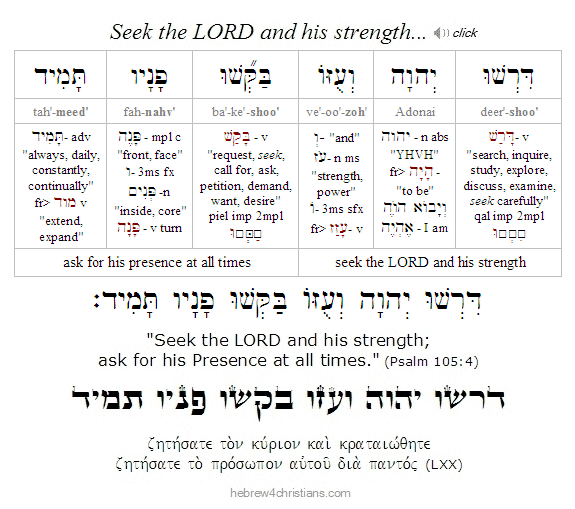 |
Narrow Gate of Despair...

09.27.23 (Tishri 12, 5784) There is a great danger today of fearing the wrong things, and despairing over that which trivial in light of eternity. However honest despair is a gift from God, if it is received as a message to take heed of what is most important. "And this is the simple truth - that to live is to feel oneself lost. He who accepts it has already begun to find himself, to be on firm ground. Instinctively, as do the shipwrecked, he will look around for something to which to cling, and that tragic, ruthless glance, absolutely sincere, because it is a question of his salvation, will cause him to bring order into the chaos of his life. These are the only genuine ideas; the ideas of the shipwrecked. All the rest is rhetoric, posturing, farce" (Kierkegaard). Like Jonah we first must be "swallowed up" in consciousness of our own hopelessness before we realize that we are without remedy apart from God's intervention and deliverance. We start there - in the "belly of the fish" - and later are brought forth by God's mercy and grace. This is the place of the cross, the "narrow gate" that leads to life. As we look to Yeshua, as we lean on him, he reveals more of himself to us.
Hebrew Lesson:
Psalm 86:13 Hebrew Reading (click):
Hillel the Elder had said, "If I am not for myself then who will be for me? (אם אין אני לי מי לי); But if I am only for myself, what am I? And if not now, when?" (Avot 1:14). Hillel points out here that the language of "I am" (אָנִי) and "for me" (לִי) reveals that we have a relationship with ourselves that must be sanctified and ordered before God. As Kierkegaard perceived, the self is "a relation which relates itself to its own self," that is, the self is always in a state of dialog. A healed self relates itself to God as the Ground of existence, since otherwise irremediable despair will result, eternal lostness within, and everlasting sickness of soul...
The remedy for being a lost self, relating only to itself without any center or ground, is to turn to God and to find your place in God's love and blessing. As we come to believe that we are accepted and loved despite our many imperfections, inadequacies, and character defects, we find courage to accept ourselves, to "let go" in trust. As Yeshua said, "whoever does not receive the kingdom of God like a child shall not enter it" (Luke 18:17).
 |
God's Sheltering Love...

[ The week-long holiday of Sukkot begins Friday, Sept. 29th at sundown this year... ]
09.27.23 (Tishri 12, 5784) The Torah describes Sukkot (i.e., "Tabernacles") as a holiday of joy and gladness: "You are to rejoice in your festival (וְשָׂמַחְתָּ בְּחַגֶּךָ).... for seven days you shall keep the festival (שִׁבְעַת יָמִים תָּחֹג)... so that you will be altogether joyful" (Deut. 16:14-15). Nevertheless we may wonder how we can celebrate in a world filled with suffering, death, political tyranny, and misery? Since God commands us to be joyful, however, we must understand this joy to be something more than temporal elation or fleeting pleasure, but rather as the result of the decision to believe in healing despite the appearances of this realm. It is a joy and peace that "passes all understanding..." (Phil. 4:7).
"The world to come, the perfect world, we at least believe in; but this material world, this one here and now, how can anyone believe in it? The only thing to do is to run to the refuge of God" (Rebbe Nachman). The joy of the season of Sukkot, then, is the joy of hope, the conviction that "all shall be well, and all manner of thing shall be well" (Julian of Norwich). Darkness will be overcome by the light; evil will become undone; all that is untrue shall be made true; and every tear shall be wiped away... The sukkah symbolizes the "Clouds of Glory" that surround our way in the desert – the "Divine Presence" beheld in faith. We find joy as we choose to believe in the deeper reality of God's sheltering love. Amen.
Hebrew Lesson
Song of Songs 2:4 reading (click):
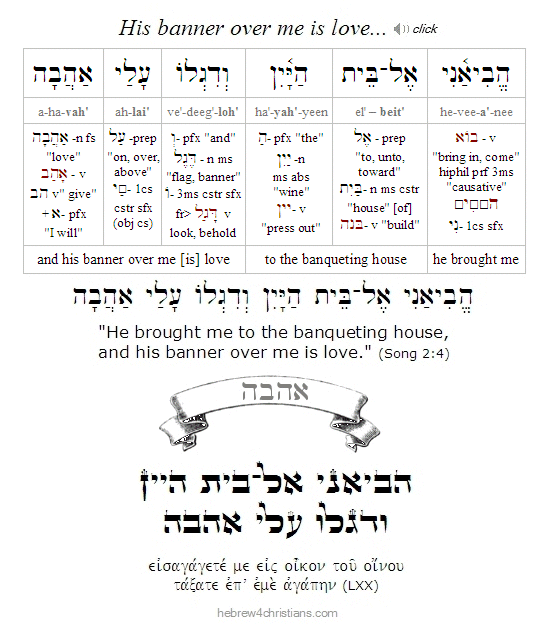 |
Torah states: "You shall dwell in sukkot (booths) for seven days. All native Israelites shall dwell in booths, that your generations may know that I made the people of Israel dwell in booths when I brought them out of the land of Egypt: I am the LORD your God" (Lev. 23:42-43). The sages say that the booths commemorate the Clouds of Glory (עַנְנֵי תְּהִילָה), seven clouds that encompassed and protected the people during their sojourn in the desert (Sukka 11b). We recall the Clouds of God's glory as the gift of his sustaining love and care during our journey to freedom. Indeed the clouds represent the holy Shekhinah (שְׁכִינָה), the ruach Hakodesh and indwelling presence of God that protects us and gives us comfort. Just as the ruach fell on the generation of Moses' advent, so with the generation of Messiah: the Spirit brings strength to heart, protection from evil, and guidance for our way (John 14:26).
All of Torah is grounded in emunah (faith), as the very First Commandment of Torah is to trust that the LORD is God for you (אָנכִי יְהוָה אֱלהֶיךָ). Moreover Scripture also says: "All your commandments are emunah" (כָּל־מִצְוֹתֶיךָ אֱמוּנָה); and, "you are near, O LORD, and all your commandments are faithul" (Psalm 119:86; 151). Indeed faith is the "substance" (i.e., ὑπόστασις, reality, essence) of hope, the conviction of the unseen good (Heb. 11:1); and without emunah it is impossible to please God (Heb. 11:6). We celebrate Sukkot because God calls us to know our heritage and to believe in the light of His surrounding Presence.
 |
Healing the Divided Self...

09.27.23 (Tishri 12, 5784) There's an old story of the ancient philosopher Thales of Miletus who fell into a well while he was contemplating the heavenly bodies. All his grand intellectual aspirations resulted in a pratfall of humility. Kierkegaard likewise tells the tale of notable professor who, in the pontification of grand ideas of the cosmos, was oblivious to a drop of sweat that dangled from his nose. And there have been times in my life when I have meticulously studied Scripture and was so engrossed in theological matters that I somehow forgot that God was really present! In such moments, if I were suddenly interrupted, I would likely fall into a moment of peevishness and irritation. It would be comical if it weren't so sad and disappointing, and yet there is a message in the pain that should not be missed....
What do we do with our inconsistencies, those "lapses" of faith that expose what we are actually believing at the time? These are gaps or incongruities between what we might say is true and what our behavior otherwise reveals. For instance, we may say that we trust God with our lives, and aver that we believe that the Almighty works all things "together for our good," but inwardly we are filled with impatience, anxiety, and even dread. We are vaguely conscious of our dissimulation at times; we feel the tension that something is not right about us; we sense that we are not who we want to think we are. We may even suspect that we are inwardly divided, unstable, and afraid of what is hidden within our deepest hearts. But we tolerate our pretenses. We may ask ourselves "what would Jesus do?" and then find reasons to excuse ourselves; we may affirm: "When I am weak, then I am strong," and then "think twice" in fear over circumstances that we do not understand...
So how do we deal with this contradiction between what we are and what we ought to be? How do we reconcile what "is" with what "ought" to be? In other words, how do we "practice what we preach?" We all experience the "gap" between the real and the ideal not only in the social and political world around us, but also - and more profoundly - as duplicity within our own hearts. Alas, how can we no longer be "two-souled' or double minded? How can we be set free from the influence of the "shadow self"?
These are not questions about theology or doctrine, but about emotional and spiritual maturity, that is, they are matters of personal character. When Yeshua said that the truth would set you free, he didn't mean that you would find freedom by studying theology as much as by undergoing transformation of the heart. Theology is important, of course, but primarily as a means to the greater end of knowing God "bekhol levavkah," with all your heart, "bekhol nafshekha," with all your soul, and "bekhol me'odekha," with all your might. The essential reason for learning about God is be in heartfelt relationship with him, after all, and that will lead to transformation of the way we live - that is, how we think, talk, and make decisions. Spiritual truth is "existential." How we live life reveals what we truly believe.
When we are born from above, we are given a new nature, and the "seed" of eternal life is implanted within the soul. Heart transformation, however, comes through time, as a matter of undergoing "reproof" and "correction." This is sometimes called the process of "sanctification," which means walking uprightly in the way of holiness. The Lord is likened to a potter and we are as clay in his hand (Isa. 64:8). As I mentioned the other day, life on the "potter's wheel" can be messy, unsettling, and sometimes excruciatingly hard, but it is God's sovereign work to form your life according to his design and purposes....
God gives us the Scriptures to help us know his heart, as it is written: "All Scripture is inspired by God and profitable for doctrine, for reproof, for correction, and for training in righteousness" (2 Tim. 3:16). Here we note that the Hebrew word for "reproof" is tochechah (תּוֹכֵחָה), from a root (יכח) that means to test or judge the quality of something. God's reproof reveals the gap between our behavior and his standard of moral and spiritual truth, and when we are reproved by God, we understand how we fall short of his will. The Hebrew word for "correction" is mussar (מוּסָר), from a root (יָסַר) that means to chasten or punish, though always with the aim of developing godly character. God will sometimes allow us to undergo affliction, for instance, to teach us patience or humility. "Training in righteousness" means being instructed, as a child, in what is upright, true, and honorable.
Narrowing the gap between what we say that we believe and how we actually live is an ongoing process for us in this life. The world, the flesh, and the devil are forces that weigh us down to keep us profane and fallen, but God provides his Spirit and he instructs us to walk in the victory of faith. If we ignore or rationalize the gap, however, that is, if we allow the inner conflict and dissonance to become deeply rooted within our souls, we run the risk of becoming either self-deceived or embittered over the struggle. Bitterness is especially dangerous because it can result in abandoning the life of faith altogether (Heb. 12:15).
The test of faith is a matter of the heart more than the head. Things such as fear, pride, or ungodly desire can overrule our profession of faith, and we "forget" our calling before the Lord. The battle is found within the heart. Courage and moral allegiance is more powerful than intellectual conviction regarding matters of temptation.
The inner conflicts are real. The battle is for our souls. Many of us have truly felt or experienced the glories of God's love, and we want to believe and to walk in the light of that love... So we try various things to know God or recapture our hope. We study, read, think hard, pray, attend services, and so on. But as we try again to be spiritual or religious or self-assured, we may become bound, weary, and feel like a failure... We suspect that we have failed God, failed ourselves, and failed others. We go dark, ashamed, and anxious, but we try yet again, and again, until we are distraught and in agony of heart.
Yet this cycle or undulation is part of the test of faith, this agony of trying and failing, encountering our shadowy duplicity of heart, descrying yet again what we really are on the inside, and crying out for deliverance from our faithlessness, our hypocrisy, our fecklessness, and our despair... Paradoxically, because we cannot help ourselves, we continue trying, lamenting, confessing, and persevering - despite ourselves - and in the lament of the struggle to be who God says we are, we begin to surrender to a deeper heart or way of being - broken, humbled, brought face to face with our powerlessness and need - and it is then that we discover the healing hand of God is at work...
"You do not know what spirit you are of..." (Luke 9:55). Yeshua's words imply that each of us has the responsibility to know ourselves (γνῶθι σεαυτόν), and to learn to endure (and overcome) the natural motives and focus of our hearts. We collide with the truth of our spiritual condition in the midst of our daily frustrations, as we experience conflict, opposition, and the inner groan that arises from pressures and disappointments. Spiritual growth means learning to transcend our negative reactions, to stop cursing our conflicts, and to awaken to the blessings that surround and pervade our way. It requires a miracle.
If we are able to find the courage, our failures and brokenness may be used by God to purify the intentions of the heart by helping us to be more honest with ourselves. We begin to realize that we are more vulnerable than at first we thought; that our faith is not as strong as we imagined, and that our motives are often mixed and unconscious. Illusions are striped away; idols crumble; deeper levels of selfishness are uncovered; and the gap between our words and our deeds is exposed yet again... It is one thing, after all, to intellectually think about faith or to idealize spirituality, but it is quite another to walk out faith in darkness. Yet it is only there, in the rawness of heart, that we discover what we really believe and how our faith makes traction with reality...
There is a "hidden blessing" (ברכת סוד) that comes from our troubles. When we learn to accept that we are accepted despite ourselves, we find God's Presence and can breathe in his peace and love, despite the sorrows and grief of our lives. When we come to the light, and do not deny the truth about our condition, we can honestly ask the Lord for healing (Heb. 4:16). When we seek for the good - and even bless the struggle - we express our trust that God is using our trials to help us grow and to bring beauty from our ashes (2 Cor. 7:10). "O Lord, I need you for everything, every last thing. Please meet my great need for You, for without you I am nothing." Amen, "turn us back to you, O LORD, so shall we be turned..." (Lam. 5:21).
Contrary to the assumption that the life of faith should always be triumphant, we all inevitably will experience various setbacks, pratfalls, troubles and challenges in our lives. This does not mean that God does not care for us however, because on the contrary, this is by his design; a plan supervised by God's love and blessing, and the afflictions we therefore encounter are part of his work for our good (Rom. 8:28; Heb. 12:6). We descend in order to ascend. It make seem counterintuitive, but the heart of faith gives thanks for all things - the good as well as the evil (see Job 2:10). We affirm: "This too is for the good," yea, even in the midst of our struggle, no, even more -- precisely in the midst of our struggle -- for this, too, is for our good. Faith is the resolution to trust in the reality of God's goodness even during hard times when we feel abandoned or lost (see Isa. 50:10). The Lord uses the "troubles of love" (יִסּוּרֵי אַהֲבָה) for our good - to wake us up and cling to him all the more, since this is what is most essential, after all...
God forbid we should give up now, friends. Faith "sees the unseen" and believes that the day of our ultimate healing draws near. You are in good hands as the Lord forms your soul for the glory of his purposes... Stay strong and keep your hope alive. !מחיל אל חיל
Hebrew Lesson
Psalm 86:11 reading (click for audio):
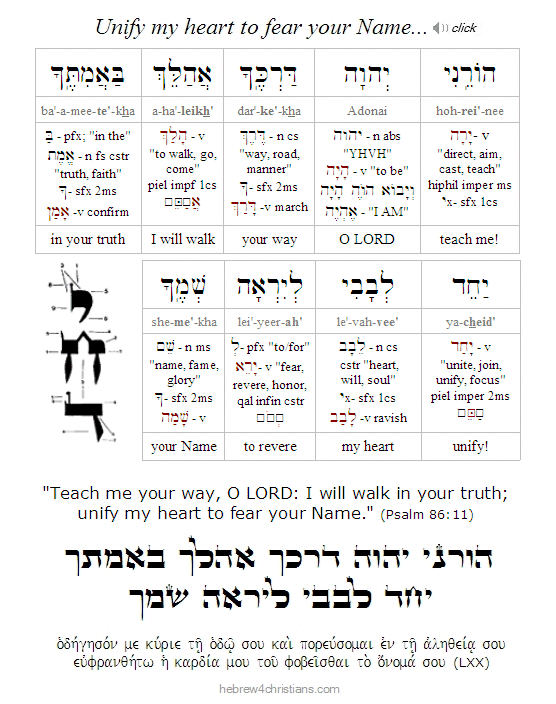 |
Why Sukkot Matters...
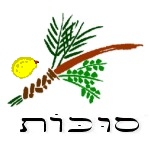
09.26.23 (Tishri 11, 5784) We learn about God through the witness of His Spirit as preserved in the Holy Scriptures; however, to properly interpret the Scriptures we must read in context, and therefore we must endeavor to understand the New Testament in light of the Torah, not the other way around... Without the background of the Torah and the history of the Jewish people, the meaning and terms of the New Testament will be obscure and subject to misunderstanding (see John 4:22; Rom. 9:4).
It is written in our Scriptures: "Yeshua the Messiah became a servant to the circumcised to show God's truthfulness, in order to confirm the promises given to the fathers" (Rom. 15:8). He came from heaven, "tabernacling with us," as Israel's promised Redeemer and the manifest revelation of God (John 1:14; 1 Tim. 3:16), his mother Miriam (Mary) being miraculously conceived by the power of the Holy Spirit, Yeshua was he was born the "King of the Jews" in Bet-Lechem (Bethlehem), "born under the law" as the "Second Adam" (or "Son of Man"); and was circumcised according to the Torah on the eighth day, being given the Hebrew name "Yeshua," God's Salvation.
Yeshua grew up as a faithful Jew, fluent in Torah reading and study (Luke 4:16-21; John 4:22). He observed all the Torah holidays as prescribed by the law of Moses (Lev 23). When he began his public ministry, he was baptized to identify himself as "the on of Man" (בֶּן־הָאָדָם), calling out to the lost sheep of the house of Israel to repent and believe the message of God's redemption revealed in him (Matt. 15:24).
Yeshua repeatedly taught that the Scriptures foretold of his coming and born witness of Him (John 5:39). He foretold his sacrificial death for our sins and his resurrection from the dead (Mark 10:32-34). After his crucifixion and resurrection, he told his disciples that he is the central meaning of all the Jewish Scriptures: "And beginning with Moses and all the Prophets, he interpreted to them in all the Scriptures the things concerning himself" (Luke 24:27; John 5:39; 8:58). He then instructed his followers to go to Jerusalem to receive the Holy Spirit on the very day of Shavuot ("Pentecost"), in fulfillment of the Scriptures. Later, when he miraculously called out to the Apostle Paul to follow him, Yeshua identified himself as the Jewish Messiah by using the Hebrew (not Aramaic) language (Acts 26:14).
We study Torah to know Yeshua, the "Living Torah" better, as he said: "Therefore every scribe who has been trained for the kingdom of heaven is like a master of a house, who brings out of his treasure what is new and what is old" (Matt. 13:52). Our Lord observed Sukkot (and all the holidays of Torah), and he wanted his followers to understand why he did so (Luke 24:27; Luke 24:44; John 1:45; John 5:46; Gal. 4:4-5; etc.). After all, Yeshua taught his followers to understand his ministry, but to do so, we must understand its context in Jewish history and tradition. "Every jot and tittle" of the Torah (i.e., kotzo shel yod ha'Torah: קוֹצוֹ שׁל יוד התּוֹרה) has its voice and its place in his mission (see Matt. 5:17-18). Sukkot, or "Tabernacles" is part of our heritage as those who trust in the LORD God of Israel and his salvation given in Yeshua. Amen.
Hebrew Lesson
Psalm 119:97 reading (click for audio):
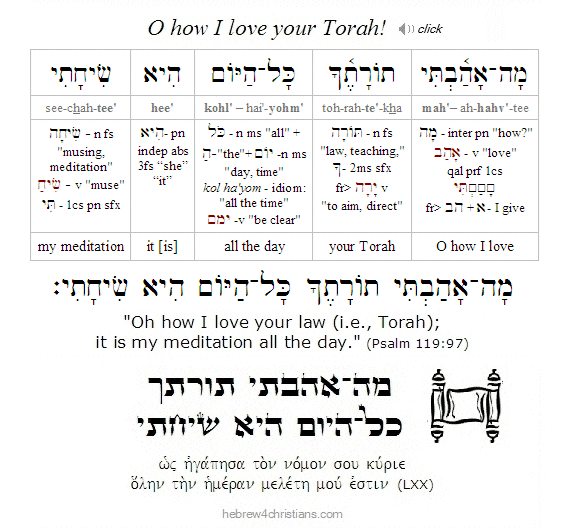 |
Getting Ready for Sukkot...

[ The week-long holiday of Sukkot begins Friday, Sept. 29th at sundown this year... ]
09.26.23 (Tishri 11, 5784) On the Torah's calendar, there is a quick transition from the somber themes of the Jewish High Holidays (Rosh Hashanah through Yom Kippur) to the week-long celebration of Sukkot (called "Tabernacles" in the Christian tradition). If the High Holidays focus on the LORD as our Creator, our Judge, and the One who atones for our sins, then Sukkot is the time when we joyously celebrate all that He has done for us. Prophetically understood, the seven days of Sukkot picture olam haba, the world to come, and the Millennial Kingdom reign of Mashiach ben David. If Yeshua was born during Sukkot (i.e., conceived during Chanukah, the festival of lights), then another meaning of the "word became flesh and 'tabernacled with us" (John 1:14) extends to the coming kingdom age, when He will again "sukkah" with his people during the time of his reign from Zion.
Since it represents the time of ingathering of the harvest, Sukkot prophetically prefigures the joyous redemption and gathering of the Jewish people during the days of the Messiah's reign on earth (Isa. 27:12-13; Jer. 23:7-8). Indeed all of the nations that survived the Great Tribulation will come together to worship the LORD in Jerusalem during the Feast of Sukkot (Zech. 14:16-17). The holiday season therefore provides a vision of the coming Kingdom of God upon the earth, when the Word will again "tabernacle with us."
 |
This year Sukkot begins just after sundown on Friday, Sept. 29th (i.e., Tishri 15 on the Jewish calendar). The festival is celebrated for seven days (i.e., from Tishri 15-21) during which we "dwell" in a sukkah -- a tent or "booth" of temporary construction, with a roof covering (schach) of raw vegetable matter (i.e., branches, bamboo, etc.). The sukkah represents our dependence upon God's shelter for our protection and divine providence. We eat our meals in the sukkah and recite a special blessing (leshev Ba-Sukkah) at this time.
The Lulav Bouquet...
In addition to the Sukkah (tent), the most prominent symbol of Sukkot is the Arba'at Ha-minim (אַרְבַּעַת הַמִּינִים) - "the Four Species," or four kinds of plants explicitly mentioned in the Torah regarding the festival of Sukkot: "On the first day you shall take: 1) the product of goodly trees (etrog), 2) branches of palm trees (lulav), 3) boughs of leafy trees (hadas), and 4) willows of the brook (aravot), and you shall rejoice before the LORD your God for seven days" (Lev. 23:40). We wave the "four species" (held together as a bouquet with the etrog) and recite a blessing (netilat lulav) to ask God for a fruitful and blessed year.
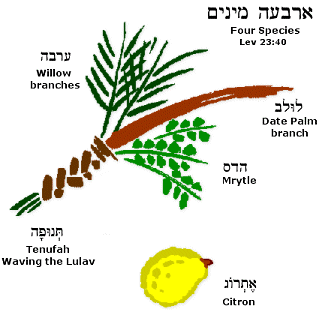 |
Sukkot marks the conclusion of the Jewish Fall Holidays and is the last of the three Shelosh Regalim (שלוש רגלים, i.e., the three annual pilgrimage festivals: Pesach (Passover), Shavuot (Pentecost), and Sukkot (Tabernacles) (Deut. 16:16). It can be argued that Sukkot is the climax of all the festivals in Scripture: Everything leads to it as a culmination in God's prophetic plan. It is interesting to compare the use of words relating to simchah [joy] in the description of these three festivals. Regarding Pesach, the word simchah does not appear at all (Deut. 17:1-8); regarding Shavuot, it appears only once (Deut. 17:11); but, regarding Sukkot, simchah appears several times. For instance:
You shall keep the Feast of Sukkot seven days, when you have gathered in the produce... You shall rejoice in your feast (וְשָׂמַחְתָּ בְּחַגֶּךָ אַתָּה)... because the LORD your God will bless you in all your produce and in all the work of your hands, so that you will be altogether joyful. (Deut. 16:13-15)
Sukkot is called "z'man simchateinu," the "season of our joy." Indeed, in ancient Israel, the joy of Sukkot was so renowned that it came to be called simply "the Feast" (1 Kings 12:32). Sukkot was a time when sacrifices were offered for the healing of the nations (Num. 29:12-40), and it was also a time when (on Sabbatical years) the Torah would be read publicly to all the people (Deut. 31:10-13).
From a spiritual perspective, Sukkot corresponds to the joy of knowing your sins were forgiven (during Yom Kippur) and also recalls God's miraculous provision and care after the deliverance from bondage in Egypt (Lev. 23:43). Prophetically, Sukkot anticipates the coming kingdom of the Messiah Yeshua wherein all the nations shall come up to Jerusalem to worship the LORD during the festival (see Zech. 14:16). Today Sukkot is a time to remember God's Sheltering Presence and Provision for us for the start of the New Year.
Hebrew Lesson
Deut. 16:13 Hebrew reading (click):
The Way of our Healing...
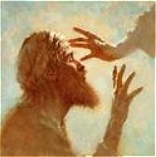
09.26.23 (Tishri 11, 5784) Yom Kippur is now over, but the call to do teshuvah (or repentance) is an ongoing disposition of life in our Messiah, since it rightly relates us to God. Indeed, teshuvah is the way of our healing (דֶּרֶךְ הָרִפּוּי שֶׁלָּנוּ). First we encounter our incurable sickness - the inner contradiction and bondage of soul that both loves and hates sin - and then we seek God's saving power in Yeshua. As the Apostle Paul asked: "Who can save me from the misery of myself? – and answered: God alone, through Jesus (Rom. 7:18-25). This is the first step, to know the "miserable creature that I am," that is, the slavery of your will to sin, and the second is to be willing to give this sickness of your soul to God's care in Yeshua. As he said, "Those who are well have no need of a doctor, but those who are sick. I have not come to call the 'righteous,' but sinners to repentance" (Luke 5:31-32). Yeshua regarded forgiveness of your sins as essential to finding inner healing, even more important than health, prosperity, or religious observance.
But teshuvah is also an ongoing process of sanctification, as the Spirit of God reveals our need for to develop spiritual maturity. We discover "hidden faults," we discern our tendency to self-deception, or to vanity, fearful thinking, or any number of other character defects. We learn that regularly confessing our sins is the way of attaining peace and growth.
Above all, however, repentance means returning to love, finding your heart's desire in God... As Yeshua said, "Repent, for you have lost your first love..." (Rev. 2:4-5). Our Lord appeals to you like an ardent lover standing outside in the cold, calling out your name, and knocking for you to open the door to let him inside (Rev. 3:19-20). Open the door of your heart! Return to him now! "Lord, help me turn to receive your love..."
Hebrew Lesson
Hosea 6:1 Hebrew reading (click):
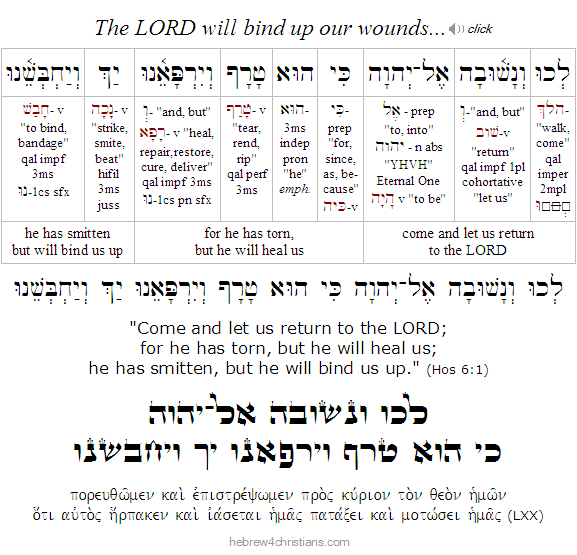 |
The Book of Life...
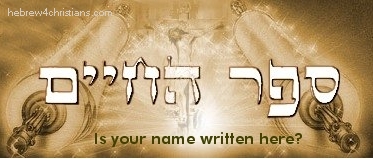
09.25.23 (Tishri 10, 5784) The Scriptures teach that every word we speak and every choice we make are infallibly recorded in "heavenly scrolls," and one day these scrolls will be opened as a testimony about what we did with our lives (Dan. 7:10; Matt. 12:36-37; 1 Cor. 3:13, 4:5). There is a day of reckoning in store for every soul whom God has given life in this world: "And I saw the dead, both the great and the small, standing before the throne, and books were opened. Then another book was opened, which is the Book of Life (סֵפֶר הַחַיִּים). And the dead were judged by what was written in the books, according to what they had done" (Rev. 20:12). The truth about our lives will be an "open book" on that day, and every word and deed will be accounted for before the LORD, our Creator, our King, and our Righteous Judge... Nothing will be hidden on that great day: "Each one's work will become manifest, for the Day will disclose it, because it will be revealed by fire, and the fire will test what sort of work each one has done. At that time the LORD "will bring to light the things now hidden in darkness and will disclose the purposes of the heart."
In this vision of the great day of judgment to come, notice that there was "another book" opened during the judgment called the "Book of Life," and later we learn that only those whose names were found written in this book would be granted access to the glories of the heavenly Jerusalem (Rev. 21:27). But what is this book and how can our names be inscribed in it so that we can partake of the future glory?
The Lamb's Book of Life (סֵפֶר הַחַיִּים אֲשֶׁר לַשֶּׂה) refers to "the record" (i.e., the words and deeds) of Yeshua our Messiah, the true Lamb of God, and therefore the book represents the final attestation - or "sworn testimony" - of the worthiness of God's own righteousness and salvation. In the great plan of God's salvation for the world, Yeshua was "born to die" as our atoning sacrifice for sin (Heb. 10:7-5). "God made the one who did not know sin to be sin for us, so that in him (ἐν αὐτῷ) we would become the righteousness of God" (2 Cor. 5:21). But note that we must be "in him," that is, fully identified with Yeshua so that his sacrifical death becomes counted as our own... Our identification in him means that our sin is "imputed" to his suffering and death upon the cross, just as his righteousness is "imputed" to us through the vindication of his resurrection. This is the essence of the "korban principle" of "life-for-life" - the innocent sacrificed for the guilty - that was the foundation of the sacrificial system of the Temple. By faith, the substitutionary death of Yeshua is "for you."
When your name is written in the Lamb's Book of Life, the record of your life is incorporated or made a part of the "story" of salvation given in Yeshua. Your identification with Him means that that the righteousness of God has been extended to you - and that the saving acts of Yeshua were performed to personally ransom you from the judgment of death. "And you, who were dead in your trespasses and the uncircumcision of your flesh, God made alive together with him, having forgiven us all our trespasses, by canceling the record of debt that stood against us with its legal demands. This he set aside, nailing it to the cross (Col. 2:13-14). The book of your old, sinful life that contains the record of all your sins, iniquities, and transgressions has been "rewritten" in terms of the salvation given to you in Yeshua. Being written in the Lamb's Book of Life therefore means that you share in the record of the righteousness of Messiah based on your trust in God's salvation.
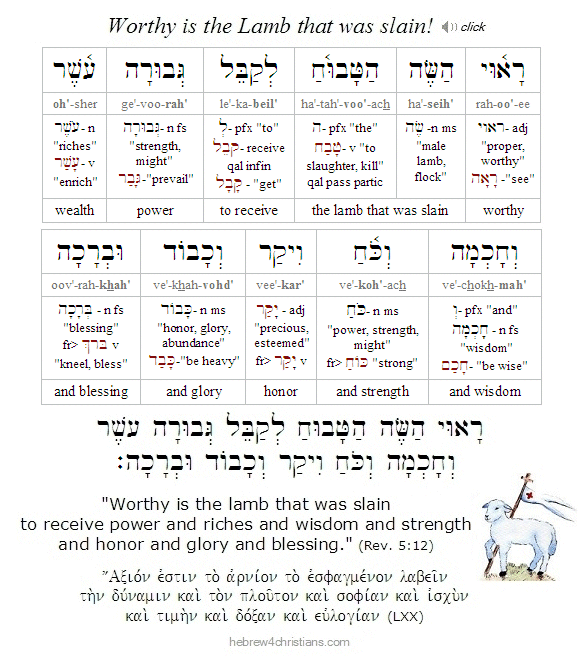 |
 |
Those who are trusting in Yeshua as their atonement before the Father are declared tzaddikim (righteous ones) and their names are written (and sealed) for good in the Lamb's Book of Life (Eph. 1:13, 4:30; 2 Cor. 1:21-22). Yom Kippur is therefore a time of great joy for us, since we have been given g'mar chatimah tovah (גְּמַר חַתִימָה טוֹבָה), "a good and final sealing," in God's Book of Life. Because of Yeshua's sacrifice as our Great High Priest after the order of Malki-Tzedek, where he presented his own blood "behind the veil," we have everlasting atonement and we are therefore forever made a part of God's glorious "story of redemption." Amen. Blessed be His Name forever...
I am so thankful that the day is called Yom Ha'kippurim (יום הכיפורים), the "day of atonements" - in the plural - for that expresses our great need to be healed from the depths of our sins, the untold ravages of our brokenness, the ongoing litany and confession of our powerlessness, and the unending mercies and strength given in our beloved Yeshua, blessed is He. On this Day of Atonements let us rejoice that we are "sealed for good" in the heart of his passion for us. Shalom to you, friends…
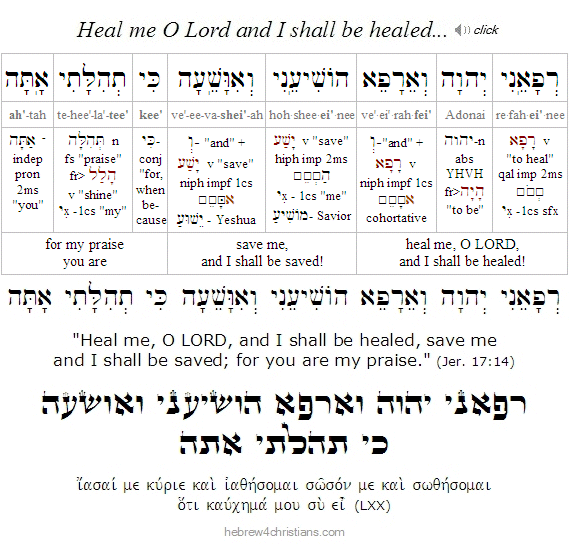 |
Yom Kippur and Prophecy...
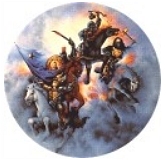
[ Yom Kippur, or the "Day of Atonement," begins this evening at sundown... ]
09.24.23 (Tishri 9, 5784) Some people might feel a certain amount of ambivalence about the holiday of Yom Kippur since it focuses on the ritual of purification for the sanctuary of the Temple, and this seems to have little to do with Yeshua and His sacrifice for our sins. After all, the Levitical system of worship is described in the New Covenant as "a shadow (σκιά) of the good things to come, instead of the true form (εἰκών) of these matters, and it can never, by the same sacrifices that are continually offered every year, make perfect those who draw near" (Heb. 10:1). Since the blood of bulls and goats cannot truly take away sins (Heb. 10:3), the sacrificial system was intended to foreshadow the coming work of Messiah, who was born to die, in accordance with God's will, and to offer his own body as a sacrifice for sin "once for all" (Heb. 10:5-10). "For by a single offering (μιᾷ γὰρ προσφορᾷ τετελείωκεν) he has perfected for all time those who are being sanctified" (Heb. 10:14).
Now while it is gloriously true that Yeshua functioned as our great High priest after the order of Malki-Tzedek by offering his blood upon the heavenly kapporet in the holy of holies "made without hands," there still is a prophetic component to this holiday that applies to ethnic Israel regarding the prophesied End of Days. After all, the realm of "shadows" still applies in the case of unbelieving Israel, who has yet to behold the unveiled glory that awaits her... Therefore the psalmist prophetically cries out, "Help us, O God of our salvation, for the glory of your Name; deliver us, and atone for our sins, for the sake of your Name" (Psalm 79:9), and this refers to the hour when Israel will call upon the LORD for salvation during the End of Days, otherwise called the great Day of the LORD. This event is prefigured in the blast of the "great shofar" which will be sounded to announce Yeshua as Israel's true Redeemer and King. Indeed, our the Messiah will one day return to Israel, cleanse her Temple, restore her to Himself, and set up His glorious kingdom.
 |
Since prophetically speaking Yom Kippur signifies ethic Israel's atonement secured through Yeshua's sacrificial avodah as Israel's true High Priest and King, there is still a sense of longing and affliction connected to this holiday that will not be removed until finally "all Israel is saved" (Rom. 11:26). So, on the one hand we celebrate Yom Kippur because it acknowledges Yeshua as our High Priest of the New Covenant, but on the other hand, we "have great sorrow and unceasing anguish in our hearts" for the redemption of the Jewish people and the atonement of their sins (Rom. 9:1-5; 10:1-4; 11:1-2, 11-15, 25-27). In the meantime, we are in a period of "mysterious grace" wherein we have opportunity to offer the terms of the New Covenant to people of every nation, tribe and tongue. After the "fullness of the Gentiles" is come in, however, God will turn His full attention to fulfilling His promises given to ethnic Israel. May that great Day of the LORD come soon, chaverim...
The judgment of God upon the USA, and indeed the world, has never been more apparent. For those with ears to hear: do teshuvah and pray. The time is near!
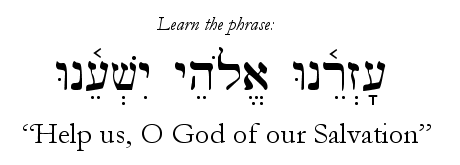
Receiving Salvation...

[ How do we get "saved" or are made right with God? Is it by means of religious rituals, or by doing good deeds, or by believing certain things about God, or perhaps all of these? ]
09.22.23 (Tishri 7, 5784) Do you really understand how you are "saved" or made right with God? Do you "get" the message of the gospel? I once read from a Christian devotional book that said that in order to receive God's salvation you must do the following: 1) believe in Jesus' substitutionary death and resurrection; 2) turn away from your sins, and 3) ask him to be the Lord and Savior of your life. The author then went on to explain that "this means you have to renounce and turn away from everything in your life that is contrary to what God wants: you must give up your sinful self-centeredness and turn to God."
Now at first glance this appeal may sound Biblical, but it implicitly assumes that your own goodness and self-effort will save you. After all, if you really could turn away from your sins and from "everything in your life that is contrary to what God wants," and if you really could simply "give up your sinful self-centeredness," then there really would be no need for the miracle of spiritual rebirth, no need for the power of God to impart a new nature to you, and therefore no need for the cross of Messiah to save you from the verdict of the moral law.
Some people tend to think that to be "crucified with Messiah" means that we must totally surrender our lives to God by denying ourselves and mortifying every passion apart from the Spirit of Messiah living within us (Gal. 2:20). But again, if we could do this - if we really could crucify ourselves, deny ourselves, and completely yield our hearts to God in absolute surrender, we wouldn't need the miracle of salvation, would we? We'd be back at the religious game, attempting to please God through our own "best efforts," and endeavoring to affect spirituality by means of our own merit.
Yeshua said that no one is able to come (οὐδεὶς δύναται ἐλθεῖν) to him for life unless God Himself "drags him" (John 6:44). The flesh is scandalized by this, of course, since the ego plays no part. Eternal life is found in the righteousness of Yeshua, and self-denial means to quit thinking about yourself (from α-, "not," + ῥέω, "to speak") by accepting what he has done for you. We have been (already) crucified with Messiah (the verb συνεσταύρωμαι is a perfect passive form), and just as we are identified with him in his death, so we are identified with him in his resurrected life. This is a matter of faith, trusting that God's love for your soul overcomes the law's powerlessness and your own inability to save yourself...
Contrary to the vain hope that "God helps those who help themselves," we must emphasize that God helps precisely and only those who cannot help themselves... Indeed the teaching of the New Covenant is clear: God will perform a miracle by putting his Torah within your will, writing it on your heart, and recreating you into his child (Jer. 31:33; Ezek. 36:26; John 3:3; 2 Pet. 1:4). All this comes from the power of God alone, however, not by human aspiration or resolution or good works (John 1:12-13; 6:44; Rom. 10:9-12; Titus 3:5). Like father Abraham, we are "justified" (i.e., made right) with God by believing in his power, relying on his Spirit, and trusting in his promise of love (Hab. 2:4; Rom. 4:13-25).
Yeshua did not come to set up a "new religion" but to give life to the dead. Therefore it is no longer "I" who live but Messiah in me, which is to say that we do not possess the miracle but the miracle possesses us... You are made into a new creation (בְּרִיָּה חֲדָשָׁה); your former life is passed and now all things become new (2 Cor. 5:17). But again you are not saved by "reforming" your character or by becoming a "promise keeper," but trusting in God's power and character. This is the way to receive the blessing. You come to God just as you are - acknowledging the truth of your raw and desperate need for deliverance from the corruption of your sinful condition, pressing past the verdict of the law in your desire for God's compassion (Psalm 85:10; Rom. 4:25). That's the heart of the gospel, after all. All you can do is bring is your brokenness and need to God for healing and then to respond to God's love by receiving it with humility and gratitude. Being made right with God is the gift of accepting that you are accepted despite your unacceptability because of God's great mercy for your life. This is indeed a miracle, for we need God to even know that we need God! As Yeshua said: "Blessed are the poor in spirit, for theirs is the Kingdom of God" (Matt. 5:3).
It is carnal pride to think that we can pledge to be perfect before we can come to the Lord for salvation. Can you imagine a person who has suffered for years as an alcoholic or addict of some kind being told that in order to be made right with God, they must believe that Yeshua died for their sins and that they therefore must turn away from all their sins, be perfect in their resolve, and pledge never to sin or be selfish again? For those of you who have suffered from addiction or struggled with chronic "character defects" in your lives, you know that empty promises to change mean nothing when it comes to turning away from what holds you in bondage... עָקב הַלֵּב מִכּל וְאָנֻשׁ ה֑וּא מִי יֵדָעֶנּו - "The heart is deceitful above all things and incurably sick: Who can know it?" (Jer. 17:9). God is not impressed with our promises and pledges; he understands that we are bankrupt and powerless; he knows that what we need is nothing less than the miracle of raising a dead person to newness of life.
None of this is meant to impugn the importance of living your faith and making godly choices, of course... "Faith without works is dead," but note that such "works" come from the Spirit of God, as the truth that is worked into us is worked out in our experiences (Isa. 26:12). The "work" of God is to believe in Yeshua (John 6:29) and true faith will "show up" in our lives (Eph. 2:10). As Kierkegaard said, the opposite of sin is not virtue, but faith. Therefore we must test the spirits, and most importantly our own: Do you really believe, even when you are tempted to judge yourself or others?
There's nothing "easy" about really believing in God (though it is easy enough to say you believe when in fact you don't). The pattern remains: unless a seed "falls to the ground" and dies it abides alone; but if it dies, it brings forth much fruit (John 12:24). We first encounter the risen Lord and connect with the truth, and then we get off our crazy road to Damascus... Our subsequent life of sanctification is a "slow motion" catching up with the miracle and reality of the new birth wherein we "become who we are" in the Messiah (Col. 1:27; 3:1-4). In this connection, however, please remember that all the commandments of the New Covenant are directed to the new nature, not the old "Adamic" nature that is mortified and buried away from the life of the child of God.
Hebrew Lesson:
Isaiah 30:15b Hebrew reading:
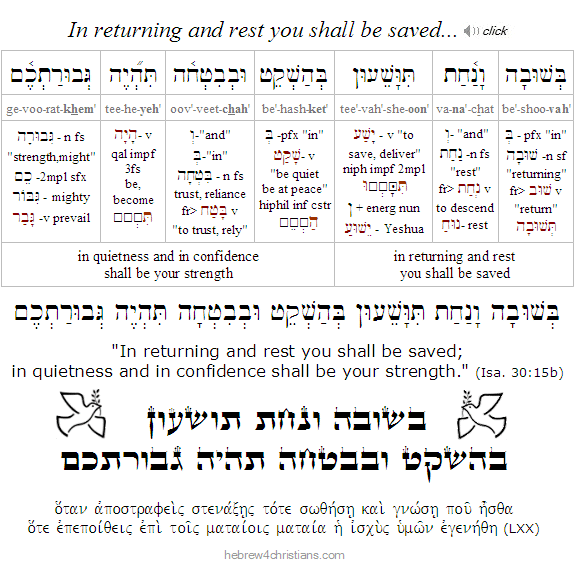 |
Yom Kippur - Day of Atonement

[ This year the Yom Kippur fast begins an hour before sundown on Sunday, Sept. 24th and lasts until an hour past sundown the following day.... ]
09.22.23 (Tishri 7, 5784) Yom Kippur (יוֹם הַכִּפּוּרִים), or the "Day of Atonement(s)," is regarded as the holiest day of the Jewish year, and provides prophetic insight regarding the Second Coming of the Messiah, the restoration of national Israel, and the final judgment of the world. It is also a day that reveals the High-Priestly work of Yeshua as our Kohen Gadol (High Priest) after the order of Malki-Tzedek (see Heb. 5:10, 6:20). The term Yom Kippur is written in the plural in the Torah, Yom Ha-Kippurim (יוֹם הַכִּפֻּרִים), which alludes to the two great atonements given by the LORD - the first for those among all the nations who turn to Yeshua for cleansing and forgiveness, and the second for the purification of ethnic Israel during Yom Adonai, the great Day of the LORD (יוֹם־יְהוָה הַגָּדוֹל) at the End of Days.
Hebrew Lesson
Gen. 18:14 Hebrew reading (click):
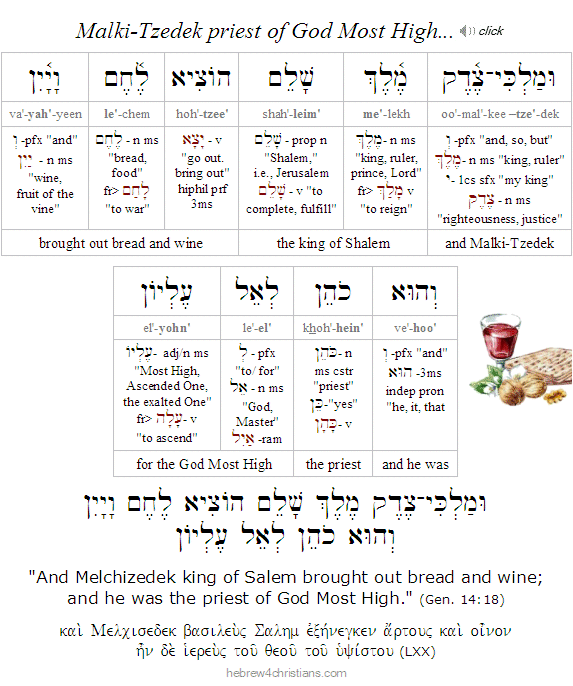 |
For more information, see the Yom Kippur pages.
Witness of the Spirit...
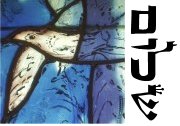
09.22.23 (Tishri 7, 5784) "Because you are his children, God has sent the Spirit of his Son into your hearts, crying, "Abba! Father!" (Gal. 4:6). Note here the Spirit does not cry out using "esoteric" or magical names for God, nor does the Spirit refer to one of God's many titles based on the divine attributes, but instead uses a term of intimacy and profound trust. After all, the word "abba" (אַבָּא) is not so much a name for God as it is a claim about who you are -- it is a confession that you belong to the Lord as his beloved child...
Throughout his ministry Yeshua referred to the LORD simply as his "Father," though he used the intensive address "Abba, Father" (Ἀββᾶ, ὁ πατήρ) just before his arrest and crucifixion, that is, during his intercession at Gethsamane (גַּת שְׁמָנִים), near the olive oil press on the Mount of Olives where the anointing oil for the Temple (שֶׁמֶן הַמִּשְׁחָה) was made, and therefore he called upon "Abba, Father" while in deep suffering and tribulation of heart (Mark 14:36). "Take this cup away from me. Yet not what I will, but what you will..." The mixed dialect of Hebrew and Greek here (i.e., Ἀββᾶ, ὁ πατήρ) may indicate identification with both the Jewish people and the Gentiles who would be united in his passion, as it says, shalom shalom la'rachok vela'karov: "Peace, peace, to him who is far off and to him who is near," says the LORD; "and I will heal him" (Isa. 57:19, Eph. 2:15).
Knowing God as your "father" is an intimate matter of the heart, an inner cry or groan coming from the miracle of spiritual rebirth. "The Spirit himself bears witness to our spirit that we are God's children" (Rom. 8:16). Amen, and Shabbat Shuvah Shalom chaverim...
Hebrew Lesson
Isa. 12:2 Hebrew reading (click):
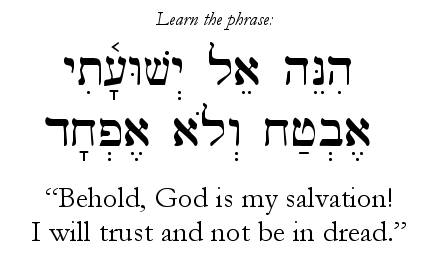
Blood over the Tablets...
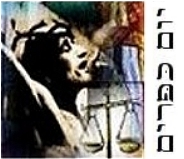
[ Yom Kippur, or the "Day of Atonement," begins this Sunday at sundown... ]
09.22.23 (Tishri 7, 5784) The earthy Tabernacle (i.e., Mishkan) and its furnishings were "copies" of the heavenly Temple and the Throne of God Himself. Moses was commanded to make the Sanctuary according to the "pattern" revealed at Sinai (see Exod. 25:9). As it is written in our Scriptures, "For Messiah has entered, not into holy places made with hands, which are representations (ἀντίτυπος) of the true things, but into heaven itself, now to appear in the presence of God on our behalf" (Heb. 9:24). The centermost point of the earthly Tabernacle was the Ark of the Covenant (אֲרוֹן־הַקּדֶשׁ), a "three-in-one" box that contained God's Holy Word (i.e., the tablets of the Torah). As such, the Ark served as a symbol of kisei ha-kavod (כִּסֵּא הַכָּבוֹד), or the Throne of God.
The Ark stood entirely apart as the only furnishing placed in the "three-in-one" space called the Holy of Holies (קדֶשׁ הַקֳּדָשִׁים). Upon the cover of the Ark (i.e., the kapporet) were fashioned two cherubim (i.e., angel-like figures) that faced one another (Exod. 25:17-18). According to the Talmud (Succah 5b), each cherub had the face of a child - one boy and one girl - and their wings spread heavenward as their eyes gazed upon the cover (Exod. 25:20). This was the sacred place where the blood of purification was sprinkled during Yom Kippur, the Day of Atonement, and this is the Place (הַמָּקוֹם) that prefigured the offering of the blood of the Messiah, our eternal Mediator of the New Covenant. "For I will appear in the cloud over the kapporet" (Lev. 16:2; Exod. 25:22). As it is written, "I have blotted out your transgressions like a thick cloud and your sins like heavy mist; return to me (שׁוּבָה אֵלַי), for I have redeemed you (Isa. 44:22).
 |
The central ritual of atonement given in the Torah is that of the anointed High Priest sprinkling sacrificial blood over the tablets of the law upon the kapporet (the "mercy seat") of the Ark of the Covenant - the Place where "Love and truth meet, where righteousness and peace kiss" (Psalm 85:10). It was from the midst of the surrounding cloud in the Holy of Holies that the Voice of the LORD was heard, just as it was in the midst of the surrounding cloud of darkness upon the cross that Yeshua cried out in intercession for our sins...
חֶסֶד־וֶאֱמֶת נִפְגָּשׁוּ
צֶדֶק וְשָׁלוֹם נָשָׁקוּ
che'·sed ve·e·met neef·ga'·shoo
tze'-dek ve·sha·lom na·sha'·koo

"Mercy and truth have met,
righteousness and peace have kissed."
(Psalm 85:10)

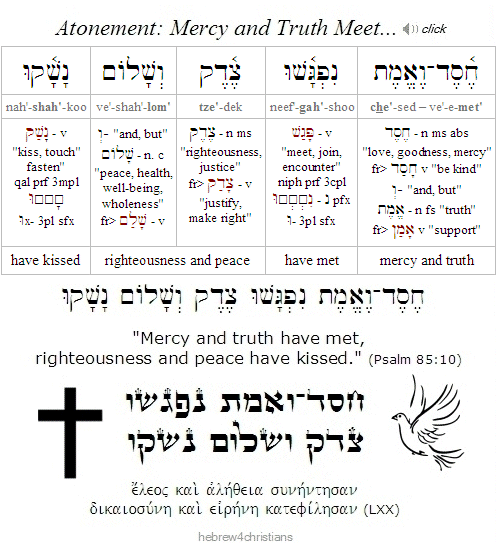
Note further that the High Priest was required to perform the Yom Kippur avodah (service) alone, while wearing humble attire, divested of his glory, and in complete solitude: "No one may be in the tent of meeting from the time he enters to make atonement in the Holy Place until he comes out" (Lev. 16:17). The Hebrew text literally says, "no adam (אָדָם) shall be in the tent," which suggests that something more than the natural man is needed for divine intercession. And just as Moses alone approached God in the thick clouds at Sinai to receive the revelation of the Altar as mediator of the older covenant (Exod. 24:15), so Yeshua, the Mediator of the New Covenant, went through his severest agony on the cross as the darkness covered the earth (Luke 23:44; Matt. 27:45).
Hebrew Lesson
Isaiah 44:22 reading (click for audio):
Yom Kippur and Jonah...

09.22.23 (Tishri 7, 5784) During the afternoon service of Yom Kippur, the Book of Jonah is recited to awaken the heart to "Arise, call out to your God" (Jonah 1:6). Like Jonah we first must be "swallowed up" in consciousness of our own rebellion before we realize we are undone, that we are without remedy apart from God's direct intervention and deliverance. We start there - in the "belly of the fish" - and later are resurrected to go forth by God's mercy and grace. Likewise we first see ourselves as undone and go to the cross, finding pardon and given the power of the ruach HaKodesh to live unto God according to the truth. But note that the imperatives of the New Testament are directed to the new nature given to us by God, and not to the old nature that has been crucified and done away. We are admonished to live in accordance with the truth of what God has done for us through the Moshia', the Savior. You are a new creation, therefore be who you are in the Messiah!
It is noteworthy that Yeshua mentioned the "sign of Jonah the prophet," that is, Jonah's miraculous deliverance after being entombed in the belly of the fish for three days, to authenticate his own claim to be Israel's Redeemer. "Just as Jonah was three days and three nights in the belly of the great fish, so will the Son of Man be three days and three nights in the belly of the earth" (Matt. 12:40). "This is an evil generation. It seeks a sign, and no sign will be given to it except the sign of Jonah the prophet (אוֹת יוֹנָה הַנָּבִיא). For as Jonah became a sign to the Ninevites, so also the Son of Man will be to this generation" (Luke 11:29-30). In other words, the story of Jonah foreshadowed the atoning sacrifice of the Messiah, that is, his death, burial and especially his miraculous resurrection on the third day. Just as God brought Jonah back to life after three days in the belly of the earth, so the resurrection of Yeshua from the dead would vindicate his claim to be the Savior and Redeemer of the world. In this way the "Sign of Jonah" and the sacrificial and atoning work of Yeshua as our High Priest of the new covenant are connected.
"We we were so utterly burdened beyond our strength that we despaired of life itself, yes, we felt that we had received the sentence of death; but that was to make us rely not on ourselves, but on God who raises the dead" (2 Cor 1:8-9). This marks the end of carnal hope, when we realize we are but "dead men walking," and from this extremity of inner desperation and clarity we learn to rely solely on God for what we need. Here we abandon ourselves to God's care, despite the despair, darkness, and fear. We rely on "God who raises the dead," because all other remedies have been vanquished. It is a great gift to be so afflicted, for these "troubles of love" teach us to trust God alone for all we need. The only way out is through. We don't seek an easy way of life, but only that the LORD be with us throughout our troubles...
Hebrew Lesson
Jonah 2:8 Hebrew reading (click):
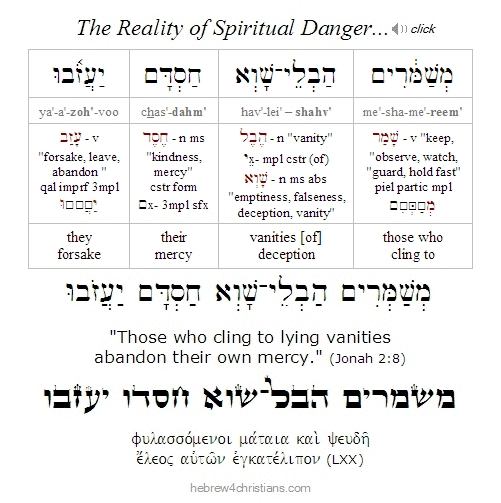 |
Sowing and Reaping...
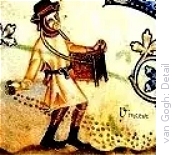
09.22.23 (Tishri 7, 5784) "Do not be deceived: God is not mocked, for whatever one sows, that will he also reap. The one who sows to his own flesh will from the flesh reap corruption, but the one who sows to the Spirit will from the Spirit reap eternal life" (Gal. 6:8). Here we see the importance of feeding the divine nature given to us in Messiah - to "sow" or "plant" truth within our hearts so that we will yield the "fruit of righteousness."
On the other hand, feeding the lower nature, gratifying the desires of the flesh, disregarding the truth of eternity for the sake of temporal pleasure, and so on, leads to corruption and to death. Spirituality (רוּחניוּת), then, is of utmost importance to us, as we learn to "renew our minds" and yield ourselves to the truth of God (Gal. 5:16). We must set our hearts on things above, where Messiah is seated at the right hand of God (Col. 3:1-4).
We are engaged in the battle daily - an internal struggle to direct our hearts and to make the decision to be awake to the Lord's Presence or to surrender to our fallenness, fear, and despair. The Lord has promised us his very strength for the battle, but we must choose to believe in order to receive the blessing...
Since God has promised to help us as we seek to do His will (see 1 John 5:14), let us therefore draw near to the throne of grace with confidence, so that we may receive mercy and find grace to help in time of need (Heb. 4:16). The LORD makes the way of escape for those who seek him (1 Cor. 10:13). He says to the heart of faith: "Fear not, for I am with you; be not dismayed, for I am your God: I will strengthen you, yea, I will help you, yea, I will uphold you the right hand of my righteousness (Isa. 41:10).
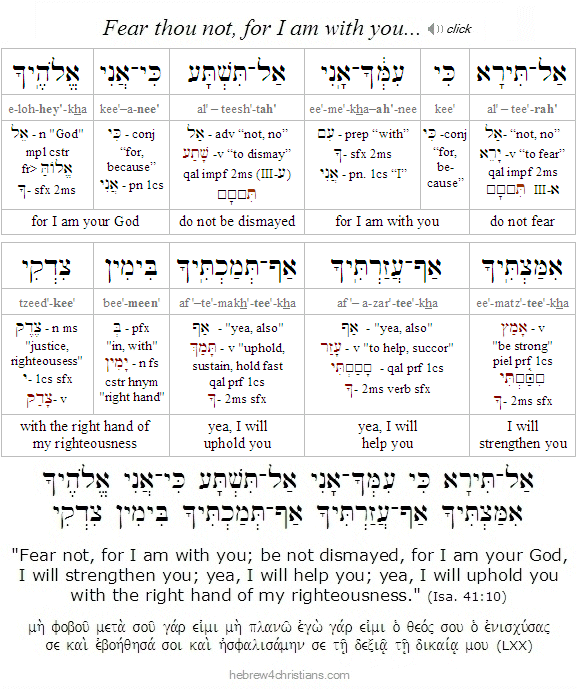 |
Mystery of the Scapegoat...

[ The following is related to Yom Kippur, the "Day of Atonement"... ]
09.21.23 (Tishri 6, 5784) On the holy occasion of Yom Kippur (the "Day of Atonement") the High Priest selected two male goats over which lots were to be drawn. Both goats were to be unblemished, healthy, and as much alike as possible, nearly identitcal. On one lot was inscribed "for the LORD" (לַיהוָה) and on the other was inscribed "for Azazel" (לַעֲזָאזֵל). After the lot was selected, the goat designated "for the LORD" was to be slaughtered as sin offering for the people, whereas the other goat was marked with a red band around its horns and left at the gate of the Tabernacle courtyard. Later in the service, Aaron would confess the sins of the entire community of Israel over this goat, which would then be "sent to Azazel" in the desert (Lev. 16:5-10; 21-22). Notice that in some ways the ritual of the "two goats" of the Yom Kippur service was similar to the ritual of the "two birds" used for the cleansing of the leper we read about in parashat Metzora, since in both cases the focus was on purification from uncleanness (tumah) obtained through the mediation of a priest...
The sending away of the goat "to Azazel" is regarded as one of the central rites of the entire Yom Kippur service, though it has puzzled many of the traditional Jewish commentators. The sages asked how the idea of ritually "transferring" the sins of the people onto a goat could be reconciled with the Torah's clearly expressed commandments that each person has a moral duty to do teshuvah and take responsibility for his or her own actions... In light of this paradox the sages wonder why the Torah commands that on the holiest day of the year a "scapegoat" for sins should become the focal point...
While some scholars think "Azazel" comes from the verb azal (אָזַל), meaning to "go away" (i.e., to banish), the Jewish sages generally regarded the name as a reference to a geographical location of some kind, perhaps to a mountainous region with precipitous cliffs (Bavli Yoma 67b). According to Jewish tradition, the "designated man" assigned to run the goat away from the camp would go to this location to push the goat off a cliff to its death (Lev. 16:21-22). But notice that the idea of killing the goat is a Rabbinical addition, since the Torah simply states that the goat should be "sent away" (וְשִׁלַּח) into the wilderness. After all, if the animal was meant to be killed as a sacrifice for sin, why wasn't it slaughtered at the Tabernacle, as was required for all other sin offerings? Moreover, it is clear that the goat was not intended to be a sacrifice offered to "Azazel" or some other angelic being, since the Torah repeatedly forbids such acts of idolatry (e.g., Lev. 17:7).
According to Maimonides, "Azazel" symbolically represented the "extreme" point of being "outside of the camp," and the goat's exile was intended to instill fear that the same fate awaited those who refused to repent. Other commentators have said that since some of the Israelites made offerings to demons (i.e., se'irim [שְׂעִירִם], the same word for "goats"), the rite of the "sent goat" was intended to exile the idolatrous impulse of the people (Lev. 17:7). Still others have suggested that the two goats represented the struggle between Jacob and Esau, who were similar in appearance but had very different destinies. Jacob represented holy sacrifice (i.e., the goat "for the LORD" at Zion) whereas Esau represented exile (i.e., Mount Seir, the "mountain of goat"). The midrash states that the "sons of god" (בְּנֵי־הָאֱלהִים) who intermarried with human women (Gen. 6:1-2) were actually two angels - Aza and Azael - who originally asked God to allow them to enter human history to prove their loyalty. These two angels rebelled, however, and introduced gross perversions into the human family, and the "sent goat" was therefore offered to atone for the sins of gross sexual perversions and other horrendous evils. Most of the sages regard this midrash as an allegory intended to warn against sexual sin, and therefore the description of the Yom Kippur service is immediately followed by a list of forbidden sexual relationships (Lev. 18).
Finally, a few commentators have suggested that the ritual of the sent goat was a sort of "concession" made to the devil. They argue that the name "Azazel" refers to a name of a particular demon (perhaps even of the devil himself) that was associated with the wilderness regions (see Matt. 4:1). Instead of allowing illegitimate sacrifices made to the "goat demons" (Lev. 17:7), the ritual of "banishing the goat" acknowledged the power of spiritual darkness, and constituted a repudiation of "the force that rules desolate places, whose power is revealed in bloodshed, war, destruction, and under whose authority are the demons, the se'irim, the he-goats" (Nachmanides, Moreh Nevuchim). "Azazel" therefore represents the dread of sin and evil, which is regarded as essential to genuine teshuvah, and the "banishing of the goat" is symbolic of the need to resist the power of the devil... The ritual of the sent goat is therefore not intended to "appease the devil" but is meant to banish impurity and perversity from the community in order to avoid offending the LORD. After all, the goat was not sacrificed but rather sent away from the Presence of God...
The author of the Book of Hebrews writes, "When the Messiah appeared as High Priest of the good things to come, then, through the greater and more perfect Tabernacle (μείζονος καὶ τελειοτέρας σκηνῆς) which is not made with human hands (that is, not of this creation), he entered into the Kodesh Kodashim (Holy of Holies) once and for all - not by means of the blood of goats and calves but by means of his own blood, thus securing for us eternal redemption" (Heb. 9:11-12). The Levitical system of worship was a "shadow" (σκιά) of a greater reality to come (Heb. 10:1), since "it is impossible (ἀδύνατος) for the blood of bulls and goats to take away (i.e., ἀφαιρέω, used to translate the Hebrew כָּרַת, to "cut off") sins" (Heb. 10:4).
In light of the ministry of Yeshua as our great High Priest of the New Covenant, we understand the blood of the sin offering "to the LORD" to represent the blood of atonement that was shed upon the cross for our purification from sin, whereas the offering made "to Azazel" represents the additional aspect of removing of our sins far "outside the camp." Just as both of the goats of the Yom Kippur ritual constituted a single offering made to God (i.e., Lev. 16:5 states "he [Aaron] shall take ... two male goats for a (singular) sin offering"), so the sacrifice of Yeshua represents two aspects of a single offering before God. The blood of the first goat was given "unto the LORD" for atonement, but the exile of the second goat was given to banish sins from the Divine Presence. Likewise Yeshua served as both our atoning sacrifice before the Father and as our "scapegoat" who "carries away our sins" (Isa. 53:4, 5; Matt. 8:17; 1 Pet. 2:24). The "sent away goat" represents the separation from God that Yeshua experienced on our behalf as He bore the wrath of God in our place... Because of the Messiah's sacrifice, our sins are now put away "as far as the east is from the west" and are forever buried in the bottom of the sea, never to be remembered again (Psalm 103:12; Mic. 7:19; Isa. 38:17; Jer 31:34). Yeshua is both our Sin Offering whose blood cleanses us from sin as well as our "Scapegoat" who forever banishes our sins from God's holy Presence. יְהִי שֵׁם יְהוָה מְברָךְ - "Blessed be the Name of the Lord."
Hebrew Lesson
Psalm 103:12 reading (click):
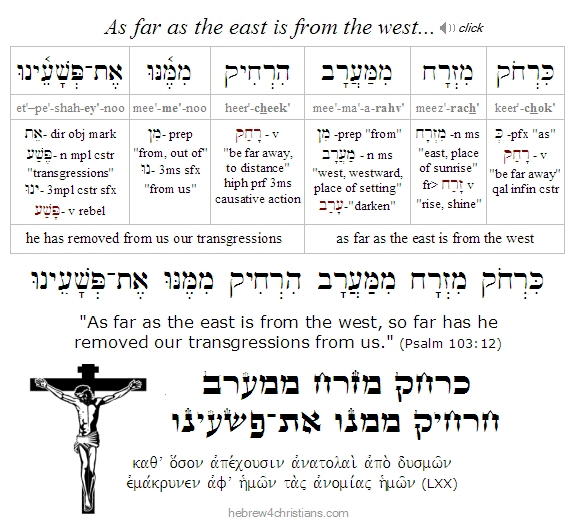 |
Note: Jewish tradition states that Yom Kippur is the date when Moses received the second set of Ten Commandments, after the first set were shattered when Moses descended Mount Sinai. This second set of tablets foreshadowed the surpassing glory that would be later revealed in the New Covenant of Yeshua. For more on this subject, see parashat Ki Tisa and the various other articles on this site, including "The Eight Aliyot of Moses," and "The Surpassing Glory - Paul's Midrash of the Veil of Moses," and so on.
Yom Kippur by Heart...
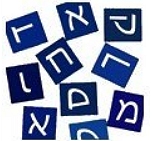
[ The following is related to Yom Kippur, the "Day of Atonement"... ]
09.21.23 (Tishri 6, 5784) The story is told that once a farmer traveled to attend Yom Kippur services but got lost in the woods. As sunset approached, the man was tempted to despair, but he remembered that true service to God is marked by joy and faith, regardless of the present circumstances. He decided, then, to turn his eyes toward heaven.
'Dear God,' he said. 'I have never learned to pray like others have. I have no prayer book, and I am unable to attend a Yom Kippur service... All I really know is the Hebrew aleph-bet. I will recite the letters for You, and You put them together to make the proper words." He then began reciting 'Aleph, Bet, Gimmel, Dalet...' He did this over and over again, full of faith. Later he made his way out of the woods and explained what happened to a sage, who reassured him that above all God prefers sincerity of the heart. מִפִּי עוֹלְלִים וְיֹנְקִים יִסַּדְתָּ עֹז - "Out of the mouth of babes and sucklings You have ordained strength" (Psalm 8:2).
I relate this story to encourage those of us who - for any number of reasons - are unable to attend a Yom Kippur service or to read from a machzor (מחזור), that is, a traditional High Holiday prayerbook. God sees your heart and knows all about you. Rejoice that your atonement is complete in Yeshua, then, and ask God to make "words" from the simple groaning of your spirit. Shalom.
Hebrew Lesson
Deut. 18:13 reading (click for audio):
Atonement and Healing...
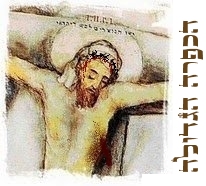
[ The holiday of Yom Kippur (Day of Atonement) begins Sunday, Sept. 24th at sundown... ]
09.21.23 (Tishri 6, 5784) Atonement is about righting the wrong that separates us from God, repairing the breach caused by our sin, and being healed from the curse of death. We all desperately need this healing, yet our own hearts are the source of the trouble (Matt. 15:19-20). The holiness and justice of God (אלהִים) requires that sin be punished by death, but God is also merciful and gracious (יהוה), and therefore He instituted a system of animal sacrifices and blood rituals to provisionally "atone" for sin (i.e., restore the broken relationship with God). Since the life of the flesh is in the blood (Lev. 17:11), and the penalty for sin is death, the shedding of blood represents atonement (i.e., kapparah: כַּפָּרָה) for sin.
With regard to the chatat ("sin offering") or asham ("guilt offering"), a person would bring a kosher animal (korban) to the entrance of the Tabernacle and place both hands on the animal's head to identify with it (Lev. 4:29). This act of "semikhah" (סְמִיכָה) symbolically (i.e., ritually) transferred the penalty of sin and guilt to the sacrificial animal. Then, the person would slay the animal and confess that his sin caused the innocent to be slain in his place (Menachot 110a). The entire sacrificial system was intended to depict this "life-for-life" (חיים לחיים) principle: God accepted the blood of a sacrifice in exchange for the life of the sinner...
 |
The sacrificial system of the mishkan or "Tabernacle" (and later the Temple) was a temporary arrangement until the coming of Messiah, the Promised Deliverer (Gal. 3:24-25; Rom. 10:4; Heb. 9:1-12). The atonement or purification obtained by animal sacrifices was provisional and symbolic, "for it is impossible for the blood of bulls and goats to take away sins" (Heb. 10:4; Micah 6:6). For eternal remedy, for the spiritual life of the soul, something far greater was needed, namely, the sacrifice of God Himself. Consequently, when Yeshua came into the world, he said, "Sacrifices and offerings you have not desired, but a body have you prepared for me," and "'Behold, I have come to do your will, O God, as it is written of me in the scroll of the book" (see Heb. 10:5,7).
All this is profoundly mysterious, of course. After all, if the Kohen Gadol (High Priest) could enter the Holy of Holies only once a year to present sacrificial blood upon the kapporet, invoking the Divine Name YHVH, and interceding for God's mercy on behalf of the people, how much more mysterious is Messiah's intercession for us as he willingly shed his own blood and died in exchange for the curse of our sins (Gal. 3:13)? It was there - in the true Holy of Holies, the "greater and more perfect tabernacle not made with hands" (Heb. 9:11), where the blood of Yeshua was poured out to pay the penalty for our sins, and it was there that we are given eternal life and healing (see 2 Cor. 5:21). Yeshua is the true Temple of God and the Central Sacrifice of God given on our behalf. In ways we simply cannot fathom, the sacrificial death of Yeshua delivers us from the curse of death and makes us alive together with God. We draw near to God through Him alone; he alone is the true High Priest of God, the One who finishes the work of redemption on our behalf in the Temple of his body...
Beware those who would have you return to the terms of the covenant at Sinai (Gal. 3:1). God made a new covenant, not like the covenant made at Sinai (Jer. 31:31-33). The New Testament teaches that Yeshua came to die "for our sins," to heal us from the plague of spiritual death (Heb. 7:27, 9:26; 1 John 3:5). Our sin separates us from God, but Messiah's sacrifice draws us near (Heb. 7:19). The message of the gospel is that the Voice of the LORD - the very Word spoken from between the cherubim who hovered above the kapporet (the cover of the Ark of the Covenant) - "became flesh" and "tabernacled among us" (ἐσκήνωσεν ἐν ἡμῖν) for the purpose of becoming our substitutionary sacrifice for the guilt and defilement caused by our sins (John 1:1,14). Yeshua was "born to die" (Heb. 10:5-7), and his life and mission was lived in relation to His sacrificial death (Mark 8:27-33). As the Apostle Paul put it: This is of "first importance": Yeshua was born to die for our sins, to make us right with God, and was raised from the dead to vindicate the righteousness of God (1 Cor. 15:3-4). His sacrificial death eternally draws us near to God, and we can come boldly before God's Presence on the basis of His shed blood for our sins...
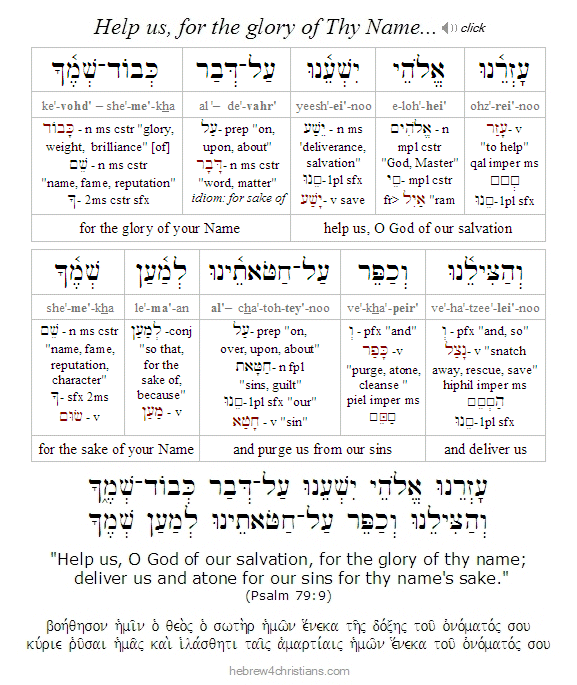 |
The sacrificial system of Torah serves as a parable for us, or a metaphor of God's great redemptive plan revealed in the life and death of Yeshua. The Mercy Seat (kapporet) represents both the Throne of God (Heb. 4:16; 2 Kings 19:15) as well as the cross of Yeshua, where propitiation for our sins was made (Rom. 3:25). Mercy and truth "met" and were reconciled in the cross of Yeshua who serves as the everlasting Mediator of God's grace (Psalm 85:10). The glory of the Torah of Moses was destined to fade away (2 Cor. 3:3-11), just as its ritual center (i.e., the Tabernacle/Temple) was a shadow (σκιά) to be replaced by the greater priesthood of Messiah (Heb. 10:1; 13:10). Yeshua is the Goal and the "Goel" (i.e., גּאֵל, Redeemer) from the curse of the law (Gal. 3:13). "For the law made nothing perfect, but on the other hand, a better hope is introduced, and that is how we draw near (karov) to God" (Heb. 7:19). The sacrificial death of Yeshua caused the veil of the Temple to be torn asunder, revealing that access to the Presence of God is now available for all who come to God trusting in the finished work of God's Son.
For more on this, see "Why the Sacrifices?" and "Yom Kippur and the Gospel."
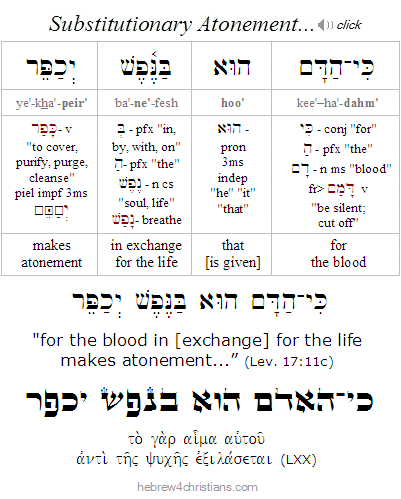 |
Gospel of Teshuvah...

09.20.23 (Tishri 5, 5784) In the Torah we read: "But now, Israel, what does the LORD your God ask from you ... but to love him with all your heart and with all your soul?" (Deut. 10:12). But how are we able to love God be'khol levavka (בכל־לבבך) – "with all our heart" – and be'khol nafshekha (ובכל־נפשׁך) - "with all our soul," apart from healing of the brokenness that makes our hearts divided and sick? That is what the redemption from Egypt was about: we were personally chosen by God, redeemed by his grace, led out from from cruel bondage, only to be led into the desert, away from the world, where we slowly began to understand that we were valued, cared for, and beloved of God. We believed in the possibility of promise, of covenant... Only then could we hear the request from heaven: "Now love Me..." In other words, we can only truly love God by knowing we are beloved by God, and the invitation to love him is a response of his great passion for you (1 John 4:19).
"Come unto Me, all you who are weary and heavy laden, and I will give you rest" (Matt. 11:28). Repent, turn back; return to God's heart. That's the message of the gospel as well: Accept that you are accepted in the heart of the Beloved (Eph. 1:4-6).
Hebrew Lesson
Psalm 143:7 Hebrew reading:
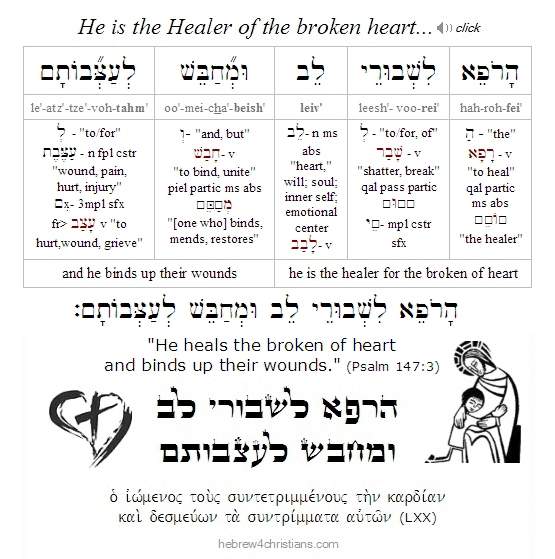 |
Choosing to Believe the Good...

09.20.23 (Tishri 5, 5784) "And now abideth faith, hope, love: these three" (1 Cor. 13:13). The opposite of faith is fear; of hope, despair; and of love, indifference. Fear is the "default mode" of the soul that dwells in darkness. This is because the "fallen" soul regards the empirical world and its flux as ultimately real -- and therefore "sees in order to believe." The life of faith, on the other hand, looks beyond the realm of appearances to behold an abiding glory -- and therefore "believes in order to see." How we choose to see is ultimately a spiritual decision for which we are each responsible....
In the geo-political world there are more seemingly reasons to be afraid today than in any time since the rise of Nazi Germany in the 1930s. Every day the media indoctrinates people about the threats of various plagues (e.g., H5N1, H1N1, SARS, Covid), of economic disasters, of terrorist plots, and so on. In short, living within a "culture of fear" (with its ongoing propaganda campaigns from both the right and left wing perspectives) is to traffic in images and sound bites, inducing a sense of dread and anxiety (as someone once said, "FEAR" is "False Education Appearing Real"). Just as a lie-detector can physiologically sense when people are telling lies, so our souls can sense when we are believing them... There is no neutral ground here, no "transcendent" place of the soul where we can rise above the realm of truth claims: We will either be set free by the truth or else we will live in fear. As Yeshua said, the "Truth shall set you free" (האמת תשחרר אותך).
Of course it isn't easy to be courageous, and the temptation to yield to fear seems omnipresent. The test of our faith is of more value to the LORD than our material or emotional comfort, however, and therefore we will all experience tribulation of various kinds. This is the way we obtain heart (i.e., courage). A few years ago I wrote a Hebrew meditation ("Fear Thou Not") that reminded us that the most frequently occurring commandment in Scripture is simply al tirah (אַל־תִּירָא), "don't be afraid." If living without fear were easy, it would be of little spiritual worth, but since it requires all of our heart, soul, mind, and strength, it is therefore considered precious. It requires, in short, an infinite (and divinely given) passion. And it part of God's plan for us to be "in but not of" the world system, to be alienated, to be misunderstood, to be persecuted... We are called to "take up the cross" and die daily. Following Yeshua means sacrificing ourselves along the way.
Ultimately fear distills to the fear of death, or rather, of "the one who has the power of death, namely the devil" (Heb. 2:14-15). If we come to peace with our own finitude, our own mortality, and our eventual end in the Messiah, death has no more power over us. Perhaps this is part of the reason why Christian faith is so hated in communist countries or in other places of absolutist secular ideologies. If you are delivered from the greatest threat that man can menace over you, you are free to be a voice crying in the wilderness. The life of truth is something the humanist and atheist can never comprehend.
Fear is the antithesis of faith, though living without fear is certainly not easy. After all, how do we naturally choose to be unafraid of what we in fact fear? Is this power within our conscious control? Only by a miracle are we set free from fear... Indeed, true faith working within the heart is one of the greatest miracles of God. May it please God to impart to each us real courage that comes from Heaven itself. Amen.
Hebrew Lesson:
John 4:18a reading (click):
Teshuvah of Messiah...
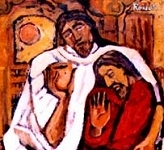
[ "God creates everything out of nothing. And everything which God is to use, he first reduces to nothing." - Soren Kierkegaard ]
09.20.23 (Tishri 5, 5784) "Repent, for the kingdom of heaven has drawn near" (Matt. 3:2). During this "season of teshuvah" (חודש תשובה) it is vital to understand exactly how we are to turn to God to find life.
Some religious people understand "repentance" to mean focusing on themselves, lamenting their sins, and making resolutions to improve their behavior, though this is not the meaning of teshuvah ("repentance") as Yeshua taught, which is turning of the heart in trust of God's love and in the promise of newness of life (John 10:10,28).
"It is no longer 'I' who live but Messiah who lives in me," which means we find life and righteousness in the LORD and not in ourselves -- neither in our resolutions to change, nor in our religious practices, nor even our acts of repentance (Titus 3:5). We are "crucified with" Messiah, and that means the self-life comes to an end (Col. 3:3).
Regarding yourself as separated from God's acceptance will inevitably lead you to the "works of the law" and therefore to the "wheel of sin and death" -- and to despair.
Rightly understood, then, teshuvah cannot be separated from the salvation of the LORD (יְשׁוּעַת יְהוָה), nor can we disregard God's righteousness in the vain attempt to establish our own. Teshuvah receives the miracle of divine exchange: "For our sake he made Him to be sin who knew no sin, so that in Him we might become the righteousness of God" (2 Cor. 5:21).
We do not "reject the grace of God" (Οὐκ ἀθετῶ τὴν χάριν τοῦ θεοῦ) by seeking justification apart from the truth and blessing of Messiah, for He is the one "who loves me and gave himself for me" (Gal. 2:20-21).
The sickness of sin is lethal, and there is no remedy apart from turning to behold Yeshua, the "fiery serpent" lifted upon a stake, the One crucified for our deliverance (Num. 21:8; John 3:14; Gal. 3:13). The teshuvah of God is to turn away from yourself to behold the miracle of God's righteousness given for your sake, and therefore it is a matter of radical faith. "We had the sentence of death in ourselves, that we should not trust in ourselves, but in God who raises the dead" (2 Cor. 1:9). Amen, the verdict of the law condemns us, but God has given us a new covenant (בְּרִית חֲדָשָׁה) in Yeshua the Messiah, "not like the covenant that I made with the fathers on the day when I took them by the hand to bring them out of the land of Egypt" (Jer. 31:31-32), and by means of this new covenant the righteousness of God is given to the one who trusts in sacrificial death of Messiah given on their behalf. "Therefore, if anyone is in Messiah, he is briah chadashah (בְּרִיאָה חֲדָשָׁה), a new creation; the old has passed away; behold, the new has come" (2 Cor. 5:17).
We are told that we must "receive" the life of Yeshua into our hearts, and that is certainly true, but we must also receive his death as well... This is the meaning of "taking up your cross." It is the death of Yeshua in your place that releases you from the tochechah curse of the law (מִקִּלְלַת הַתּוֹרָה), that is, spiritual death, as it is says: "the Messiah has redeemed us from the curse of the law by becoming a curse for us, for it is written, "Cursed is everyone who is hanged on a tree" (Gal. 3:13).
The teshuvah of Yeshua is the miracle of new life; Messiah sets you free from the power of sin and death itself. The repentance of Yeshua is to trust in God's remedy for your sin: "This is the work of God, to believe in the One whom God sent" (John 6:29).
"He saw that there was no man, and wondered that there was no one to intercede; then His own arm brought him salvation, and his righteousness upheld him" (Isa. 59:16). We must turn away from the idea that God demands anything from us other than trust in his love. "Truly, I say to you, unless you turn and become like children, you will never enter the kingdom of heaven" (Matt. 18:3). Stop trying to measure up to his standards. You simply cannot give more than you have the love to give, so you must begin by getting your heart needs met by accepting God's unconditional love. It's not about what you do for God, after all, but about what he does for you. That's the message of the gospel.
Trust that you are rightly related to God because of the salvation of Yeshua, not because of your own efforts at self-improvement. "I tell you the solemn truth, the one who hears my message and believes the One who sent me has eternal life (חַיֵּי עוֹלָם) and will not be condemned, but has passed over (i.e., μετά + βαίνω, lit., "crossed over" [עָבַר]) from death to life" (John 5:24).
We must be careful not to worship an idol, that is, a false concept of God! It is possible to read the Bible, to go to church or synagogue, and yet worship a pagan god. How so? By not knowing the heart of the Father; by not honoring the One who passionately seeks our healing. We know the Father by the Son, that is, in "the language of Son" (Heb. 1:2; Luke 10:21-24). Our heavenly Father is eager to forgive and embrace all of his children.
In Yeshua's famous parable of the "prodigal son," the father saw his child a "long way off" and ran to embrace and kiss him - no questions asked, no explanations needed about his past. When the son nevertheless began reciting his carefully prepared speech of repentance, the father barely listened, and in his overwhelming joy instructed his servants, 'Bring quickly the best robe, and put it on him, and put a ring on his hand, and shoes on his feet. And bring the fattened calf and kill it, and let us eat and celebrate. For this my son was dead, and is alive again; he was lost, and is found...' (Luke 15:20-25).
Hebrew Lesson
Ezekiel 36:26a Hebrew reading (click):
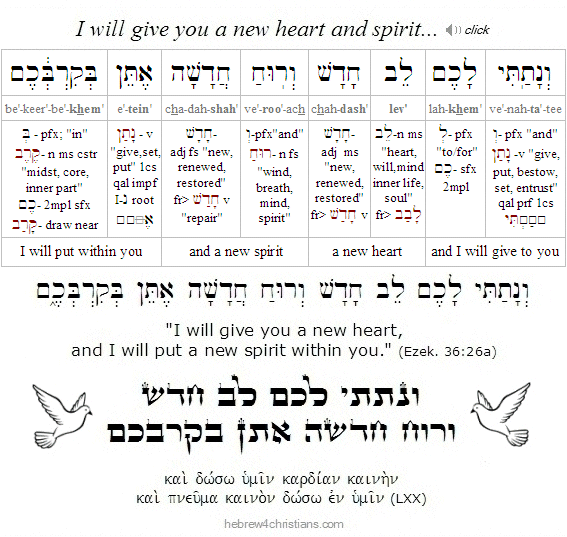 |
The 70th Week of Daniel...
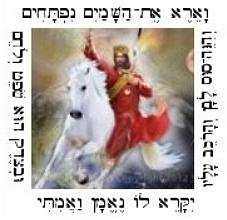
09.19.23 (Tishri 4, 5784) Though no one knows the day or hour of the return of Yeshua our Messiah (Matt. 24:36; Acts 1:7), there are clues given in Scripture about the conditions of the world before His return, and Yeshua himself gave us parables admonishing us to actively be looking (see Matt. 24:2-14; 25:1-13). The Apostle Paul said that followers of the Lord can know the "season" of Messiah's return, and warned that He will come "as a thief in the night" - not in great power and glory at the end of the age (1 Thess. 5:2-6). Moreover, Paul forewarned of the rise of worldwide godlessness (2 Tim. 3:1-7) and the eventual apostasy of the "institutionalized" church (1 Tim. 4:1-3). Other Scriptures foretell the rise of worldwide tyrannical government, the rise of the Messiah of evil (Antichrist) and the institution of the "security state" (Dan. 11:38), the rebirth of the nation of Israel, the desire to rebuild the Temple, the coming Great Tribulation, and so on.
In addition to these general signs or clues, however, there are amazing prophecies of Daniel that should also be taken into account. The prophet Daniel wrote of seventy "weeks of years" (שבוע של שנים), or 490 years, that would explain what would happen in the latter days and the restoration of all things (Dan. 9:24).
Daniel divided the 490 years into three distinct parts. The first part was a seven weeks of years (i.e., 49 years) that foretold the rebuilding of Jerusalem that would begin with the decree of Cyrus (in 538 BC) after the 70 year Babylonian exile (see Isa. 44:26-28; 45:1-4, Ezra 1:1-3). The second part was a sixty two "weeks of years" period (i.e., 434 years) that would end end when the Messiah was "cut off" (כרת) to make an end of sins for his people and to bring in everlasting righteousness (Dan. 9:24-26). The third part was a final "week of years" (i.e., 7 years) in which an evil ruler would ascend to power who would make a covenant of peace with the world, but in the middle of the "week" (i.e., 3 1/2 years), would treacherously break the covenant and persecute Israel (Dan. 9:27, Matt. 24:15). This period of time is otherwise known as the time of Jacob's trouble (Jer. 30:7), the day of indignation (Isa. 26:20-21), and the "Great Tribulation" (Matt. 24:21; Dan. 12:1). The subsequent judgment from heaven during this time is called Yom Adonai ha'gadol (יום־יהוה הגדול) "the great day of the LORD" (Joel 1:15; Isa. 2:12; Jer. 46:10; Ezek. 30:3; Zeph. 1:7, etc.).
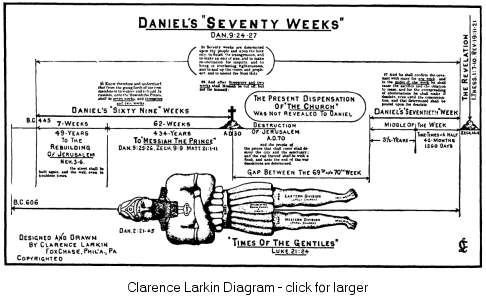 |
What is particularly interesting from a prophetic point of view is that the climactic 70th week of years was set apart and broken off from the previous 69 weeks of years, creating a "gap" or hiatus that has been called "the age of grace" or sometimes the "church age." The gap is alluded to by the statement that Messiah the Prince (משׁיח נגיד) would be "cut off" and after that would occur an undefined time of "desolations" of the Roman wars, the destruction of the Second Temple, and the worldwide diaspora of the Jewish people (Dan. 9:26). During this time (or "dispensation"), the way to be in right relationship with God is to believe the message of the gospel of Yeshua the Messiah.
Now the final 70th week of years is itself divided into two equal parts: the first part will be a time of "peace," but in the middle of the week (וחצי השׁבוע) the evil ruler (המשיח השקרי) will break the covenant, stop Jewish worship practices, and declare himself to be a god. He then will persecute the Jewish people and attempt to finally exterminate them from the earth (2 Thess. 2:3-8). Before the advent of last week of years, however, the restraining power of God will be removed, which some associate with the rapture or "snatching away" of the followers of Messiah (2 Thess. 2:6-7; Gen 7:1-16). Believers will then set apart from the plagues of God's wrath mentioned in the book of Revelation (1 Thess. 5:9) to participate in the "Marriage of the Lamb" (Rev. 19:7). Seven blessings will be recited (i.e, sheva berachot) and the bride will circle the groom seven times under the chuppah (wedding canopy). After the marriage are seven days of celebration. After this the LORD will return to earth with his saints, overthrow the false Messiah, save the Jewish people, and establish the Kingdom of God (Rev. 19:11-16). The promises of the LORD spoken of the prophets concerning Zion and the blessing of the land given to Abraham, Isaac, and Jacob will be fulfilled (Isa. 2:2-4; Micah 4:1; Zech. 8:3; Psalm 86:9; Jer. 3:17) and the Seventh Millennium of history will commence (Rev. 20:4).
"Out of Zion, the perfection of beauty, God shines forth" (Psalm 50:2). Zion represents the rule and reign of God in the earth and is therefore synonymous with the Kingdom of God. The entire redemptive plan of God -- including the coming of the Messiah Himself and our very salvation -- is wrapped up in the concept of Zion. It is the "historiography" of God -- His philosophy of history, if you will. Zion represents our eschatological future -- our home in olam haba (the world to come). Even the new heavens and earth will be called Jerusalem -- "Zion in her perfection" (Rev. 21). "This is what Adonai Tzeva'ot says: I am very jealous for Jerusalem and Zion, but I am very angry with the nations that feel secure" (Zech. 1:14-15). "For Zion's sake I will not keep silent, for Jerusalem's sake I will not remain quiet, till her righteousness shines out like the dawn, her salvation like a blazing torch" (Isa 62:1). "The builder of Jerusalem is God, the outcasts of Israel he will gather in... Praise God, O Jerusalem, laud your God, O Zion" (Psalm 147:2-12).
The LORD God Almighty has vowed to break the pride of the "kings of the earth" with a rod of iron and dash them in pieces like a potter's vessel, and the shattering will be so ruthless that among its fragments not a shard will be found with which to take fire from the hearth, or to dip up water out of the cistern (Psalm 2:9; Isa. 30:14). For from His mouth comes a sharp sword with which to strike down the nations, and He will rule them with a rod of iron. He will tread the wine press of the fury of the wrath of God the Almighty (Rev. 19:15). Nebuchadnezzar's great dream will soon be fulfilled: "As you looked, a Stone was cut out by no human hand, and it struck the image on its feet of iron and clay, breaking them in pieces. Then the iron, the clay, the bronze, the silver, and the gold, all together were broken in pieces, and became like the chaff of the summer threshing floors; and the wind carried them away, so that not a trace of them could be found. But the stone that struck the image became a great mountain and filled the whole earth" (Dan. 2:34-35). "And the God of heaven will set up a kingdom that shall never be destroyed ... and it shall stand forever" (Dan. 2:44). One day the edifice of man's godless pride will come crashing down, and there will be no trace left of its rubble... Even so, come quickly, Lord!
Saying "NO" to the Lie...
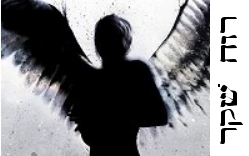
09.19.23 (Tishri 4, 5784) We often have simplistic ideas about "temptation." For instance, we may think that it refers to being enticed to selfishly indulge the lusts our lower nature... A more mature view of temptation, however, understands that it begins within our minds and is justified by means of our faulty thinking. The practice of managing and testing our thought life (i.e., our attitudes, the assumptions behind our choices, etc.), is therefore crucial for our spiritual well-being. Examine yourself, then, to see if you are living the faith (2 Cor. 13:5). Be careful not to fool yourself by rationalizing godless thinking in the name of "prudence" or "wisdom" or "self-pity." The devil disguises his appeals as "sympathetic," "reasonable" and "justified," though his assumptions are grounded in the despair that comes from the denial of God's Reality and Presence... Friend, listen to the dialog happening within you; wake up to what you realyy are believing. Then repent and ask the Lord for your daily deliverance....
Yeshua avowed before Pontius Pilate: "For this reason I was born, and for this reason I came into the world – to testify to the truth. Everyone who belongs to the truth listens to my voice" (John 18:37). Therefore his followers, that is, those who genuinely believe in Him, must be truth-focused people who exercise ongoing vigilance to "walk in the truth." This requires the mental discipline of clear thinking, testing truth claims for soundness, and distinguishing good from evil. "We cast down arguments and every lofty opinion raised against the knowledge of God, and we take every thought captive to obey the Messiah" (2 Cor. 10:5).
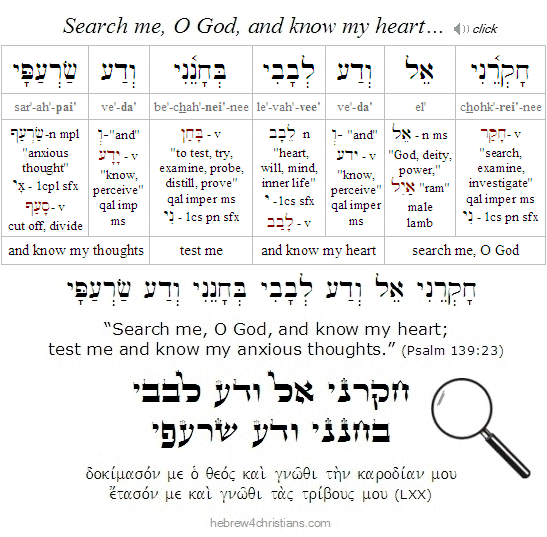 |
Not of this World...
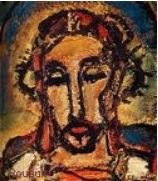
09.19.23 (Tishri 4, 5784) When Moses proclaimed the good news of God's forthcoming redemption for Israel, the Torah states that the people could not listen because they were "short of breath" (Exod. 6:9). Interestingly, this phrase (i.e., mi'kotzer ru'ach: מִקּצֶר רוּחַ) can also mean "lacking in spirit," as if in a paralyzed state of hopelessness...
Life in this evil world can be suffocating at times. And while we may not be under the oppression of a cruel Pharaoh, we are affected by the "princes of this age" who spurn the message of the Messiah's redemption and love, and we are still subjected to bondage imposed by taskmasters who defy the LORD and who seek to enslave us by means of lies, propaganda, "mandates," and threats of violence... The devil is still at work in the hearts and minds of many of his "little Pharaohs" that serve the world system.
Nevertheless "there is no fear in love" (אין פַּחַד בָּאַהֲבָה), especially since we know that ein od milvado -- there is no real power apart from the LORD (i.e., He is the only true Power in the universe). Indeed, Yeshua is elyon lemalkhei-aretz (עֶלְיוֹן לְמַלְכֵי־אָרֶץ) - the "Ruler of the princes of the earth" (Rev. 1:5) - and that means that they will answer to Him (Psalm 2). If you belong to the Messiah you are not part of this world and its matrix of deception but instead serve the King of Kings (Col. 1:13; Acts 26:18; 1 Pet. 2:9). Therefore set your thoughts on things above, not on things of this world (Col. 3:2). In the end all things born of the lie will be exposed and forever put away from us (Eccl. 12:14). The great Day draws near. "For though the vision awaits its appointed time; it hastens to the end -- it will not lie. If it seems slow, wait for it; it will surely come; it will not delay" (Hab. 2:3).
Hebrew Lesson
Zephaniah 1:14a reading (click for audio):
Yom Kippur and Chesed...

[ Yom Kippur, or the Day of Atonement, is the climax of the 40 day "Season of Teshuvah." ]
09.19.23 (Tishri 4, 5784) The ten days from Rosh Hashanah through Yom Kippur are known as Aseret Yemei Teshuvah (עֲשֶׂרֶת יְמֵי תְּשׁוּבָה), "the Ten Days of Repentance," otherwise called the "Days of Awe" (yamim nora'im: ימים נוראים). Since man was created for the sake of teshuvah, Yom Kippur, or the Day of "at-one-ment," is considered the holiest day of the year, called "Yom ha-kadosh" (יוֹם הַקָּדוֹשׁ). It is the climax of the 40 day "Season of Teshuvah."
As I've mentioned before, the "Day of Atonement," or Yom Kippur, is actually described in the plural: Yom Ha-Kippurim (יוֹם הַכִּפֻּרִים), perhaps because the purification process cleansed from a multitude of transgressions, iniquities, and sins. However, the name also alludes to the two great atonements given by the LORD God of Israel - the first for those among all of the nations who turn to Yeshua for cleansing and forgiveness, and the second for the purification of ethnic Israel during Yom Adonai, the great Day of the LORD (יוֹם־יְהוָה הַגָּדוֹל) at the end of days. There is a connection with the holiday of Purim, too, since Kippurim can be read as Yom Ke-Purim, a "day like Purim." Thus the day on which Yeshua sacrificed Himself on the cross is the greatest Purim of all, since through His loving intervention we are eternally delivered from the hands of our enemies...
The Torah refers to Yom Kippur as "shabbat shabbaton" (שַׁבַּת שַׁבָּתוֹן), a time when all profane work is to be set aside so the soul could focus on the holiness of the LORD. The first occurrence of this phrase is found in Exodus 16:23, regarding the restriction of collecting manna in the desert during the seventh day. This restriction was later incorporated into the law code for the Sabbath day (Exod. 31:15; 35:2). The phrase also occurs regarding Rosh Hashanah (Lev. 23:24), Yom Kippur (Lev. 16:31; 23:32), two days of Sukkot (Lev. 23:39; Num. 25:35), two days of Passover (Lev. 23:7-8), and the day of Shavuot (Num. 28:26).
If you add up these days, you will find there are seven prescribed days of "complete rest" before the LORD, and the sages identified Yom Kippur as the Sabbath of these other special Sabbath days, that is, "Yom ha-kadosh" (יוֹם הַקָּדוֹשׁ), which occurs on the tenth day of the seventh month of the Torah's holiday calendar. Indeed, the Talmud notes that "seven days before Yom Kippur, we separate the High Priest," corresponding to the seven-day seclusion of Aaron and his sons before the inauguration of the Tabernacle (Lev. 8:33).
All of the biblical holidays find their origin in the events of the Exodus, which were later commemorated as rituals at the Tabernacle. On the first of Nisan, two weeks before the Exodus, the LORD showed Moses the new moon and commenced the divine lunar calendar. This is called Rosh Chodashim. Two weeks later, God was ready to deliver the Israelites from their bondage in Egypt. Earlier that evening the Israelites kept the Passover Seder and sprinkled the blood of the lamb on their doorposts. At the stroke of midnight of Nisan 15 the LORD sent the last of the ten plagues on the Egyptians, killing all their firstborn. On the 6th of Sivan, exactly seven weeks after the Exodus (49 days), Moses first ascended Sinai to receive the Torah (Shavuot). Just forty days later, on the 17th of Tammuz, the tablets were broken. Moses then interceded for Israel for another forty days until he was called back up to Sinai on Elul 1 and received the revelation of Name YHVH (Exod. 34:4-8). After this, he was given the Second Tablets and returned to the camp on Tishri 10, which later was called Yom Kippur. Moses' face was shining with radiance in wonder of the coming New Covenant which was prefigured in the rituals of the Day of Atonement (Exod. 34:10).

Recall that there were two revelations of the Name YHVH, first as "I AM WHO I AM" (a play on the Hebrew verb hayah [הָיָה] given to Moses in Exodus 3:14-15 which was later "incarnated" during the intervention of the Exodus (Exod. 6:1-8)), and the second revelation of YHVH's name that was given after Moses' intercession over the sin of the Golden Calf (Exod. 34:6-7). It is the later revelation that foretold God's Name of the new covenant, just as the second tablets took the place of the former tablets that were shattered. Ultimately Yeshua is the "wonder" of the covenant of the LORD (Exod. 34:10), the manifestation of the attributes of God's mercy (middot rachamim). For more on this fascinating and rich topic, see the Hebrew for Christians article, "Yom Kippur and Chesed."
Hebrew Lesson
Exodus 34:6 reading (click for audio):
Turning to God's Heart...

09.18.23 (Tishri 3, 5784) Turning to God in teshuvah, or "conversion," is not something you accomplish in your own strength or will. No, it is an act of grace wherein God touches you to make you alive (John 1:11-12). After all, how could it really be otherwise? From our perspective, teshuvah is a matter of trust - first trusting that God loves you and redeems you from the curse of your life, and second, that he will guide you by means of his spirit to know him. Sanctification, then, is the practice of attending to God's presence, seeking him in your heartache and in your hope, walking with him in your sorrows and in your joys....
Doubts may sometimes arise, however. You may hear questions within your soul asking where you are really going, or questions about the choices you have made. You may feel anxious or uncertain about your relationship to God. When this occurs, you must remember who you truly are. You must recall God's personal love for you, even when you feel afraid or lost inside. God's everlasting love in Yeshua is the foundation, the solid rock, and the place where you will find your shelter. It is the very "ground of your being." God's heart is the place where you are never left nor forsaken, even if you have wandered into painful byways of regret, sinfulness, and loneliness. Like the prodigal, when we "come to ourselves," when we remember where we really belong, we will rediscover our Father's outstretched arms welcoming us back home (Luke 15:17-24).
Hebrew Lesson
Isaiah 41:13 Hebrew reading (click):
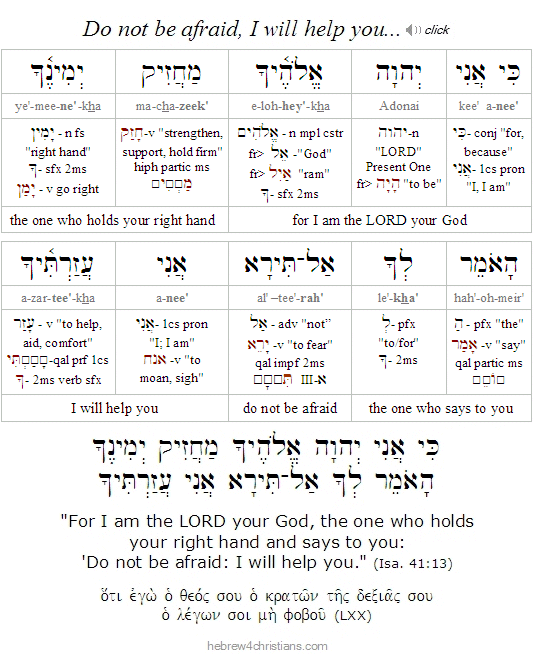 |
The Day of God's Name...
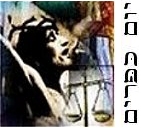
[ Yom Kippur begins Sunday, Sept. 24th an hour before sundown this year... ]
09.18.23 (Tishri 3, 5784) Yom Kippur was the only time when the High Priest could enter the Holy of Holies and call upon the Name of YHVH / YHVH (i.e., יהוה) to offer blood sacrifice for the sins of the people. This "life for a life" principle is the foundation of the sacrificial system and marked the great day of intercession made by the High Priest on behalf of Israel. For this reason it was also called the "Day of God's Mercy," or the "Day of God's Name" (יום השם יהוה). This alludes to the revelation of the attributes of God's Compassion after the sin of the Golden Calf (see Exod. 34:6-7) -- a disclosure that foreshadowed the New Covenant. How much more, then, is Yom Kippur the "Day of Yeshua's Name" (יום השם ישוע) since He secured for all of humanity everlasting kapparah (atonement)? Yeshua the Messiah is Moshia ha'olam (מוֹשִׁיעַ הָעוֹלָם), the Savior of the world; He alone possesses the "Name above all other Names" (Phil. 2:9-10; Acts 4:12). It is altogether fitting, then, that God's "hidden Name" (i.e., shem ha-meforash: שֵׁם הַמְּפרָשׁ) was proclaimed before the kapporet (Ark of the Covenant) in the Holy of Holies while atonement for our sins was made through the sacrificial blood.
This gives us a whole new perspective on Paul's words (Rom. 10:9): "if you confess with your mouth that Yeshua is LORD (יהוה) and believe in your heart that God raised Him from the dead (i.e., that his blood was shed and presented on your behalf upon the heavenly kapporet), then you will be saved (that is, you will be reconciled to God and made a partaker of the atoning work of Yeshua). Surely the Apostle Paul, a zealous rabbi who diligently studied Torah in Jerusalem under Rabbi Gamaliel (who was himself the grandson of the renowned Rabbi Hillel the Elder), understood the theological implications when he stated that the prophecy: "And it shall come to pass that everyone who calls on the Name of the LORD (בְּשֵׁם יְהוָה) shall be saved" (Joel 2:32) applied directly to Yeshua (Rom. 10:10).
Hebrew Lesson
Joel 2:32a Hebrew reading (click):
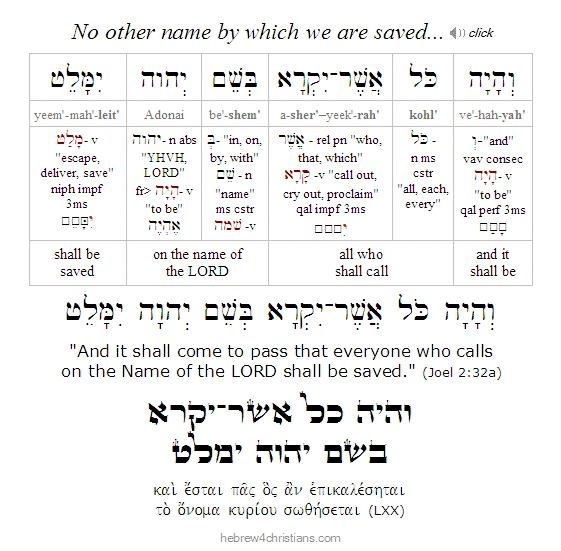 |
Ha'azinu - Yom Kippur Podcast...
09.18.23 (Tishri 3, 5784) In this "High Holiday" audio podcast, I discuss Yom Kippur (Day of Atonement) and its themes, particularly in reference to the atonement given in the Messiah Yeshua, as well as parashat Ha'azinu, the Torah portion we always read between Rosh Hashanah and Yom Kippur. The Ha'azinu is an amazing prophetic song ("shirah") written by Moses just before he died. Written nearly 1,500 years before the advent of Yeshua, Moses foresaw the climatic events of Israel's history -- its past, present, and most notably its future, including the future time of redemption and atonement at the End of the Age.
Shanah Tovah chaverim...
The Ten Days of Awe... ימים נוראים
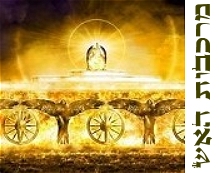
09.17.23 (Tishri 2, 5784) According to tradition, on Rosh Hashanah the destiny of the righteous, the tzaddikim, are written in the Book of Life (סֵפֶר הַחַיִּים), and the destiny of the wicked, the resha'im, are written in the Book of Death (סֶפֶר הַמָּוֵת). However, most people will not be inscribed in either book, but have ten days -- from Rosh Hashanah until Yom Kippur -- to turn to God before "sealing" their fate. On Yom Kippur, then, everyone's name will be sealed in one or the other of the two books. The ten days are therefore called Aseret Yemei Teshuvah (עֲשֶׂרֶת יְמֵי תְּשׁוּבָה) - the "Ten Days of Repentance" - so called because it is thought that repentance at this time affects the divine decree for the coming year...
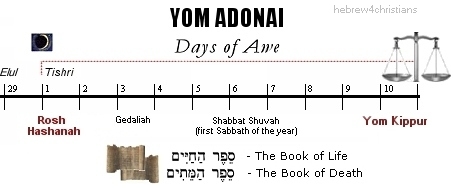 |
As Messianic believers, we affirm that Judgment Day has come and eternal justice was served through the sacrificial offering of Yeshua for our sins (2 Cor. 5:21). Yeshua is the complete fulfillment of the Akedah of Isaac. Our names are written in the Lamb's Book of Life, or Sefer HaChayim (Rev. 13:8). We do not believe that we are made acceptable in God's sight by means of "our own works of righteousness" (Titus 3:5-6), though of course that does not excuse us from being without good works (as "fruit" of the Holy Spirit in our lives). Indeed, professing Christians will stand before the Throne of Judgment to account for their lives (2 Cor. 5:10). "Every man's work shall be made manifest: for the day shall declare it, because it shall be revealed by fire; and the fire shall try every man's work of what sort it is" (1 Cor. 3:13). We should walk in "fear and trembling" (Phil. 2:12). Life is an examination, a test, and every moment is irrepeatable. Every "careless" word we utter will be echoed on before heaven (see Matt. 12:36-37). Our future day of judgment is being decided today...
Hebrew Lesson
Psalm 76:7 reading (click for audio):
Shabbat Shuvah - שבת שובה
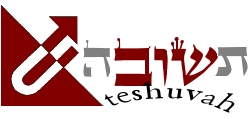
09.17.23 (Tishri 2, 5784) The Sabbath between Rosh Hashanah and Yom Kippur is called Shabbat Shuvah - "The Sabbath of Return." It is called "shuvah" because the Haftarah reading begins, Shuvah Yisrael ad Adonai Elohekha (שׁוּבָה יִשְׂרָאֵל עַד יְהוָה אֱלהֶיךָ): "Return, O Israel, unto the LORD your God" (Hosea 14:2). Since this Sabbath occurs before the solemn hoiday of Yom Kippur (i.e., the Day of Atonement), it is customary to listen to a sermon from an honored Torah sage calling for teshuvah (repentance) at this time. "Seek the LORD while he may be found; call upon him while he is near. Let the wicked forsake his way, and the unrighteous man his thoughts; let him return to the LORD, that he may have compassion on him, and to our God, for he will abundantly pardon" (Isa. 55:6-7).
שׁובה ישׂראל עד יהוה אלהיך
כי כשׁלת בעונך
shoo·vah · yees·rah·el · ad · Adonai · e·loh·hey'·kha
kee · khah·shal'·ta · ba·a·voh·ne'·kha

"Return, O Israel, to the LORD your God,
for you have stumbled because of your iniquity."
(Hosea 14:2)

Download Study Card
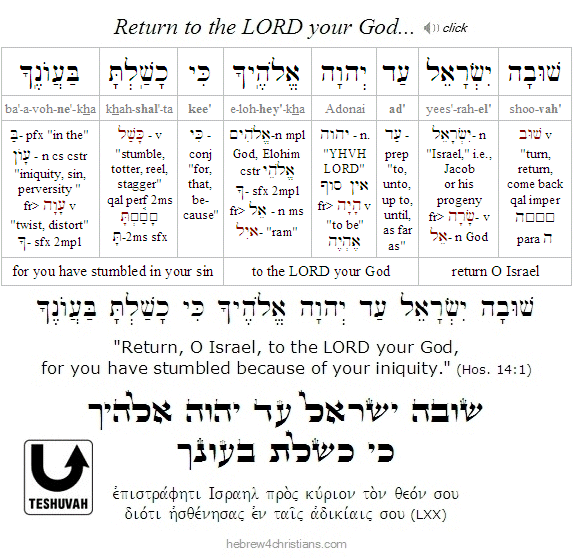
The Prophetic Song of Moses...
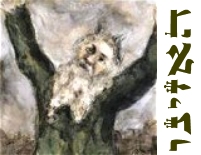
09.17.23 (Tishri 2, 5784) Shanah Tovah, friends! In the last Torah portion we read before Rosh Hashanah (i.e., Vayeleich), Moses finished his long address to the people of Israel and commissioned Joshua to be his successor. The LORD then foretold that after Moses' death the Israelites would "whore after foreign gods" and break covenant with Him. In light of this, Moses was instructed to teach the Israelites a great prophetic song called the "Ha'azinu." This week's portion provides the words of this song, which foretells of Israel's history (past, present, and the future redemption) and that warns the people not to stray from the path that God had commanded. Structured in the form of an "oracle," the Ha'azinu contains Moses' final words of prophecy given to the Israelites before he ascended Mount Nebo to die.
The oracle begins by declaring the righteousness of God. Moses reminded the people of all that God had done for them and then foresaw all the great gifts they would enjoy as God's chosen nation in the promised land. However, instead of thanking God for all these gifts, Moses foresaw that the people would "grow fat" and forsake the LORD for various "no-gods." This would cause God's anger to burn, and Israel's apostasy would eventually lead to defeat at the hand of their enemies and to eventual exile. All the various curses listed earlier in the covenant would then come upon the people: "I will heap disasters upon them; I will spend my arrows on them; they shall be wasted with hunger, and devoured by plague and poisonous pestilence." Indeed, God would have entirely destroyed the Jewish people were it not for His reputation among the nations, lest they should say, "Our hand is triumphant, it was not the LORD who did all this."
Ultimately, however, God will vindicate his justice and mercy before heaven and earth by saving Israel from her enemies and atoning for all her sins. The song ends, "Cry out, O nations, with his people, for he will avenge his servants' blood; he will take vengeance against his enemies, and will atone for his land and his people."
After Moses recited the words of this song, he encouraged the people to take the words of his prophecy to heart and to teach them diligently to their children. "For it is no empty word for you, but your very life, and by this word you shall live long in the land." The portion ends with Moses ascending Mount Nebo so that he could see the Promised Land before he died.
Hebrew Lesson
Deut. 32:1 reading (click for audio):
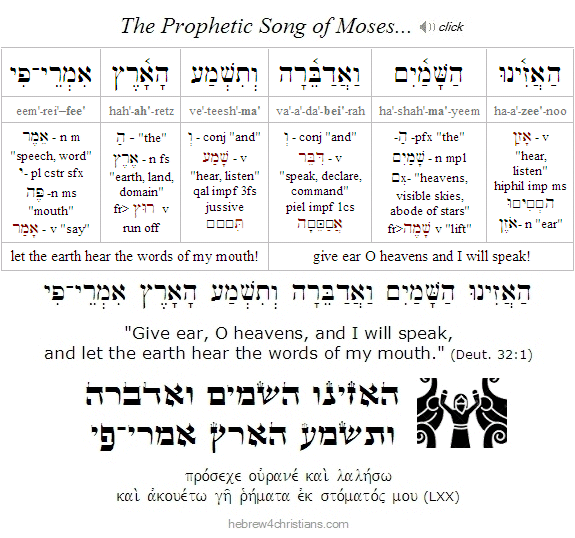 |
We read the Ha'azinu every year near the High Holidays, either just before or just after Yom Kippur. In the Sefer Torah (Torah Scroll), the prophetic song is written in a stylized two-column format with extra spaces. Each line of the shirah (song) is matched by a second, parallel unit (Talmud: Shabbat 103b).
The Ha'azinu reminds us that who we listen to ultimately decides our fate. It begins, "Give ear, O heavens (הַאֲזִינוּ הַשָּׁמַיִם), and I will speak, and let the earth hear (וְתִשְׁמַע הָאָרֶץ) the words of my mouth" (Deut. 32:1). The word ha'azinu (הַאֲזִינוּ) comes from verb azan (אָזַנ), as does the Hebrew word for "ear" (i.e., ozen: אזֶן). The Midrash Rabbah says that the ear (אזֶן) gives life to all the organs of the body. How so? By listening (שׁמע, shema) to the Torah. This idea is repeated in the New Testament: "Faith comes from listening to the Word of God" (Rom. 10:17). The Word of God (דְּבַר־אֱלהִים) is our very life, friends...
Waking up to God's Heart...
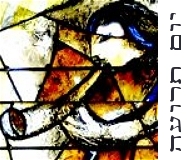
[ Rosh Hashanah begins this evening at sundown and runs through the following day... ]
09.15.23 (Elul 29, 5783) "When they had come together, they asked Him, saying, "Lord, will You at this time restore the kingdom to Israel?" And He said to them, "It is not for you to know times or seasons which the Father has put in His own authority. But you shall receive power when the Holy Spirit has come upon you; and you shall be my witnesses" (Acts 1:6-8).
Now in this context the disciples had supposed that the festival of Shavuot, or "Pentecost," would finally herald the advent of the kingdom of Zion, and their supposition made sense, especially when we remember that Shavuot marked the "climax of Passover," the time when the Spirit would write the Torah upon the heart, and so on (Jer. 31:31-33). Similarly, there are many believers today who look to Yom Teruah (i.e., "rosh Hashanah") to signal the advent of the prophesied "End of Days" leading up to the atonement of national Israel and the second coming of Messiah, and again, this supposition makes sense, especially in light of the miraculous return of Israel to their ancient homeland after thousands of years of exile, the present conditions of the world, and the various prophetic signs that indicate the imminent time of tribulation for world, and particularly for Israel. And yet, despite all that, we are admonished to remember that "no one knows the day or hour" (Matt. 24:36) and that "it is not for you to know the times or seasons which the Father has put in His own authority."
When we consider the "appointed times" of the LORD, we must remember that they are His appointed times, not ours, and therefore our focus should be directed to Him and not on our own understanding (Prov. 3:5-6). God gives us wisdom, and He certainly imparts revelation to us in our daily lives, though we "walk by faith (כִּי בֶאֱמוּנָה נִתְהַלֵּךְ) and not by sight" (2 Cor. 5:7). We surely see prophetic significance in all of the mo'edim (holidays) of Torah, and we can discern the general times and seasons (Matt. 24:32-33; Luke 17:26; Luke 19:44), but nevertheless, "We know in part and we prophesy in part, but when that which is perfect has come, then that which is in part will be done away. For now we see through a glass darkly (i.e., ἐν αἰνίγματι, "in riddles" or by "hints," the Hebrew word is chidot: חידוֹת); but then "face to face" (i.e., panim el-panim: פָּנִים אֶל־פָּנִים): now I know in part; but then shall I know even as also I am known" (1 Cor. 13:9-12).
What is most important is the law of mercy (תורת הרחמים), the very essence of Torah, friends (Deut. 10:12; Micah 6:8; Zech. 7:9; Matt. 23:23). The principle that "the Sabbath was made for man, and not man for the Sabbath" (Mark 2:27) means that our heart connection with our heavenly Father is what is of utmost importance, and that the holidays - though important, meaningful, and significant - are a means to this greater end. Friends, if we miss the "weightier matters" of Torah, we miss the point of Torah altogether... Shalom lekha.
לחג טוב ומתוק בישוע משיח חברים
L'chag tov u'matok b'Yeshua ha'mashiach, chaverim
"To a good and sweet holiday in our Messiah Yeshua, friends!"
Hebrew Lesson
Numbers 29:1 Hebrew reading (click):
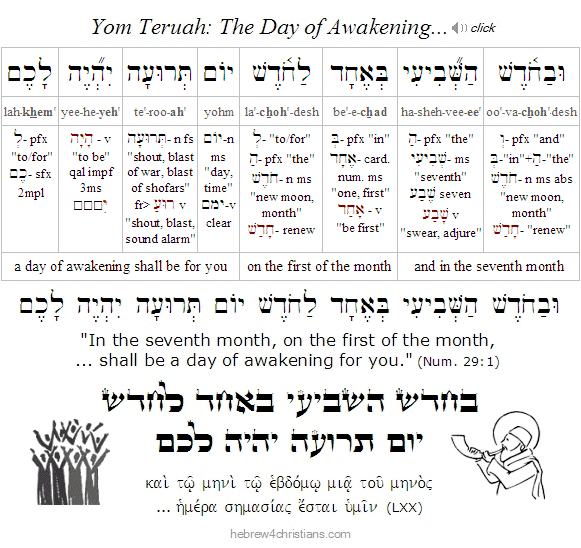 |
Our Creator, Our King...
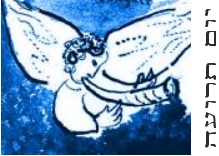
[ Rosh Hashanah begins this evening at sundown and runs through the following day... ]
09.15.23 (Elul 29, 5783) Both the Torah of Moses and the New Testament attest that Yeshua is Elohim (אֱלהִים) -- the Creator of the cosmos: בְּרֵאשִׁית הָיָה הַדָּבָר / "in the beginning was the Word" (John 1:1,14). The Divine Word and Voice cannot be separated from God any more than the Spirit of God can be separated. Yeshua is the Source of all life in the universe: כָּל־הַמַּעֲשִׂים נִהְיוּ עַל־יָדוֹ / "All things were made by Him (John 1:3). The "Word made flesh" is the "image of the invisible God" and the "radiance of the glory of God and the exact imprint (χαρακτήρ, 'character') of his nature" (Col. 1:15). All of creation is being constantly upheld by the word of His power (Heb. 1:3): "All things were created by Him (i.e., Yeshua), and for Him" and in Him all things consist (συνεστηκεν, lit. "stick together") (Col. 1:16-17). As our Creator and Master of the Universe, Yeshua is both our King and our Judge, and therefore Rosh Hashanah (i.e., Yom Teruah) centers on Him.
But in addition to God's power and sovereignty as our Creator, we note that the Scriptures begin and end with the redemptive love of God. Yeshua is the Center of Creation - it's beginning and end. As it is written: אָנכִי אָלֶף וְתָו רִאשׁוֹן וְאַחֲרוֹן ראשׁ וָסוֹף / "I am the 'A' and the 'Z,' the First and the Last, the Beginning and the End" (Rev. 22:13). Indeed, Yeshua is מֶלֶךְ מַלְכֵי הַמְּלָכִים / Melech Malchei Hamelachim: The "King of kings of kings." He is LORD of all possible worlds -- from the highest of celestial glories to the very dust of death upon a cross... יְהִי שֵׁם יהוה מְברָךְ / yehi shem Adonai mevorakh: "Let the Name of the LORD be blessed" forever and ever (Psalm 113:2).
Hebrew Lesson
Revelation 4:11 reading (click for audio):
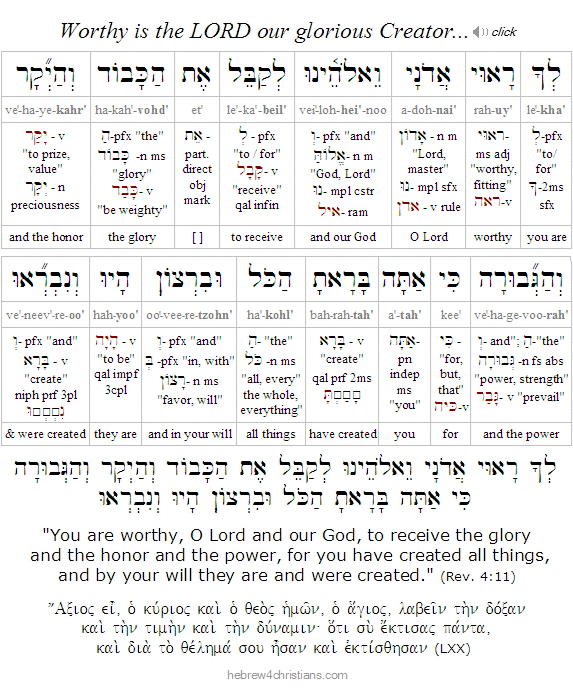 |
The central point of all true Torah, then, is the redemptive love of God demonstrated in the "first and last" principle of sacrificial life. This was prefigured in the original paradise when Adam and Eve were clothed by the lamb sacrificed for their transgression (Gen. 3:21), and the theme continues throughout the Torah, for example, in the account of the sacrifice of Isaac (we blow the shofar on Rosh Hashanah to recall the Lamb of God given in his place), in the visions of Jacob, in the commissioning of Moses, in the redemption from death by the blood of the sacrificed lamb in Egypt, and by the climactic revelation of the altar given at Sinai (i.e., the Tabernacle). Just as the "korban tamid" of the Temple (i.e., the continual sacrifice of the lamb upon the altar) recalled the original Passover and foretold of the Lamb of God to come, so Yeshua, the "Living Torah," embodied the Sacrificial Life itself, the true Lamb of God that was offered upon the stigma of the cross, to demonstrate God's infinite condescension, mercy and love that redeems the world from sin and death. Just as there is no Passover apart from the Lamb, so there is no "Rosh Hashanah" or "Yom Kippur" apart from God's atoning love given in the Messiah... Now THAT is something for us to make a "teruah," or a "joyful noise" in praise to our God!
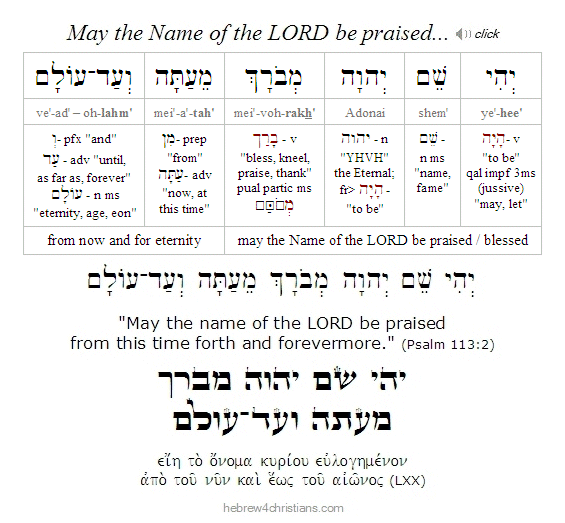 |
Note: For more on this, see "High Holidays and the Gospel."
Rosh Hashanah Chadash...

09.14.23 (Elul 28, 5783) In Jewish thinking, Rosh Hashanah commemorates the creation of Adam and Eve, and therefore it may be regarded as their "birthday" of sorts. However, on the soon after Adam and Eve were created, they disobeyed God and were sent into exile from the orchard, and therefore Rosh Hashanah commemorates humanity's rebellion against God as well... As such, this holiday has an inherent ambivalence about it. On the one hand we rejoice over the gift of life and acknowledge God as our Creator and King (the sound of the shofar is intended to remember the coronation of God as our King), while on the other hand we tremble over God as our holy and righteous Judge. Consequently, in Jewish tradition Rosh Hashanah is associated with the Day of Judgment (יוֹם הַדִּין) when God decrees who will be "written in the Book of Life (סֵפֶר הַחַיִּים)" for another year of life. According to the sages, we can "affect" the divine decree by turning to God (i.e., teshuvah: תְּשׁוּבָה), by honestly accounting for our actions (i.e., cheshbon ha-nefesh: חֶשְׁבּוֹן הַנֶּפֶשׁ), and performing acts that demonstrate penitence (such as making amends to others and giving charity). The notion that we can merit God's favor during this time is clearly expressed by Abraham Heschel, who wrote, "No word is God's final word. Judgment, far from being absolute, is conditional. A change in man's conduct brings about a change in God's judgment" (The Prophets, 194).
The Scriptures clearly state that "it is appointed for man to die once, and after that comes judgment" (Heb. 9:27), and they further warn that on the Day of Judgment, anyone's name not written "in the Book of Life of the Lamb who was slain" (בְּסֵפֶר חַיֵּי הַשֶּׂה הַטָּבוּחַ) will be thrown into the lake of fire (Rev. 13:8, 20:15). Indeed, Yeshua Himself is the none other than the Judge of mankind to whom every knee shall one day bow (Isa. 45:22-23; Rom. 14:11; Phil. 2:10). Yeshua is the Judge of all the earth (John 5:22; 12:48; Acts 10:42, 17:31; 2 Thess. 1:7-10; Rev. 20:11-15), including the judge of all those who profess to obey Him (Rom. 14:12; 2 Cor. 5:10; 2 Tim. 4:1; Matt. 7:22-23). As Messianic believers, we maintain that our personal "Judgment Day" has come and justice has been served through the sacrificial offering of Yeshua for our sins (2 Cor. 5:21). He is the perfect fulfillment of the Akedah of Isaac, and the sound of the shofar recalls the sacrifice of the promised seed. However, even though we believe that we are made acceptable in God's sight solely by the finished work of the Messiah (Titus 3:5-6), we understand that we will one day face our own personal judgment. Even in the glorious light of the cross, we all must give account for our lives (2 Cor. 5:10): "Every man's work shall be made manifest: for the day shall declare it, because it shall be revealed by fire; the fire will test (δοκιμάζω) what kind of work each has done" (1 Cor. 3:13). Yeshua is the Judge of all people, both for those who are trusting in Him and for those who spurn his salvation.
Hebrew Lesson
Isaiah 45:22-23 reading (click):
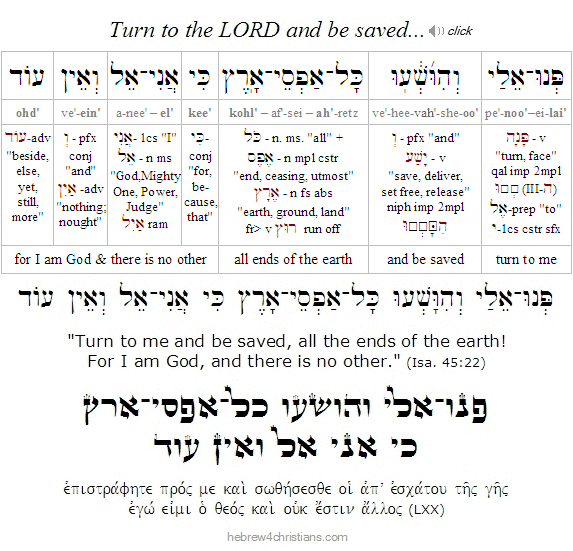 |
Let's return to the "birthday" of Adam and Eve and consider it in light of the birthday of Yeshua, that is, his advent as the "Son of Man," our "Second Adam," and the Savior of the world. Adam was a pattern of the king to come (Rom. 5:14). The Apostle Paul presents him as "the first man," adam ha-rishon (אָדָם הָרִאשׁוֹן), while he calls Yeshua "the second man," or adam ha-sheni (הָאָדָם הַשֵּׁנִי). Adam is regarded as "first" in the sense of temporality and legal succession as God's vice-regent for the physical order, whereas Yeshua is regarded as "second" in the sense of being the climactic expression of God's redemption of that lost regency in the advent and victory of the Messiah.
Adam was created by a direct act of God -- not by any kind of "reincarnation," as it says, "Then the LORD God formed (יֵצֶר) the man of dust from the ground and breathed (נָפַח) into his nostrils the breath of life (i.e., nishmat chayim: נִשְׁמַת חַיִּים), and the man became a living soul (i.e., nefesh chayah: נֶפֶשׁ חַיָּה)." The word yetzer ("formed") refers to something shaped, like pottery fashioned by the hand of a potter. Just as a potter purposes a shape before forming an object, so God consciously intended the image of man. Regarding the impartation of the soul, the sages use the analogy of a glassblower who creates a glass vessel. Just as a glassblower blows into a tube to form a vessel from molten glass, so the "breath of God" (i.e., neshamah: נְשָׁמָה) becomes spirit (i.e. ruach: רוּחַ) to form the human soul (i.e., nefesh: נֶפֶשׁ). The Targum states that God breathed into Adam the ability to think and to speak. In other words, thought and speech are two primary characteristics of the image (tzelem) and likeness (demut) of God. The very first creative act of God, then, was to impart the divine "image" to mankind, which primarily involved giving people the ability to experience God's awesome transcendence, to reason, to use language, etc.
Adam was made "like" God, but his soul was created, that is, it was not eternal or preexisting. Only Yeshua is the "Word made flesh," the "image of the invisible God," and the "radiance of the glory of God and the exact imprint (χαρακτήρ, 'character') of his nature" (Col. 1:15). All of creation is being constantly upheld by the word of His power (Heb. 1:3): "All things were created by Him (i.e., Yeshua), and for Him" and in Him all things consist (συνεστηκεν, lit. "stick together") (Col. 1:16-17). The miracle of the incarnation - the Absolute Paradox - is that the Creator Himself "emptied himself" by freely choosing to be clothed "in the likeness of sinful flesh" to become a sacrificial offering for our sin so that the righteousness of God could be fulfilled in us (Rom. 8:3-4). It is for this reason that the Word of God became flesh and "tabernacled" with us (Isa. 45:22-23; Phil. 2:6-7; John 1:1,14).
Both Adam, the first man of the earth, and Yeshua, the second man of heaven, were "sons of God," born sinless and in unhindered communion with God, and both were subsequently tested by God (Gen. 2:16-17; Matt. 4:1; Heb. 4:15). The first man failed the test, however, which led to the fatal disease of sin infecting his progeny (Rom. 3:23; 5:12-ff), whereas the second man passed the test which led to eternal healing and life to his progeny (1 Cor. 15:21-23; Rev. 2:7). Yeshua is called the "second man" in the sense that he was God's beginning for a recreated humanity, and through him humanity would be restored to the paradise of God. "The life was in Him, just as it was originally in the first Adam (John 5:26). Yeshua is called the "Son of Man" (בֶּן־הָאָדָם), the new High Priest of humanity, who comes "with the clouds of heaven" to offer up his life for our reconciliation with God (Isa. 53:5; 1 Pet. 3:18; Heb 2:9). Yeshua's sacrificial death destroyed the power of death and undid the curse that befell fallen human nature (Rev. 22:3). Just as Adam is the "federal head" of the (fallen) human race, so Yeshua is the "federal head" of a new creation of redeemed humanity (Eph. 5:23). Through Adam comes the transmission of physical human life (i.e., the "Adamic nature"), whereas through Yeshua comes the transmission of eternal life (i.e., the "new nature" given through divine inheritance). Yeshua is the "first fruits" from the dead - a new "type" of resurrected human life that is restored to heaven's fellowship. Adam was given dominion over creation (Gen. 1:26), whereas Yeshua is Adon ha-kol (אֲדוֹן הַכּל), the LORD over all (Acts 10:36).
If the title "Son of man" (בֶּן־הָאָדָם) reveals the continuity of humanity in Yeshua with the humanity represented by Adam, it also reveals the new step that humanity has gained in the victory mediated to us in the "Man, Yeshua the Messiah" (1 Tim. 2:5). The incarnation of Yeshua was intended to lift us up from the old, Adamic nature, to be partakers of the divine nature, and therefore Yeshua is called "the firstborn (הַבְּכוֹר) among many brethren" (Rom. 8:29). Yeshua is not only called the "Second Man," the founder and head of a new race, but also "the Last Adam" (i.e., adam ha-acharon: אָדָם הָאַחֲרוֹן) because there is no other man to succeed Him, and His victory is entirely sufficient for our everlasting deliverance.
Thus it is written, "The first man Adam became a living being"; the last Adam became a life-giving spirit. But it is not the spiritual that is first but the natural, and then the spiritual. The first man was from the earth, a man of dust; the second man is from heaven. As was the man of dust, so also are those who are of the dust, and as is the man of heaven, so also are those who are of heaven. Just as we have borne the image of the man of dust, we shall also bear the image of the man of heaven (1 Cor. 15:45-49). "For as in Adam all die, so also in Messiah shall all be made alive" (1 Cor. 15:22). The "new seed" of life given to us in Yeshua makes us into a "new creation" (בְּרִיאָה חֲדָשָׁה) that fully restores the defaced image of God within us (2 Cor. 5:17). We are "more than conquerors" (ὑπερνικῶμεν, lit. "hyper conquerors) through Him that loved us (Rom. 8:37).
Just as God produced a bride from the wound he made in the sleeping Adam (Gen. 2:22), so a spiritual bride was produced when Yeshua suffered the "sleep of death" for everyone upon the cross, as evidenced by his pierced side after his death (John 19:34). Just as Adam's dream was fulfilled in Eve, so Yeshua's is fulfilled in the "bride of Messiah," his called-out assembly that follow him (Eph. 5:27). Human beings by nature are all connected with the first Adam as the "legal head" of the human race and are thereby subject to the sentence of death that was pronounced on him; however, all who are connected with the Second Adam are given the free gift of God's righteousness, and "have passed from death to life" (Col. 1:14; Rom. 5:17; 1 John 3:14).
It is customary to partake of a new food item, usually a new fruit, during the Rosh Hashanah Seder, which symbolically can represent for us the first fruits of Yeshua and our new creation in Him. For example, when we say, "May it be your will, LORD our God and God of our fathers, that our merits be numerous as the seeds of a pomegranate," may we understand this to be in reference to the fruitfulness we now have in the new life our Messiah gives....
A lot more could be said on this subject, of course, but this will have to suffice for now. Just as God opened Adam's eyes on the very first Rosh Hashanah, so our eyes will be opened when we are called up to obtain our inheritance in the Messiah during the time of the rapture (1 Thess. 4:16-17). This is the great teruah and sound of the shofar to come (1 Cor. 15:51-53). Meanwhile, "The God of peace will soon crush Satan under your feet. The grace of our Lord Yeshua the Messiah be with you" (Rom. 16:20).
 |
The Judgments of God...
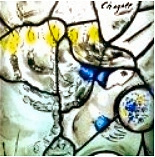
[ Rosh Hashanah begins sundown on Friday September 15th this year... ]
09.14.23 (Elul 28, 5783) The central theme of Rosh Hashanah is to recall that God is our Creator, our King, and therefore our righteous Judge. Since our souls were created by God, we have the duty to serve Him as our King and live before Him as our Judge. Since the LORD is the God of Truth (יהוה אֵל אֱמֶת) who cannot attest to a lie, every person who has ever lived will necessarily face judgment one day (Heb. 9:27).
There is a midrash about a dialog between Adam and God after Adam's banishment from the Garden of Eden. Adam feared that all humans would later blame him for their mortality, but God replied, "Don't worry about the others. From now on, each soul will be responsible for giving account of his or her life. Each person is required to write his or her own 'Book of Life.' On the Day of Judgment, I simply ratify what has been written."
Indeed, the Scriptures reveal that there are heavenly "books" that contain detailed records of all that we did (or did not do) during our time here on earth: "And I saw the dead, great and small, standing before the throne, and books were opened. Then another book was opened, which is the Book of Life (סֵפֶר הַחַיִּים). And the dead were judged by what was written in the books, according to what they had done" (Rev. 20:12).
Today you are writing the "Book of your Life." Every action you make - every thought, every decision, every deed - is being "recorded" in the archives of Heaven itself. When your soul returns to account for itself before God one day, this "book" will be opened before the Judge of the Universe. As Yeshua said, "on the Day of Judgment (יוֹם הַדִּין) people will give account (ἀποδίδωμι, lit. "give back") every idle word they speak (Matt 12:36). The story of your life will be replayed before all of heaven itself...
There are actually several different judgments described in the Scriptures. For instance, there is: 1) the judgment of believers, sometimes called the "judgment seat of Messiah" (2 Cor. 5:10; Rom. 14:10); 2) the "sheep and goats" judgment at the end of the Great Tribulation period (Matt. 25:31-36), and 3) the "Great White Throne" judgment at the end of the Millennial Kingdom period (Rev. 20:11-15). Common to each of these judgments is the inevitability that all men, both living and dead, saved and unsaved, will ultimately give an account of their lives before Yeshua as the true Judge (John 5:22,27; Rom. 14:11-12; Phil. 2:10-11, cp. Isa. 45:22-23).
Some Christians tend to think that they will not face judgment for their lives here on earth because they are "saved." And while it is gloriously true that Christians will not face condemnation with the world, nonetheless each follower of Yeshua will be required to give account for how he "walked out" his salvation in this world. "For we must all appear before the judgment seat of Messiah (τοῦ βήματος τοῦ Χριστου) so that each one may receive what is due for what he has done in the body, whether good or worthless" (2 Cor. 5:10). It's important to understand that this future judgment is not for the sins of a believer, since the sacrificial death of Yeshua paid the full price for all our sins at the cross (Col. 2:13-14). There is no condemnation to those who belong to Yeshua (Rom. 4:7-8; 8:1; John 5:24). We are justified by faith and now have peace with God because of what Yeshua has done for us (Rom. 5:1). Instead of a judgment regarding our identity (and security) as a child of God, the future judgment of Messiah concerns "giving what is due," or rewarding acts of service done during our allotted time here on earth (i.e., in our mortal state).
To illustrate what this judgment will be like, Paul used the analogy of an elevated platform (or "bema," βῆμα) that held a judge's seat in an ancient Greek sports arena. Athletes would stand before the bema to receive awards based on how well they ran the race. All those who finished the race would pass before the bema, but only those who ran well would receive an award (often an honorary crown or victory wreath). In other words, the believer's judgment will resemble an "awards ceremony" where those who ran the race well would be honored (1 Cor. 9:24-26). The Bema of Messiah is a place where rewards will be given - or lost - depending on how well we have walked out our faith in this life... While some Christians "shall suffer loss" (of rewards), nevertheless, each person attending this judgment "shall be saved" (1 Cor. 3:14-15). Again, this is a believer's judgment before the Messiah based on his or her personal surrender to His will...
Yeshua taught that "everyone who hears these words of mine and does them will be like a wise man who built his house on the rock" (Matt. 7:24). Though the house will be tested by storm and by flood, it will not fall because it had been founded upon the rock... Likewise the Apostle Paul warned us to construct our lives on the solid foundation of the sacrificial work of Yeshua our Messiah (1 Cor. 3:11-15). "Let each one take care how he builds upon it." Choose your building materials wisely. "Wood, hay, and stubble" represent all the "worthless" efforts we make, including those based on self-effort or "religion." Gold, silver, and precious stones represent the work of the Holy Spirit in our hearts. But every believer's works will be tested: "Each one's work (ἔργον) will become manifest, for the Day will disclose it, because it will be revealed by fire, and the fire will test (δοκιμάσει) what sort of work each one has done" (1 Cor. 3:13). Notice that Paul likened the believer's judgment to a fire that tests the quality of materials used to build a house. Good deeds will survive through the fire, whereas worthless (φαῦλος) deeds will be burned up. Again, it's important to understand that the "testing fire" mentioned here is not one of eternal judgment, but rather pictures the burning away of the "worthless matters" (φαῦλος) of this life to reveal what is eternally abiding...
But understand that this "testing fire" is not something we will experience in the far off future. It is not some sort of "purgatory" experience. Today you are in the midst of testing, writing the "Book of your Life," and that includes your refinement for receiving future rewards... The Apostle Peter speaks about the present sorrow we may face through "various trials, so that the tested genuineness of your faith -- more precious than gold that perishes though it is tested by fire -- may be found to result in praise and glory and honor at the revelation of Yeshua the Messiah" (1 Pet. 1:6-7). The suffering we sometimes experience in this life is therefore a refining fire, intended to strengthen our faith and bring glory to the Lord. "For it is time for judgment to begin at the household of God; and if it begins with us, what will be the outcome for those who do not obey the gospel of God?" (1 Pet. 4:17). God tests our hearts so that we will be able to stand before Him without shame on the day of our judgment. "Just as we have borne the image of the man of dust, we shall also bear the image of the man of heaven" (1 Cor. 15:49).
Every one of us will give account of our lives. In Matthew 25:14-30, Yeshua used a parable to indicate what this reckoning will be like. After distributing "talents" to three different servants, a certain "employer" left on a long journey. When he finally returned, he wanted his servants to account for the use of their talents, so he called them to "settle accounts with them" (Matt. 25:19). This phrase "settle accounts" (συναίρει λόγον) means to compare things, to look closely at the records to determine profit or loss to a business, and is therefore similar to the idea of a financial audit. In the parable, the employer considered the state of his business and then called each of his servants in to stand before him for a summary review. Likewise, each of us will be called to stand before the Lord to give account for his or her life. Those who used their talent for the promotion of the Kingdom will be rewarded, but those who wasted their opportunities will not (1 Cor. 3:12-15).
Ultimately each of us will have to confess the truth (ὁμολογέω - "say the same thing") about who we are and what we've become. We can begin that process now through confession of our sins: "For if we would judge ourselves, we should not be judged" (1 Cor. 11:31). If we refuse to do this, we may be "chastened" (παιδευόμεθα) so that we may not be condemned along with the world (1 Cor. 11:32; Heb. 12:5). The image of "testing fire" is a symbol of the examination of our lives by the LORD Himself. "For we shall all stand before the judgment seat of God (τῷ βήματι τοῦ θεοῦ); for it is written, 'As I live, says the Lord, every knee shall bow to me, and every tongue shall confess to God.' So each of us shall give account of himself to God" (Rom. 14:10-12). Ultimately, this confession of the truth is not optional for anyone. For the follower of the Messiah, such confession produces salvation: "for with the mouth one confesses and is saved" (Rom. 10:10). But for those who refuse to undergo self-examination and therefore refuse to confess the truth about their need for salvation, there is the Lord's own reciprocal confession: "Then I will confess to them (ὁμολογήσω αὐτοῖς), 'I never knew you; depart from me, you workers of lawlessness' (Matt. 7:23).
That is why we are commanded: "Examine (πειράζω) yourselves to see whether you are in the faith. Test yourselves (ἑαυτοὺς δοκιμάζετε). Or do you not realize that Yeshua the Messiah is in you, unless indeed you are proved to be rejected (ἀδόκιμος)" (2 Cor. 13:5). This, of course, is the critical test, since without the life of Messiah living within us, we will have no "works of righteousness" that will stand the test. After all, good works are an outflow of the Holy Spirit, and never the result of human effort. However, it is up to us whether we will "be filled with the Spirit" and yield to God's guidance in our lives (Eph. 5:18). Note that the verb "be filled" (πληροῦσθε) is: 1) present tense (i.e., denoting continuous action), 2) imperative ("you must...), and 3) passive voice (i.e., "you must let yourself be filled"). In other words, you must continually let yourself be filled by the Holy Spirit. This is the test of faith, to let Messiah reign within your heart... "Work out your own salvation with fear and trembling, for it is God who works in you..." (Phil. 2:12-13).
We are instructed to practice self-examination (i.e., cheshbon ha'nefesh: חֶשְׁבּוֹן הַנֶּפֶשׁ) before celebrating the "Lord's Table" (i.e., the commemoration of Yeshua's last Passover Seder that prefigured His sacrifice as the Lamb of God who takes away the sins of the world). "Let a person examine himself first (δοκιμάζω - test for authenticity), and then he may eat of the bread and drink from the cup. For anyone who eats and drinks without discerning the body eats and drinks condemnation (κρίμα) on himself" (1 Cor. 11:28-29). Now while it is assuredly true that we should search ourselves in remembrance of our Savior's sacrifice, the practice of self-examination and confession should be part of our everyday lives as followers of the Messiah. The unexamined life -- especially as a Christian -- is not worth living, and the practice of suppressing the truth about our sinful condition can lead to self-deception and even death itself (1 Cor. 11:30). "But if we would judge ourselves, we should not be judged by the Lord" (1 Cor. 11:31). "If we say we have no sin, we deceive ourselves, and the truth is not in us; if we confess our sins, he is faithful and just to forgive us our sins and to cleanse us from all unrighteousness" (1 John 1:7-8). "Therefore, confess (ἐξομολογέω, lit. 'confess out') your sins to one another and pray for one another, that you may be healed" (Jas 5:16).
Life is a serious business, friends, and it is also a test. It is "God who tests our hearts" (1 Thess. 2:4). It is our Lord Yeshua who said, "I am he who searches hearts and minds, and I will repay each of you according to your deeds" (Rev. 2:23). We have one opportunity to live for Yeshua in this life, and the fact that we will each face a day of judgment before the LORD should sober us to sanctity. God holds us responsible for what we think and believe (Acts 17:30-31), and this implies that we have a moral and spiritual duty to think clearly and not abuse our minds (Phil. 4:8; Rom. 12:2). It is the fear of the LORD (יִרְאַת יהוה) that is the beginning of wisdom and knowledge (Psalm 111:10; Prov. 1:7; 9:10). "By the fear of the Lord men depart from evil" (Prov. 16:16). The fear of the LORD is hatred of evil, and therefore, those who love the LORD are called to hate evil (Prov. 8:13; Psalm 97:10). Sin always cheats us of the good. "Blessed is the man that endures testing: for when he has been approved (δόκιμος), he shall receive the crown of life (τὸν στέφανον τῆς ζωῆς) that the Lord has promised to those who love him" (James 1:12).
So are you living in awareness that life is a test and that you will one day stand before Yeshua to give account for every detail of your life? Are you mindful of eternity and of the inevitability of your own personal judgement day? If this causes you anxiety, what do you need to do differently in your life so that you may have confidence for that day? "Therefore we labor... to be well pleasing to Him" (2 Cor. 5:9). We must strive to "lay aside every weight, and the sin which doth so easily beset us" in order to be unhindered in our walk with God (Heb. 12:1). God promises to help us as we endeavor to do his will (1 John 5:14).
There is great glory coming your way, chaverim! May the LORD God help you "to walk in a manner worthy of God, who calls you into his own kingdom and glory" (1 Thess. 2:12). May you be "fully pleasing to him, bearing fruit in every good work and increasing in the knowledge of God. May you be strengthened with all power, according to his glorious might, for all endurance and patience with joy, giving thanks to the Father, who has qualified you to share in the inheritance of the saints in light" (Col. 1:10-12). Amen, and Shanah Tovah!
Hebrew Lesson
Jeremiah 17:10 reading (click for audio):
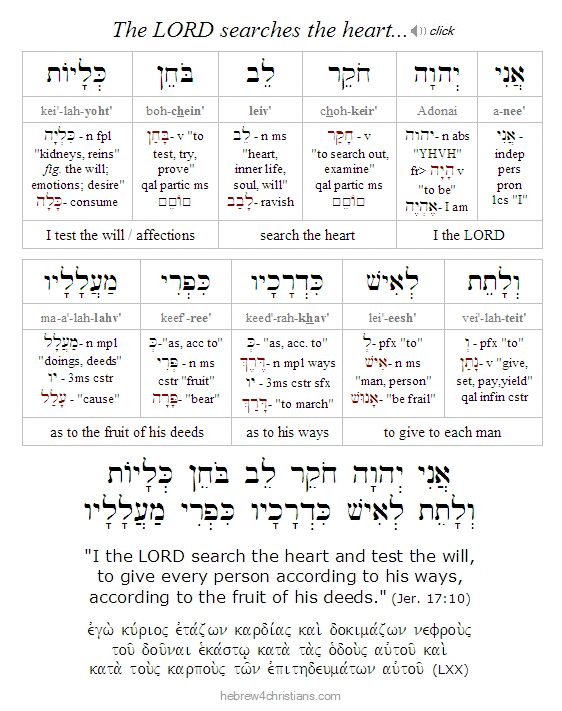 |
Postsript: There is another "book," the Lamb's Book of Life, and all whose names are written therein are imputed the righteousness of Yeshua as the Savior and Sin-Bearer upon the cross, for he became a curse for us so that we become the righteousness of God in Him (2 Cor. 5:21; Gal. 3:13). More on this later, as we approach Yom Kippur...
Teshvuah of Wisdom....
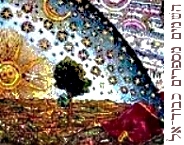
[ The following is related to the month of Elul and the theme of teshuvah (repentance)... ]
09.13.23 (Elul 27, 5783) Moses prayed to God: "teach us to number our days," that is, help us understand how to make our days count for eternity, to have a weight of glory that will shine in the world to come... The sages say on the day of death, one considers one's life as if it had been a single day. Life goes by so quickly, and we never know when our personal Rosh Hashanah will come. "No one knows the day or hour..." That's why it is so vital to be healed and to turn to God while there is still time. So turn today and bacharta ba'chayim – "choose life!" "For this commandment (of turning to God in teshuvah) is not hidden from you, and it is not far away. It is not in heaven... nor across the sea.... Rather, the matter is very near you - in your mouth and your heart - to do it" (Deut. 30:11-14; cp. Rom. 10:8-13).
לִמְנוֹת יָמֵינוּ כֵּן הוֹדַע
וְנָבִא לְבַב חָכְמָה
leem·noht · yah·me'·noo · kein · hoh·da
ve·nah·vee · le·vahv · chokh·mah

"Teach us to number our days
that we may get a heart of wisdom."
(Psalm 90:12)

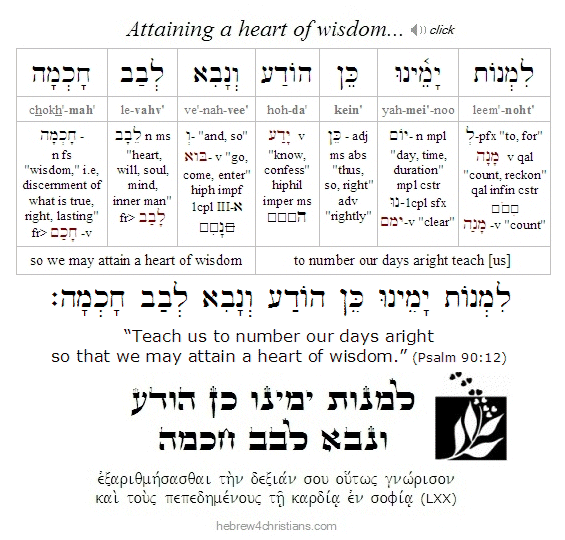
Despite the frailty and brevity of our days, may it please God to shine the power of His radiance upon us and to establish our works for His praise. May He help us to "number our days" so that we may obtain levav chokhmah (לְבַב חָכְמָה) - a heart of wisdom to live according to His will (James 1:5). Above all else, may the "God of our Lord Yeshua the Messiah, the Father of Glory (אֲבִי הַכָּבוֹד), impart to you a spirit of wisdom and of revelation in the knowledge of Him, having the "eyes of your hearts" (ὀφθαλμοὺς τῆς καρδίας) enlightened, that you may know what is the hope to which he has called you" (Eph. 1:17-18). May you be strong, resolute, and fully focused on our LORD, chaverim. Amen.
Comfort from the Shepherd...
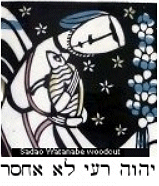
09.13.23 (Elul 27, 5783) The Spirit of the Lord comforts and reassures those who trust in Him: "My sheep hear my voice, and I know them, and they follow me. And I give them eternal life (חַיֵּי עוֹלָם), and they will never perish - no, never! - and no one will snatch them out of my hand" (John 10:27-28). Note that the Greek grammar in this verse uses a "double negation," which is the strongest way to deny something. In other words, if the question were asked, "Will one of these sheep perish?" the answer is emphatic: "No, no, it will never happen! It is unthinkable!" Indeed all those who belong to Messiah "shall never, ever perish - not into eternity (εἰς τὸν αἰῶνα)." It is an eternal certainty that you who are trusting in Yeshua will never perish, and no power in heaven or earth will be able to take you out of God's hand... "Surely goodness and mercy shall pursue you all the days of your life, and you shall dwell in the Presence of the Lord forever (Psalm 23:6).
Regarding the certainty of salvation Yeshua said: "I tell you the solemn truth, the one who hears my message and believes in the One who sent me has (i.e., ἔχει, present active indicative) eternal life and will not be condemned, but has passed over (i.e., μετά + βαίνω, lit., "crossed over" [עָבַר]) from death to life" (John 5:24). Note that the verb translated "has passed over" (μεταβέβηκεν) is a perfect active that expresses completed action: "this one has already passed over from death to life." In other words, it is an accomplished spiritual reality though it is only experienced as we surrender to the love and grace of God. As the apostle Paul later summarized: "For it is by grace you have been saved (i.e., σεσῳσμένοι, a perfect passive participle that denotes completed action done on your behalf with effects that continue to the present) through faith, and this not from yourselves, it is the gift of God, not a result of works, so that no one may boast" (Eph. 2:9-10). Ultimately, salvation is a question about who you really are, not about what you do....
God does not want us uncertain or unsure of His great love for us. A fearful believer explained that he was anxious about his acceptance before heaven. When he was asked to define "salvation," he answered, "freedom, deliverance, rest, peace." So you think fear will help you do away with your fear? You are fearful of the idea of freedom from fear?
"Be strong and of good courage" - chazak ve'ematz (חֲזַק וֶאֱמָץ). The LORD God promises "never to leave you nor forsake you," and to be with you wherever you go (Josh. 1:5,9; Heb. 13:15, Psalm 139; Matt. 28:20). In the Greek New Testament the wording of Hebrews 13:15 is highly emphatic: "Not ever will I give up on you (οὐ μή σε ἀνῶ); no, not ever will I leave you behind (οὐδ᾽ οὐ μή σε ἐγκαταλίπω)." May you hear the voice of the Good Shepherd calling you, and may He forever keep you under His watchful care. Amen.
Hebrew Lesson
Joshua 1:9 reading (click for audio):
Broken and Remade...
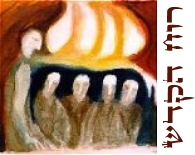
09.12.23 (Elul 26, 5783) No one wants to say they are needy, broken, weak, and so on, and indeed such a confession is blasphemy to the heart of the proud. The truth, however, is that we are indeed all these things, and Yeshua told us we were blessed if we understood this (Matt. 5:3-6). There is great danger to pretend you are strong and capable of living life on your own terms, since eventually you will be blindsided by the truth about your condition. On the other hand, the confession of our weakness opens the way to God's power, as Yeshua said to Paul in his affliction: "My grace is sufficient for you for my power is made perfect in weakness" (2 Cor. 12:9). Paul came to see that the various trials and afflictions in his life taught his profound dependence on God: "for when I am weak, then I am strong."
Access to this grace, however, comes at the expense of our pride. We must humbly confess who and what we are, and therefore we must entirely abandon hope in our own strength and virtues. "We are only as sick as the secrets we keep," especially those secrets we keep from ourselves - those self-deceptions and illusions we use to defend ourselves.
Suppose, for instance, that you have the bad habit of complaining and even cursing when you are beset by troubles, and you want to stop doing these behaviors. You may resolve to be more optimistic and grateful, or you may read self-help books -- or even take anger management classes -- but nothing will do you any lasting good until you know "in your bones" that you are powerless to change your heart. That is the first step to being set free. Or suppose that you are habitually unhappy, troubled, anxious, and in pain, yet you want to find inner peace and joy. Again, apart from the miracle of God there is no lasting remedy. You must be honest with yourself and confess the truth of your condition, asking God to do in you what you cannot do for yourself. As Yeshua said: "What is impossible with man is possible with God." So in this way God uses your sins to correct you or bring you to the end of yourself, and in that way awareness of your personal weakness is a blessing from God.
Recall that Yeshua said out of the heart proceed "evil thoughts," or more literally, "evil dialogs" or reasoning within yourself (διαλογισμοι πονηροι). You are tethered to yourself - you cannot escape yourself - yet a divided house cannot stand. Attempting to relate to yourself apart from a relationship with God leads to ongoing despair -- either the despair of resigning into yourself or else the despair of fleeing from yourself -- but either way, to a condition of anxiety derived from not being grounded in the life of God... "Unless a seed of wheat falls to the ground and dies, it abides alone..." (John 12:24). Yeshua is the source of all life, and we find nourishment, strength, and the meaning of who we are as we connect with him. By faith we affirm: "I have been crucified with Messiah, and it is no longer 'I' who live, but Messiah who lives in me" (Gal. 2:20). There is a new self that comes from above, known only in spiritual relationship with the Savior. The miracle of the exchanged life comes as we surrender to the truth of what God does for us (2 Cor. 5:17). That is the essence of the gospel, "the power of God for salvation for all who believe" (Rom. 1:16). Therefore we do not attempt to crucify ourselves, or labor to reform our corrupted lower nature, but we instead accept that we already have been crucified and healed by the mercy and miracle of God. We clothe ourselves in the robes of His righteousness as we celebrate God's redeeming love for our lives. Only then are we miraculously empowered by the Spirit to truly "love the LORD and keep his charge" (see Deut. 11:1).
The gate is narrow that leads to life, and few there be that find it (Matt. 7:14). That is part of the offense of the cross, after all - the confession you are lost, in darkness, and in need of salvation. Few receive this truth into their hearts because they want to be in control and refuse to let go; few regard their weakness as a blessing that opens the gate to God's strength. Let the weak say "I am strong" because of what the LORD has done. God's grace is sufficient, and his strength is perfected in weakness: "So then, I will boast most gladly about my weaknesses, so that the power of Messiah may reside in me" (2 Cor. 12:9). "I can do all things through the Messiah who strengthens me" (Phil. 4:13). Amen.
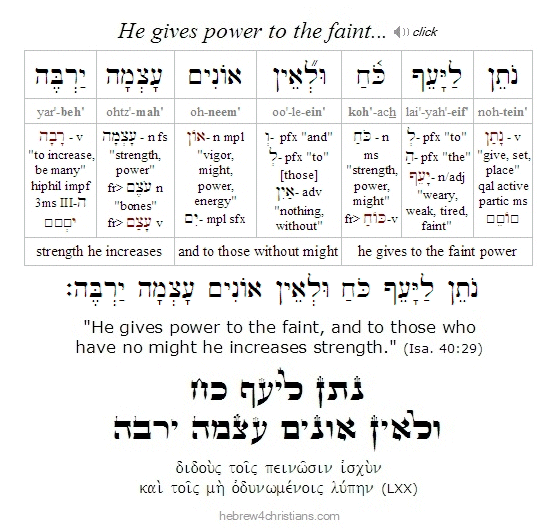 |
From Faith to Faith...

09.12.23 (Elul 26, 5783) If you were ask to God for just one thing, what would it be? Our deepest yearnings are like prayers. Whatever the heart genuinely seeks, it will find. The person who pursues righteousness will find it, just as evil comes to the person who searches for it (Prov. 11:27). Therefore the voice of wisdom cries out, "I love those who love me, and those who seek me diligently find me" (Prov. 8:17), and the prophet shouts, "Seek the LORD while he may be found, call upon him while he is near" (Isa. 55:6). God is near to us in Yeshua, who said, "Ask, and it will be given to you; seek, and you will find; knock, and it will be opened to you. For everyone who asks receives, and the one who seeks finds, and to the one who knocks it will be opened." As you believe, so you will receive (Matt. 21:22).
This is the "like for like" principle of faith. Forgive us as we forgive; judge us as we judge; love us as we love; make us righteous as we take hold of righteousness, give us courage as we believe, and so on. As Isaiah said to fearful king Ahaz: "If you will not be firm in faith, you will not be firm at all" (Isa. 7:9). Your "amen" echoes the "amen" of heaven: "Let it be done for you according to your faith" (Matt. 9:29).
The principle of "let it be according to your faith" is profound and is a two-edged sword, since it applies not just to matters of velleity and hope, but also to murmurs of the heart and discontent. The sages said that the manna in the desert would taste good or bad depending on the heart attitude of the person. Likewise, when the people arrived at Marah, they could not drink the water because it was "bitter" (מָרָה), though the Hebrew text allows us to read that it was the people themselves who were bitter - ki marim hem (כִּי מָרִים הֵם), and their bitterness made the waters seem bitter as well (Exod. 15:23).
Hebrew Lesson
Prov. 21:21 Hebrew reading (click):
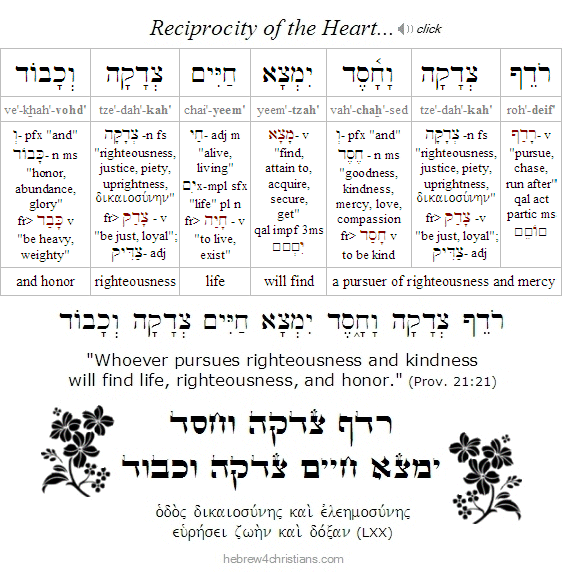 |
"Whoever pursues righteousness and kindness will find life, righteousness, and honor" (Prov. 21:21). Notice that the subject of this verse is a participle that comes from the verb radaf (רָדַף), which means to follow after, or to pursue, as in a chase or a hunt. This same verb is used when King David exclaimed, "surely goodness and love will pursue me (יִרְדְּפוּנִי) all the days of my life" (Psalm 23:6). King David understood that as he pursued God, so God's love would pursue him! In other words, as we seek, so we are sought by God; as we draw near to God, so He will draw near to us (James 4:8).
Notice further the repeated use of the word "righteousness" (i.e., tzedakah: צְדָקָה) in this verse. When we pursue God's righteousness, we will find it, and we will be declared righteous (i.e., tzaddik: צַדִּיק) and given life (i.e., chayim: חַיִּים) and honor (i.e., kavod: כָּבוֹד). "In the path of righteousness is life, and in its pathway there is no death" (Prov. 12:28). Therefore Yeshua calls us to "seek first the kingdom of God and His righteousness, and all these things will be added to you" (Matt 6:33).
The prophet expresses hope: "Let us know; let us press on to know the LORD; his going out is sure as the dawn; he will come to us as the showers, as the spring rains that water the earth" (Hos. 6:3). Salvation is "of the LORD." May God help us pursue him b'khol levavkha - with all our heart - because the He has promised, "You will seek me and find me, when you seek me with all your heart" (Jer. 29:13). Amen.
Return to Sanity...

09.12.23 (Elul 26, 5783) "Hear, O heavens, and give ear, O earth: for the LORD hath spoken, I have nourished and brought up children, and they have rebelled against me.... Ah, sinful nation, a people laden with iniquity, offspring of evildoers, children who deal corruptly! They have forsaken the LORD, they have despised the Holy One of Israel, they are utterly estranged. Why will you still be struck down? Why will you continue to rebel? The whole head is sick, and the whole heart faint. From the sole of the foot even to the head, there is no soundness in it, but bruises and sores and raw wounds... Your country lies desolate; your cities are burned with fire; in your very presence foreigners devour your land; it is desolate, as overthrown by foreigners...." (Isa. 1:2-7).
Jeremiah the prophet cried out on behalf of God: "Hear this, O foolish and senseless people, who have eyes, but see not, who have ears, but hear not. Do you not fear me? declares the LORD. Do you not tremble before me? Therefore "hear, O earth; behold, I am bringing disaster upon this people, the fruit of their devices, because they have not paid attention to my words; and as for my Torah, they have rejected it" (Jer. 5:21-25).
Repentance is a return to sanity which begins with the resolution to question your presuppositions and to change your thinking... There are three requirements for genuine repentance, that is, for turning to God in the truth, namely: 1) seeing eyes; 2) hearing ears; and 3) an understanding heart, ready to be healed (see Isa. 6:10). God alone does the miracle but it is nevertheless our responsibility to believe that the miracle is personally for us. Repentance is the first step of salvation, as Messiah said: "Repent and believe in the good news" (Mark 1:15), and apart from repentance man has no real existence. As Yeshua said, "Truly, truly, I say to you, unless one is born again he cannot see the kingdom of God" (John 3:3). Repentance is the expression of trust in God's love, and by means of it we affirm: "I am ready to exist as a person of worth." Come alive, friends!
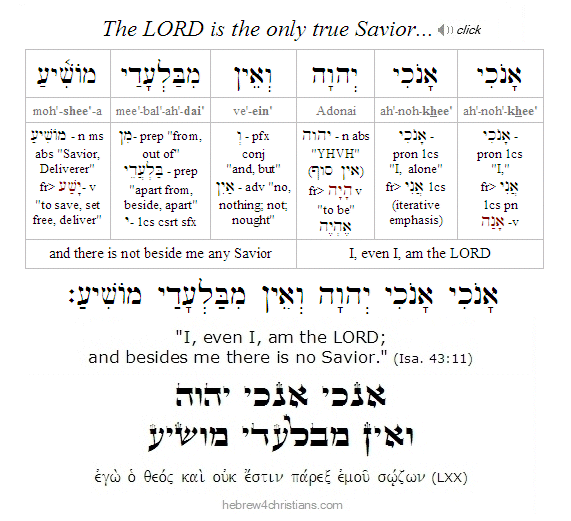 |
Torah for Rosh Hashanah...

[ The holiday of Rosh Hashanah (Teruah) begins Friday September 15th at sundown... ]
09.11.23 (Elul 25, 5783) Shalom Chaverim. The weekly Torah reading is suspended for Rosh Hashanah this year since the holiday falls on the Sabbath (the last time this happened was back in 2020). However we will read some passages in honor of the holiday: The Torah portion for the first day of Rosh Hashanah is about the birth of Isaac (Gen. 21:1-34), and the portion for the second day is on the Akedah, or the binding of Isaac (Gen. 22:1-22:24), both of which foreshadow Yeshua as the great Lamb of God. We also will take time to reflect on God's Kingship, the Day of Judgment of to come, and heed the call of the shofar to usher in the Messianic Kingdom at the end of days. As with all the Torah holidays, Rosh Hashanah (i.e., Yom Teruah) centers on Yeshua our Messiah, the Great Lamb of God and the true Judge over all. Shavuah tov, and happy holidays, friends.
The Prophetic Calendar...

09.11.23 (Elul 25, 5783) The spring festivals (i.e., Passover, Firstfruits, and Shavuot) have been perfectly fulfilled in the first coming of Yeshua as Mashiach ben Yosef, and the fall festivals (Teruah, Yom Kippur, and Sukkot) will be fulfilled in His second coming as Mashiach ben David. Since the first advent fulfilled all of the spring mo'edim to the smallest of details, we believe that His second advent portends similar fulfillment as revealed in the fall mo'edim.
After the summer of harvest (John 4:35), the very first fall festival on the Jewish calendar is Yom Teruah (יוֹם תְּרוּעָה), which is a picture of the "catching away" of kallat Mashiach (the Bride of Messiah) for the time of Sheva Berachot (the seven "days" of blessing that follows the traditional marriage ceremony). Then will come the Great Tribulation and Yom Adonai - the Day of the LORD (יוֹם יְהוָה). The heavenly shofar blasts heard at Sinai will be reissued from Zion. First will be the gathering together of those who follow the Messiah (i.e., those declared tzaddikim because they trust in the merit of Yeshua's sacrifice), and then God's war against Satan and the world system will begin, culminating in the long-awaited coronation of the King of King of Kings - Melech Malchei Ha-Melachim (מֶלֶךְ מַלְכֵי הַמְּלָכִים).
Rosh Hashanah (or better, Yom Teruah) is therefore a sacred time that has prophetic significance for the Messianic believer, since it commemorates both the creation of the mankind by Adonai as well as the "calling up" of the new creation at the behest of Yeshua, when the sound of the heavenly shofar inaugurates the anticipated End of Days (1 Cor. 15:51-54; 1 Thess. 4:15-18). Indeed, "teruah" (תְּרוּעָה) is a "calling up" signal for those who belong to Messiah, sounded during the opening of the "Gate to the Wedding" of the great Lamb of God. It also prefigures the coming Day of the LORD and Great Tribulation period that marks God's judgment on an unbelieving world...
In this connection note that Kierkegaard foresaw the apostasy of our age when he wrote: "A fire broke out backstage in a theater. The clown came out to warn the public; they thought it was a joke and applauded. He repeated it; the acclaim was even greater. .. that's just how the world will come to an end: to general applause from wits who believe it's a joke."
Hebrew Lesson
Psalm 104:19 reading (click for audio):
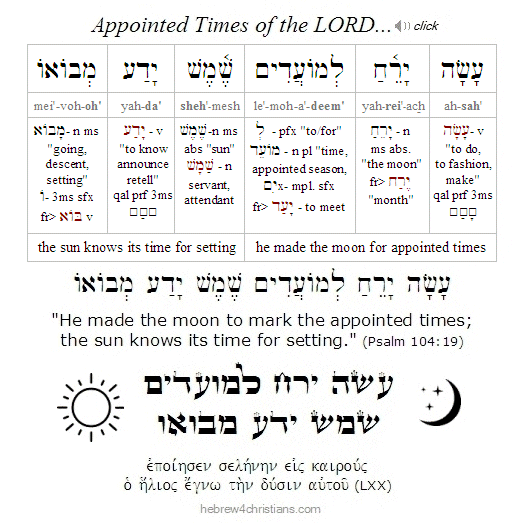 |
Note: For more on this fundamental topic, see "Introduction to the Jewish Calendar."
God will bring us home...
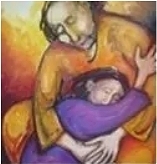
09.11.23 (Elul 25, 5783) In our Torah for this week (i.e., Nitzavim), we read: "The LORD your God will return as you return, and will have mercy upon you, turning to gather you back..." (Deut 30:3). This has both a present and prophetic application. First, in the present hour, if you turn to God, he will show you compassion, and he will "gather back" all those distant and fragmented parts of yourself into shalom and wholeness. He will restore your lost days; he will bring you out of exile and give you comfort in Yeshua. He makes all things new. "Draw near, therefore to God, and he will draw near to you" (James 4:8).
Second, the LORD will return to earth as the Jewish people return from their captivity, and he will restore Zion during the time of the final redemption. The LORD will turn captivity into mercy; he will turn in his compassion to his people. As it is written: "I will be found by you, declares the LORD... and I will bring you back..." (Jer. 29:14).
 |
The language of the Torah here is emphatic: "even if your exile is at the farthest edge of heaven (בִּקְצֵה הַשָּׁמָיִם), from there the LORD your God will gather you..." (Deut. 30:4). Note that this prophecy is written in the singular and therefore pertains to each individual exile. God will "gather you," that is, he bring you back to make you whole. Even if your exile (singular) is to the uttermost, the LORD will take you and deliver you, as it is written, "He is able to save to the uttermost (σῴζειν εἰς τὸ παντελὲς) those who draw near to God through him, since he always lives to make intercession for them" (Heb. 7:25). We are close to the end now, waiting for our Lord to come take us home, in whatever way he chooses.
As a child of God you are destined for unimaginable beauty and glory... "All things work together for your ultimate good"; there is a future and hope reserved for you. Nothing can thwart God's overmastering providence and purposes for your blessing in Yeshua our Lord. Amen, one day soon you will forget all your miseries and be engulfed in great joy!
Hebrew Lesson
Job 11:16 reading (click for audio):
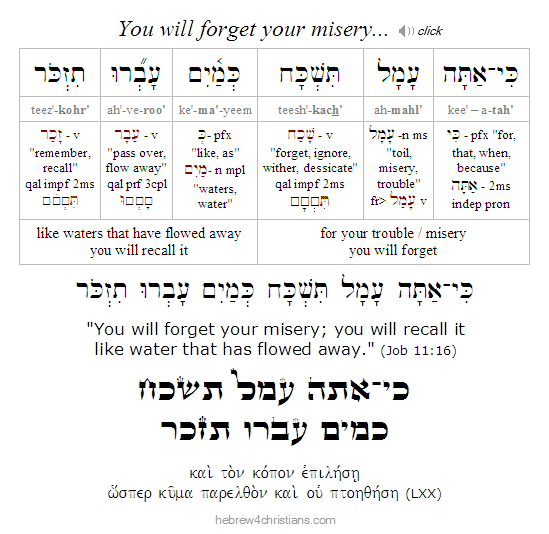 |
"Remember not the former things, nor consider the things of old. Behold, I am doing a new thing; now it springs forth, do you not perceive it?" (Isa. 43:18-19).
Fearing No Evil...
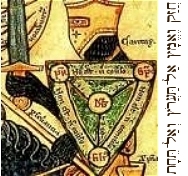
09.10.23 (Elul 24, 5783) The devil wants you to be afraid, to be very afraid, and indeed, inciting fear is the primary weapon he uses against us... The devil understands that fear profoundly affects the way the human brain processes images and messages: Fear colors the way we see and hear things. And since the mind and body are intricately interconnected, fear is the root cause of many physiological problems such as heart disease, high blood pressure, clinical depression, and other ailments. Left unchecked, fear can be deadly...
Most of our negative emotions come from fearful thoughts, including anger, frustration, and rage. On a spiritual level, fear and worry can cause people to question God's love, to doubt His promises, and so on. The devil knows that frightening people causes them to be unsettled, off-balance, and therefore vulnerable to all sorts of sickness, manipulation, and deception. Living in fear is a form of slavery (Heb. 2:15).
Logicians call illegitimate appeals to fear argumentum ad baculum, or the "appeal to the stick." When someone plays on your fears, it is wise to discern whether there is any basis in reality for the supposed threat, or if the appeal is simply a rhetorical scare tactic intended to persuade (coerce) you to accept some sort of conclusion. Unscrupulous people such as advertisers, politicians, dictators, community organizers, social activists, and so on, regularly use fear to manipulate public opinion, of course, and they are only too glad to tell you exactly what you should fear. They are delighted to prey upon your anxieties and then offer you their supposed "remedy." You know whom they serve, friends...
The war for truth began in the Garden of Eden, when Satan lied to Eve by saying that she would not die if she disobeyed God (Gen. 3:4). Satan cunningly played on Eve's fear of being deceived to persuade her to disobey. Fear, then, is the emotional center of sin and the opposite of faith. The fearful are referred to as the "unbelieving" and those who "love and make a lie" (Rev. 21:8, 22:15).
God repeatedly tells us not to be afraid – not of man, nor of war, nor of tribulation, nor of various plagues, yea, nor even of death itself (Rom. 8:35-39). Indeed, one of the most frequently occurring commandments in Scripture is simply al-tirah, "Be not afraid."
But how do we overcome our fear? How can we live our faith in the midst of a worldwide cultural slide into deception and insanity? How can we walk in peace while a worldwide tyranny is crafting a globalist police state wherein no one will be able to buy or sell if they are not wholly subservient to the dictates of an unseen power elite? How else but by wholeheartedly trusting that God is with us? The LORD will never leave nor forsake us, even if we are faced with difficult circumstances. The antidote to fear is heartfelt faith in God's love for us (1 John 4:18). God saves us from our fears (Psalm 34:4, 2 Tim. 1:7). When we trust that God personally cares for us, we find comfort and courage to face life without fear.
Hebrew Lesson
Psalm 23:4 Hebrew reading (click):
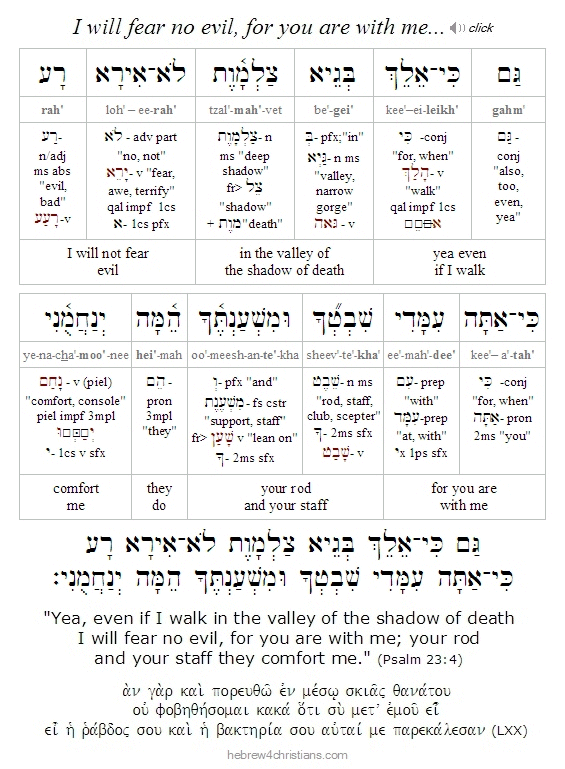 |
Rosh Hashanah Celebration...

09.10.23 (Elul 24, 5783) To prepare for a Rosh Hashanah home celebration, you will need a few basic things. Minimally you will need a couple holiday candles, a kiddush cup, some grape juice, challah (holiday bread), a few apples and honey, and a pomegranate... You will also need a shofar to sound at the end of the meal. For best results you should plan your meal, arrange your table, and decide which order things should go....
Steps for a home Rosh Hashanah Seder:
- Recite the blessing over the candles (usually 18 mins before sundown)
- Do kiddush over the wine/grape juice
- Recite the Shehecheyanu blessing
- Recite the Mo'edim blessing
- Recite the Hamotzi blessing over the (round) challah
- Recite the Shema (together, under a tallit)
- Recite Birkat Kohanim (blessing the children)
- Wish one another L'shanah tovah! Sing some holiday songs
- Sit at the table for the holiday meal
- Follow the simamin service (blessings over selected foods)
- Serve and eat the holiday meal together
- Recite Birkat Hamazon - giving thanks to God for the meal
- Recite blessings for the new year; taste apples and honey; pomegranate
- Recite the Shofar blessing and hear the shofar (at least 100 blasts for the evening)
- Tekiah [1 blast]
- Shevarim [3 wailing blasts]
- Teruah [at least 9 staccato blasts]
- Tekiah Gedolah [1 very long blast]
 Listen to the Shofar Listen to the Shofar
- Offer personal thanks to the LORD for the season...
We usually serve matzah ball soup or tzimmes, fresh salad, and a main course such as pomegranate chicken over rice with some green beans. During the holiday meal we also eat some "ceremonial foods" (i.e., simanim) and recite Hebrew blessings over these "first tastes" of the new year... For example we will eat a few almonds, some beets, a bite of fish, a nosh of star fruit, and of course apple and honey (tapu'ach udvash) for dessert. Please understand that you don't "have" to do any of this (though it is a blessing if it's done in the right spirit). If you are new to all this or feeling anxious, my heartfelt advice is to follow the path of peace - our Lord doesn't lay heavy burdens on us but lightness and grace... Shalom.
All these steps are listed in the free H4C Rosh Hashanah Seder Guide.
The Shepherd's Call...
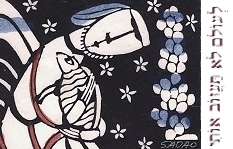
09.08.23 (Elul 22, 5783) "What do you think? If a man has a hundred sheep, and one of them has gone astray, does he not leave the ninety-nine on the mountains and go in search of the one that went astray? And if he finds it, truly, I say to you, he rejoices over it more than over the ninety-nine that never went astray" (Matt. 18:12-13).
Though it involves sorrow, and the pain of being lost, repentance is ultimately about finding joy, and when we return to God, we have reason to rejoice. The Good Shepherd says, "Rejoice with me, for I have found my sheep that was lost. Just so, I tell you, there will be more joy in heaven over one sinner who repents than over ninety-nine righteous persons who need no repentance" (Luke 15:6-7). Indeed, the Son of Man came to seek and to save the lost: "For thus says the Lord GOD: Behold, I myself will search for my sheep and I will seek them out... I myself will be the Shepherd of my sheep, and I myself will make them lie down, declares the Lord GOD. I will seek the lost, and I will bring back the banished, and I will bind up the injured, and I will strengthen the sick..." (Ezek. 34:11,15-16).
Amen and Shabbat Shalom, chaverim...
Hebrew Lesson
Ezekiel 34:11 reading (click for audio):
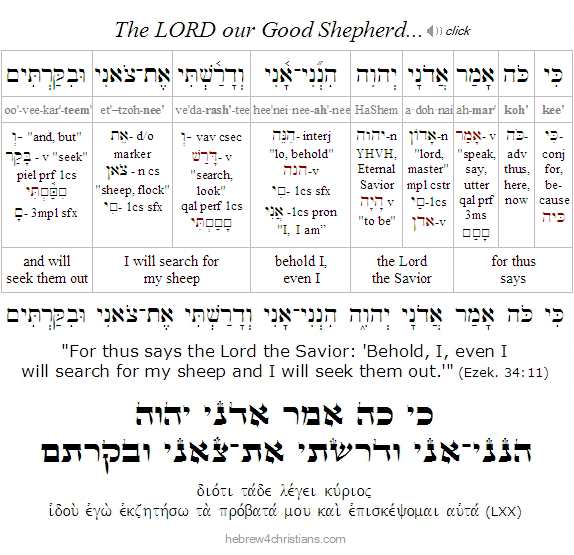 |
The Blessing of the Struggle...

[ Return to God in Yeshua... It is not judgment that breaks the heart, but mercy and love. ]
09.08.23 (Elul 22, 5783) Recently I mentioned that we are part of a seemingly endless journey of falling down and getting back up once again. It is this struggle, this "good fight of faith," that eventually ennobles the heart and establishes character... The hidden blessing of our repeated failure, then, is that we attain genuine humility as we rely on God for the miracle of deliverance. When we draw near to God in confession of our weakness, we may discover that our struggle disguises unacknowledged need within. For example, we might wrestle with lust, but this may come from refusing to trust others or from a sense of loneliness and sadness... "Hurt people hurt people," which means that often our sins come from a place of inner pain of abandonment. When we confess the truth we are enabled to draw close to God - the God of Truth - to discover his mercy. Those things you believe make you unlovable are the very means by which God manifests the glory of His compassion and love for you. It is not judgment that breaks the heart, but mercy and love.
This is why during the month of Elul and the High Holidays we recite prayers for forgiveness (i.e., selichot) in the plural, listing all the sins from "A" to "Z" that we (collectively) have committed. We use plural pronouns out of a sense of compassion... We are one body. When some part of the body is sick, the whole body is sick; when one of us sins, he hurts all the flock (1 Cor. 12:26). Therefore the traditional selichot prayer mentions all the possible sins in the order of the Hebrew alphabet: Ashamnu, "we have sinned," begins with the letter Aleph; Bagadnu, "we have been false," begins with Bet; Gazalnu, "we have robbed," begins with Gimmel, and so on... Just as Yeshua taught us, "Avinu She'bashamayim" - our Father, forgive us of our sins, so "all Israel is responsible one for another." "Compassion" means that others' sins and failures don't make them different from us, but rather more like ourselves. It is "feeling with" the heart for the sake of the other in empathy. As it is written: "Confess your faults one to another, and pray one for another, that you all may be healed" (James 5:16).
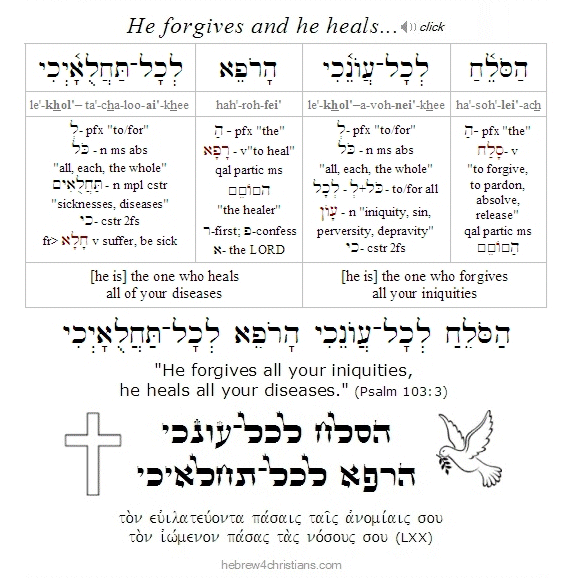 |
An Ever-Present Mercy...
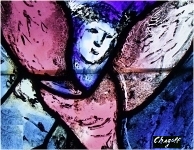
09.08.23 (Elul 22, 5783) Since Rosh Hashanah (יוֹם תְּרוּעָה) is known as the "Day of Judgment" (i.e., yom ha'din: יום הדין), it is customary to offer additional prayers of supplication (selichot) before the advent of the holiday. These prayers appeal to God's compassion and often include the recitation of "shelosh esrei middot rachamim," that is, the thirteen attributes of God's mercy (Exod. 34:6-7). The thirteen attributes reveal the inner meaning of God's Name YHVH (יהוה) disclosed to Moses after the people had committed the dreadful sin of the worshiping the golden calf (עגל זהב) at Sinai. God is not only our Judge and Lawgiver (Elohim), but our Savior and our Healer (Moshia). In his great mercy He restores what we have broken; He overcomes our judgment by means of his abounding love given to us in Yeshua (Psalm 85:10). We therefore appeal to YHVH as the Source of Compassion, the "breath of life" (נִשְׁמַת חַיִּים) imparted to Adam on the day he was first created (Gen. 2:7).
The Torah teaches that the Name of the LORD (יהוה) means both ehyeh (אֶהְיֶה) "Presence" and rachum ve'chanun (רַחוּם וְחַנּוּן), "Mercy and Grace" (Exod. 3:14; 34:6-7). Yeshua said, "I go to prepare a place for you," which means that his presence and love are waiting for you in whatever lies ahead (Rom. 8:35-39). We live and move and have our being in God's love. To worry is "practicing the absence" of God instead of practicing His Presence... Trust the word of the Holy Spirit: "For I know the plans I have for you, declares the LORD, plans for healing peace and not for evil, to give you a future and a hope (Jer. 29:11). Amen.
Hebrew Lesson
Exodus 34:6 reading (click for audio):
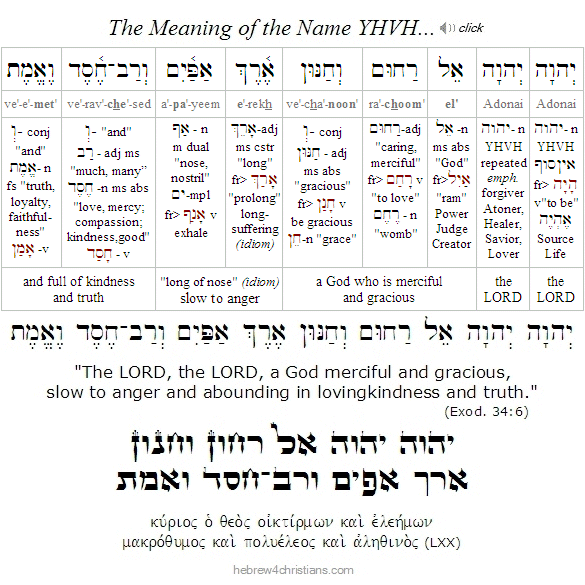 |
The End of Brokenness...
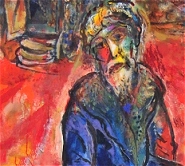
[ The following is related to the month of Elul and the "Season of Repentance"... ]
09.08.23 (Elul 22, 5783) Spirituality is lived now, in this world... "I do not ask that you take them out of the world, but that you keep them from the evil one" (John 17:15). We are "in but not of" the world; we are part yet also not part of it... This is the tension of living in the realm of the "already-not-yet." We are haunted by a sense of incompletion - a yearning for the fulfillment of our salvation, an inner ache that helps focus the heart's affections...
A paradox of the spiritual life is that we must descend to ascend... We all sin; we all fall short. First we must accept our own "dark side" -- our own sinful nature -- before we can ever come to know the light... This is the path of confession - acknowledging the truth about who we really are, which is the only way we can learn to "endure ourselves" and eventually let go of our shame. We find ourselves when we give up our defenses and take hold of God's compassion. We all have our sins; now we must find our courage in God's love.
כִּי־פְשָׁעַי אֲנִי אֵדָע
וְחַטָּאתִי נֶגְדִּי תָמִיד
kee-fe·shah·ai · a·nee · ei·dah
ve·chat·tah'·tee · neg·dee · tah·meed

"For I know my transgressions,
and my sin is ever before me"
(Psalm 51:3)
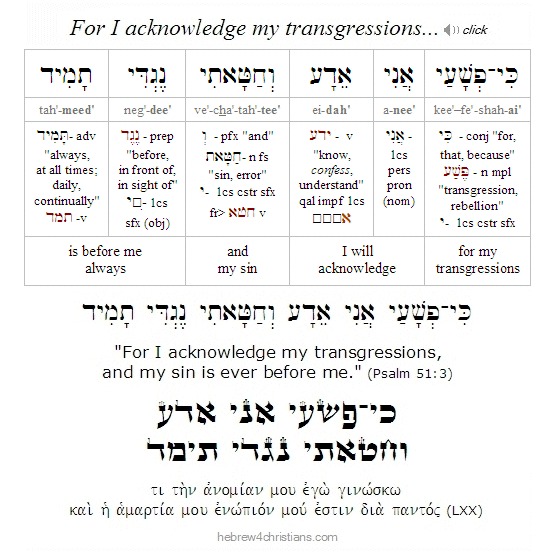
We must learn to "endure ourselves..." We can't deny who we are; we can't pretend to be what we are not. The root of shame is self-rejection. This is the hidden anguish of heart that leads many of us astray. As Henri Nouwen said, "There are two extremes to avoid: 1) being completely absorbed in your pain and 2) being distracted by so many things that you stay far away from the wound you want to heal." We don't come to the cross to destroy ourselves but to find deliverance and life: our brokenness is a means to this greater end. We "take up the cross daily," which means learning to forgive and endure ourselves... As theologian Paul Tillich once insightfully said: "The courage to be is the courage to accept oneself as accepted in spite of being unacceptable..." (Tillich).
In this age, we are part of a seemingly endless journey of falling down and getting back up once again. It is this struggle, this "good fight of faith," that eventually ennobles the heart and establishes character... In light of this, we must refuse to lose heart when things appear to be going badly, and likewise we must remain vigilant when things seems to be going well. The goal of the process is always to be in heartfelt, genuine, and earnest relationship with the LORD. As Madame Guyon once wrote, "You are born into the world like an illegitimate child who has no idea who his father is. But God comes and draws you out of your old life. He cleanses you and gives you back your innocence."
 |
Destiny of the Soul...
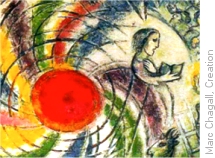
[ The following is related to the month of Elul and the "Season of Repentance"... ]
09.07.23 (Elul 21, 5783) The Scriptures define "man" as the creation of God, a union of body and soul, that is, a unity of physical and spiritual elements, as it is written: "Then the LORD God formed the man from the dust of the ground (adamah: אֲדָמָה) and breathed into his nostrils the breath of life (nishmat chayim: נִשְׁמַת חַיִּים), and the man became a living soul" (Gen. 2:7). The miracle of creation means that God imparted his own neshimah (נְשִׁימָה), his own "breath," to give life to the man, who was named "Adam."
Note then that man was made in two distinct stages. First the LORD "formed" (יָצַר) his body (גוּף) from the "dust of the earth" (עָפָר מִן־הָאֲדָמָה), and then the LORD breathed (נָפַח) into this body a "soul" (נֶפֶשׁ ,נְשָׁמָה), that is, the consciousness that represents the self or the "I" that inhabits the body. This is sometimes called the "image of God" (צלם אלוהים), the "I am" of self-consciousness, the ability to reason and to make decisions, to discern intuitions of logic, to apprehend moral and aesthetic reality, to wonder and glory over the the beauty and greatness of the Divine Presence, and so on. The image of God means that man reflects (analogically) God's very attributes and characteristics.
The Scriptures also refer to the soul of man as "ruach" (רוּחַ), generally meaning "breath" or wind (Psalm 78:39). The unity of the body and soul is called "nefesh chayah" (נֶפֶשׁ חַיָּה), a "living being." The body serves as a "habitation" for the soul as it lives in this world, and the separation of this unity, that is physical death, causes the body to return to the dust, though the soul continues to exist (Psalm 90:3; Eccl. 12:7).
According to "kabbalistic" (i.e., neoplatonic) interpretations of Judaism, the individual soul goes through distinct stages in its "journey" emanating from God and then returning back to God. The first stage is nebulous "preexistence," or the soul before it enters a body while being suspended in the "treasury of souls"(הָאוֹצָר); the second stage is physical life, when the soul "falls" into the body and where it is actuated, imprisoned and tested in human form. The soul then works to remove the barriers to spiritual life in this world, and upon death of the body is released to either to Paradise (heaven) or to Gehenna (hell), but finally, the soul will have a share in the "world to come" (olam haba) after the resurrection of the dead. In some forms of kabbalah the soul is reincarnated until it attains success in its mission that was given before it "fell" to the realm of this world (olam ha'zeh). The final vision of the world to come is unified into one world that is inhabited by God in all fullness.
It should be noted that such a kabbalistic vision is not biblical, though it includes some biblical truths.... Let's therefore review Scripture to get an understanding of the human soul and its ultimate end. So we begin at the beginning, where Torah clearly states that God created Adam as a union of body and soul. First Adam's body was formed from the dust of the earth, and then Adam's soul was imparted when God breathed it into his body (Gen. 2:7). Note that Adam's body apart from his soul is not alive, and it is only after the soul is imparted to the body that man is called "nefesh chayah," a living creature. So at the outset of creation God made Adam "for life" and worship in the paradise of Eden. That was the original ideal.
Death is first mentioned following the account of the creation of the man, when the LORD commanded Adam not to eat from the "tree of the knowledge of good and evil" (עֵץ הַדַּעַת טוֹב וָרָע): "And the LORD God commanded the man, saying, "Of every tree of the garden you may freely eat; but of the tree of the knowledge of good and evil you shall not eat, for in the day that you eat of it you shall surely die" (Gen. 2:16-17). In this connection we note that the Hebrew phrase that warns of the dreadful consequence of eating from the forbidden tree is "mot tamut" (מוֹת תָּמוּת), literally "in dying you will die," which both implies the spiritual nature of death as separation from the divine life, but also the repeated experience of death – the ongoing knowledge of decay, dissolution, and loss...
Though it is not explicitly stated in the narrative, it is implied that Adam would have understood the meaning of the commandment and would have had some idea of the implications of what death meant, even though he had never directly encountered death in his life before. Adam would understand death to mean the loss of life, and moreover that death was the penalty for transgressing God's will. When Adam later transgressed God's decree, God invoked the just penalty by saying: "You shall return to the earth, for out of it you were taken; for dust you are, and to dust you shall return" (Gen. 3:19). "Returning to dust" (אֶל־עָפָר תָּשׁוּב) implies the disintegration of Adam, the separation of his body from his soul. I will consider some of the spiritual implications of this shortly.
Contrary to the idea that death is a "natural" part of a larger "evolutionary narrative" that explains it as an inevitable (i.e., mechanistic) "mutation" of biochemical organisms, the Scriptures understand death as God's judgment upon sin, both in the individual sense of the "curse" of decay and the dissolution of the human body, but also in a cosmic sense of the dissolution of biological organisms and "heat death" of the very universe itself.
After Adam's original sin, human nature itself "fell" and was corrupted, and all of his subsequent descendants would inherit the curse of death, and therefore all subsequent generations of people would eventually die (Rom. 5:12). This furthermore meant that all people would be born in a state of spiritual alienation and under judgment (guilt) derived by virtue of Adam's "federal headship" as the original father of the human race. In addition, and as mentioned above, the curse of death extended to the creation itself, since Adam was created to exercise godly dominion as God's steward and mediator of the world (Gen. 1:26). Adam's transgression forfeited his divine right to rule creation, and his authority was usurped by the devil who had deceived him (Gen. 3:1-19).
So in the biblical sense, "death" (i.e., mavet: מָוֶת) is far more than just the cessation of physical life, that is, the dissolution of the body, but concerns the soul's relationship with God, and therefore it is rightly called spiritual death (מוות נַפשִׁי).
Spiritual death is a "mode" of existence that may appear "alive" but it is actually cut off, separated, and alienated from God. It is in fact a "similitude" of life - death disguised as life. The Apostle Paul calls this godless and carnal energy "the flesh" (Rom. 7:5, Rom. 8:6), though Jewish tradition has often referred to it as "yetzer ha'ra" (יֵצֶר הָרָה) the inclination to be selfish and evil (the word yetzer first appears in Genesis 6:5 where the wickedness of man is described as "every imagination of the thoughts of his heart (יֵצֶר מַחְשְׁבֹת לִבּוֹ) was only evil continually"). The wicked are dead while they 'live;' the righteous are alive while they 'die.' As strange as it may seem, people are born in a state of death, enslaved to their carnal nature, and "dead in sins" (Eph. 2:1; Col. 2:13; Psalm 51:5; Jer. 17:9). The underlying problem of death, therefore, is the curse of spiritual death (קִלִלַת הַמָּוות הַרוּחָנִי), for unless that is somehow remedied, there is no lasting hope, even if the physical body were to continue to live into perpetuity. And this is the message of the gospel itself, that God, in compassion for your soul, redeems you from the curse and delivers you from spiritual death by the sacrificial exchange of Yeshua on the cross for your life. "For God made him who knew no sin to be sin for you, that you might become the righteousness of God in Him" (2 Cor. 5:21).
But note that just as the death of the body does not mean the death of the soul, so the death of the soul does not mean the end of its existence... In relation to the soul, death is something spiritual and therefore concerns the immaterial nefesh, the "self," and its separation from the divine life. As I mentioned above, the nefesh is the "I am" of inner consciousness, but being a person necessarily involves relationship, a "dialog," and ultimately this dialog must transcend the individual to be grounded in relationship with God.
There are two relationships we can never escape and that are eternal: the relationship we have with ourselves, and the relationship we have with God. If we have healing and peace in our relationship with God, we have a happy sense of self that will be grounded in eternal reality, but if we are hostile and offended in our relationship with God, we will have a self locked within itself in endless inner dialog that will be unhappy and full of blame, anger, grumbling, and shame. This is the worst kind of death, called "eternal death" (מוות נִצְהִי) which is the sealed judgment upon those who have willfully chosen reject God's mercies by remaining spiritually dead during their allotted time on earth.
All this is devastatingly sobering. If a person physically dies in a state of alienation and rebellion against God, that is, if they refuse God's remedy for the sickness of their condition of spiritual death, then their soul will be consigned to Hades, a temporary "holding cell," until the final judgment that will be pronounced and enforced at the end of the world, at the Great White Throne, wherein they will then be resurrected to rejoin their souls with their bodies and then eternally separated from God forever and ever. Tragically, the only remnant of the soul that will be retained will be consciousness of the revelation of God's justice and judgment upon their sin forever and ever. The Apostle John calls this the "Second Death" (הַמָּוֶת הַשֵּׁנִי) in the "Lake of Fire" (Rev. 20:11-15).
On the other hand, those who do teshuvah (repent) and are regenerated by God will be given spiritual life (חַיֵּי עוֹלָם) imparted by the Holy Spirit (John 3:1-8). A "new nature" is created, a new heart (נֶפֶשׁ) and a new spirit (רוּחַ) is given (Ezek. 36:26). This is a matter of "ontological" change, not simply a matter of faith (2 Cor. 5:17). Just as physical birth resulted in being in the earthy realm, connected to Adam as our primordial father, so spiritual birth results in being in the heavenly realm, connected to Yeshua as our "Second Adam" and "Father of Eternity" (Isa. 9:6; 1 Cor. 15:45; Eph. 1:5). An intimate sense of God as "Abba" is implanted in the heart, and new desires - a hunger and thirst to know and walk in God's ways - begin to take root (Rom. 8:15; 1 Pet. 1:23). Although there will ongoing struggles with "the world, the flesh, and the devil," a real transformation from a life characterized by spiritual death to one of divine life and godly character will begin to be manifest. The "old self" (הָאָדָם הַיָּשָׁן) is crucified with Messiah and the carnal connection with Adam severed "so that we would no longer be enslaved to sin" (Rom. 6:6). Our connection to death will die; the power of sin will be radically broken, and we will experience freedom to do what is right in God's eyes (Eph. 2:5). "By his divine power, God has given us everything we need for living a godly life, through the knowledge of Him who called us by glory and goodness, by which have been given to us exceedingly great and precious powers (i.e., ἐπάγγελμα, the substance of what has been promised), that through these you may be partakers of the divine nature, having escaped the corruption that is in the world through lust" (2 Pet. 1:3-4).
Of course "salvation is of the LORD" (יְשׁוּעָתָה לַיהוָה), which means God is the Author and Finisher of our salvation, and we are powerless to generate new life in our souls. Indeed, the gospel speaks precisely to those who know they cannot save themselves. There are no "works of righteousness" that we may do, no rituals or special prayers that will unlock the blessings of true spiritual life: It is the miracle of God; it is the sovereign work of the Holy Spirit of God. Nevertheless, in this present age, physical death is inevitable and is a matter of God's decree (Heb. 9:27; Psalm 139:16). This is a result of living in a fallen world. The essential issue is what death means in light of salvation in Messiah. In the case of the unregenerated person, as we have seen, the separation of the body and the soul leads to the continuation of spiritual death, and ultimately to eternal death (Luke 16:19-31). In the case of the regenerated person, however, the separation of the body and the soul leads to the continuation of spiritual life and entry before the presence of God in paradise, and ultimately to life to heaven itself (John 5:24; 2 Cor. 5:8; Phil. 1:23).
We are given eternal life (חַיֵּי עוֹלָם) when we are regenerated by the Holy Spirit, and our regeneration is a present possession even as we live in this temporal realm (John 5:24). The life we are given in Messiah is a possession of the "inner man," that is, a new nature and spirit, and though the "outer man" may perish, the inner man is renewed day by day (2 Cor. 4:16). The Greek word used for "renewed" in this verse (ἀνακαινόω) means being transformed into something new, raised up from death into a new kind of life. We no longer know ourselves "after the flesh" (Gal. 2:20; 2 Cor. 5:16); there is a new principle at work, the "law of the Spirit of Life" that sets us from the "law of sin and death" (Rom. 8:2). Death has lost its power over us because Yeshua has overcome death on our behalf and will rescue us from its claim on our souls. But we have this treasure in "jars of clay," to show that the surpassing power belongs to God and not to us" (2 Cor. 4:7) Therefore, as Paul affirmed: "whether we live, we live unto the Lord; and whether we die, we die unto the Lord. Whether we live therefore or die, we are the Lord's (Rom. 14:8).
But why must we physically die, if Yeshua took upon himself the curse of death and died in our place? Because the spiritual life he imparts to us will be fully manifest upon our death, as we share in his resurrection power. Then, at the appointed time when we are reunited with our bodies at the time of the rapture, in a "twinkling of an eye," the people of God will be physically restored to serve in the Millennial Kingdom at the time of the Second Coming. For the believer, death will then be "swallowed up" into life forevermore. It should be noted that this restoration of the body is unlike the resurrection of the spiritually dead before the White Throne judgment at the end of the age.
Though the prospect of physical death is fearful, we have peace with God as we trust in his sovereign work to save our souls. Yeshua is the way, the truth, and the life: he has tasted death for us and overcome all its terrors (Rev. 1:8). He takes our place as our Scapegoat upon the cross, and our atonement from the penalty for our sins is thereby made eternally secure. In this life he quickens us with spiritual life and a new nature; as we live out our days he guides our way, and when we die, he will receive us into the presence of his glory. We will live and reign with him forever and ever to the glory and praise of the LORD our God. Amen.
Hebrew Lesson
Psalm 73:24 reading (click for audio):
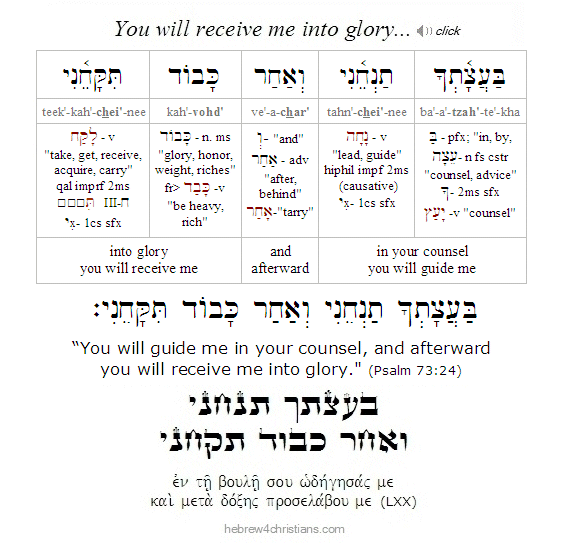 |
The Miracle of Teshuvah
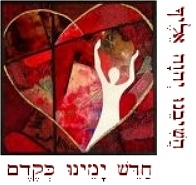
09.07.23 (Elul 21, 5783) Have you ever considered what the "self" really is? We tend to think of it, I suppose, as a conscious and emotional "center" of experience that is distinct from others and that has a sense of continuity through time and place. However, the self (or soul) has the ability to "transcend" itself, that is, to become conscious of itself, and this sets up an inner "dialog" within that enables the self to examine its own thinking, or to regard itself in relation to itself.... In this connection Soren Kierkegaard wrote of two types of "despair," by which he meant a condition of being wrongly related to your self. First, you can despair by rejecting (or denying) the self, and second, you can despair by elevating and exalting your self. In the first case the self is "lost" or abandoned by various forms of escapism; in the second case, the self is "idolized" and given god-like prerogative; in either case, however, the self is in despair because it is not grounded in the truth of reality, since there can be no true "self" apart from relationship with God who is the ground of all being...
This is connected with the task of cheshbon ha'nefesh (חֶשְׁבּוֹן הַנֶּפֶשׁ), or taking account of ourselves to do teshuvah (i.e., repent). Note that Kierkegaard understood the experience of the "self" as a conscious "synthesis" of the infinite/finite, the temporal/eternal, and freedom/necessity, all in relationship to God, who is the Source and End of self-conscious life. We will exist in a state of "despair" when we attempt to deny any one of these paradoxes and thereby choose to understand ourselves apart from relationship with God. We all stand at the "crossroads" of the eternal and the temporal, and we can only know ourselves for what we are when we surrender to God for each irrepeatable choice of our lives. Because of this, teshuvah (or "repentance") is an ongoing activity of the heart - the "daily bread" and sustenance in the way of becoming whole before God.
In your fight against evil, it is important not to become evil yourself, or as Nietsche once sardonically said, "Whoever fights monsters should see to it that in the process he does not become a monster. And if you gaze long enough into an abyss, the abyss will gaze back into you." Applied inwardly this means that we are careful not to hate ourselves in the battle we have with our sin. We can escape the "shame-pride" cycle when we turn away from ourselves by knowing ourselves only in relationship with the Lord who loves and gave himself for newness of life. We turn away from the hell of our past mistakes and turn to God who is our only remedy from death. When we know ourselves only through God's love in Yeshua, we find ourselves as beloved in relation to Him.
Any idea of the "self" apart from God is a dead-end (Prov. 14:12). Indeed, if we find the courage to honestly look within we soon discover that we are filled with violent desires and are loveless at heart: "For out of the heart comes evil..." (Mark 7:21; Jer. 17:9). The essence of Torah is to love, to "do good and no evil," but we are inherently selfish, judgmental of others, calloused, and proud. So how can we do the impossible?
There is a persistent temptation to regard our inability to love as the result of something other than our own inner perversity, or what the Bible calls "spiritual death." If we are not careful, we will pray that the Lord will show mercy and compassion on that which is to crucified, buried, and taken away. God does not reform our carnal nature but puts it on the cross to be done away, and then he replaces it with a radically new nature based on the Spirit and resurrection life... This great miracle of God is found in union with the Messiah's life. "Live in me and I will live in you," Yeshua says, "as the branch cannot bear fruit by itself, unless it finds life in the vine, neither can you, unless you find life in me; for apart from me you can do nothing" (John 15:4-5). You cannot do the impossible, but with God all things are possible (Mark 10:27; Phil. 4:13).
Therefore the ability to love comes by the miracle of God (Ezek. 36:26; 1 John 4:19). As we live in Yeshua, we find life, love, light, truth, and salvation from the hell of a loveless heart. Unite yourself with his death, burial, and resurrection; reckon yourself to be immersed into him, death-for-death, life-for-life (Rom. 6:8-11; Col. 3:1-4). "Unless a seed of wheat falls to the ground and dies, it abides alone..." (John 12:24). Yeshua is the source of all life, and we find nourishment, strength, and fullness of joy as we connect with him.
By faith therefore affirm: "I have been crucified with Messiah, and it is no longer 'I' who live, but Messiah who lives in me" (Gal. 2:20). There is a new "I" that comes from above, known only in spiritual relationship with the Savior. The miracle of the exchanged life comes as we surrender to the truth of what God has done for us (2 Cor. 5:17). That's the essence of the gospel, "the power of God for salvation to all who believe" (Rom. 1:16). Therefore we do not attempt to crucify ourselves, or labor to reform our lower nature, but we instead accept that we already have been crucified by the mercy and power of God. We clothe ourselves in the robes of his righteousness as we celebrate God's redeeming love for our lives. Only then are we empowered by the Spirit to truly "love the LORD and keep his charge"; and only then will we have a true self... Amen.
Hebrew Lesson
Psalm 139:23-24 reading (click for audio):
A Closing Thought...
Though we are given a new heart at the time of our regeneration, we are still saddled with the sinful lower nature, and that explains why we are instructed to become sanctified by "putting on" our spiritual self and "putting off" the carnal one (see Gal. 3:27; Eph. 4:24; Col. 3:10; 1 Thess. 4:3; etc.). We are to "mortify" (put to death) the sinful nature by faith in the power and provision of God (Col. 3:5; Rom. 8:13) As it is written: "The night is far gone; the day is at hand. So then let us cast off the works of darkness and put on the armor of light. Let us walk properly as in the daytime, not in orgies and drunkenness, not in sexual immorality and sensuality, not in quarreling and jealousy. But put on the Lord Yeshua the Messiah, and make no provision for the flesh, to gratify its desires" (Rom. 13:12-14).
Though followers of Yeshua are made into a "new creation" and all things are "made new" (2 Cor. 5:17) we nevertheless must practice our spirituality by being "renewed in the spirit of the mind" and by consciously choosing to "walk in the Spirit" (Eph. 4:23-24; Gal. 5:16). Therefore go forward in faith; do not focus on your failures but on His victory secured on your behalf. We all struggle with sin in our lives, but the difference for some is that they are called by God and are chosen to know him despite the common failings of the fallen human condition. Count yourself among those who must "fight the good fight of faith," and above all else, never let go of your hope in God's passion and love for you.
Shalom v'kol tuv chaverim....
 |
The Ultimate Question...
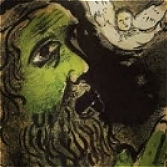
09.06.23 (Elul 20, 5783) "Choose life that you may live.. " (Deut. 30:19). The most significant question God asks is whether you want to live or not. Albert Camus wrote, "There is but one truly serious philosophical problem, and that is suicide. Judging whether life is or is not worth living amounts to answering the fundamental question of philosophy" (Myth of Sisyphus, 1942). Camus' comment is not at all original, indeed, this is the ultimate question of Jesus as well. Do you want to live? Will you believe? Will you choose life and turn away from self-destruction? The Spirit of the LORD calls out: "Choose life that you may live..."
Hebrew Message
Deut. 30:19b on choosing life (click):
|














































